2023年秋季
香港中文大學性別研究課程、性別研究中心合辦
4 Oct 2023 (Wed) Exploring the role of trauma in underpinning sexualised drug use (‘chemsex’) among gay, bisexual and other men who have sex with men in Singapore
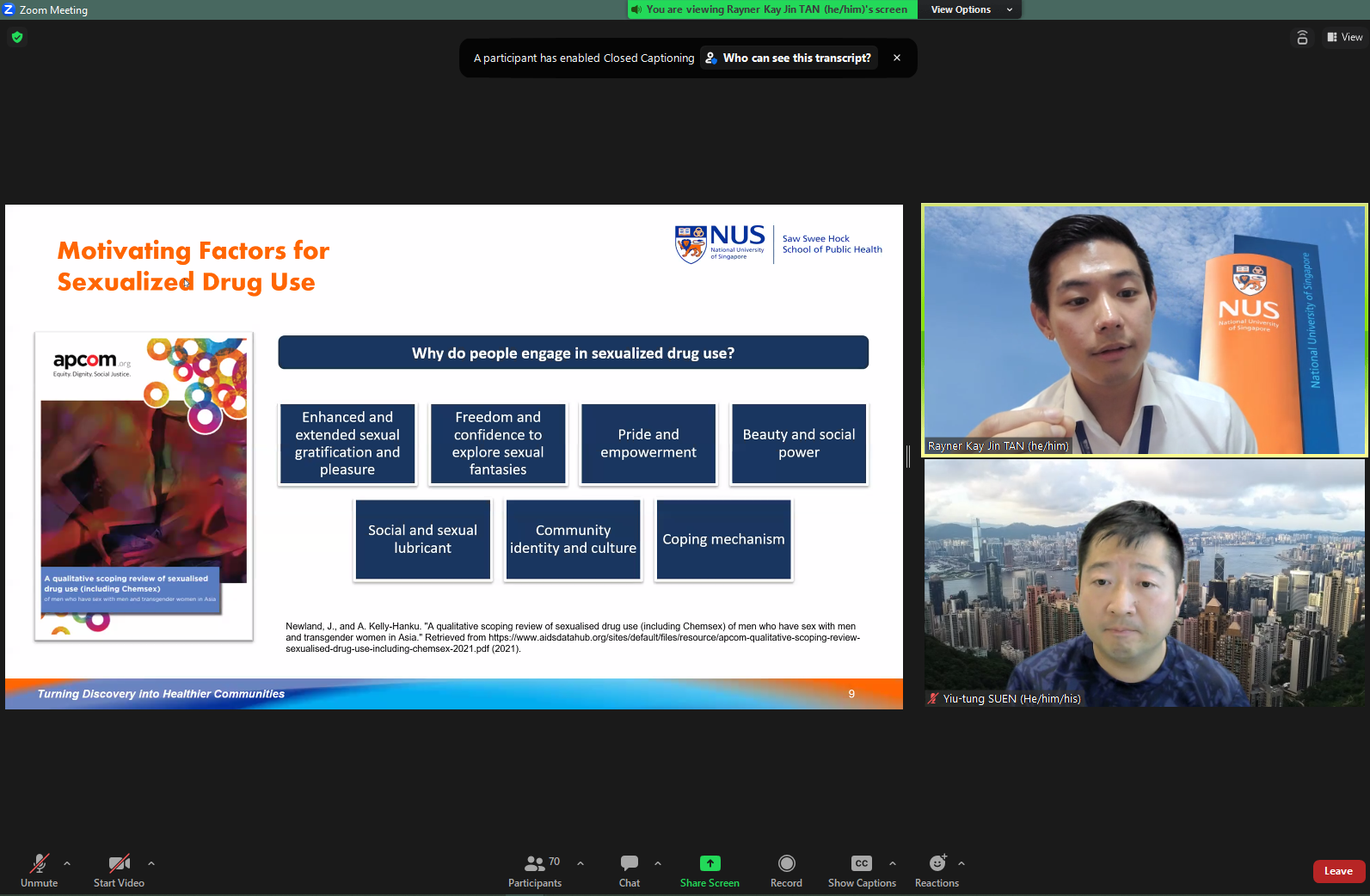 |
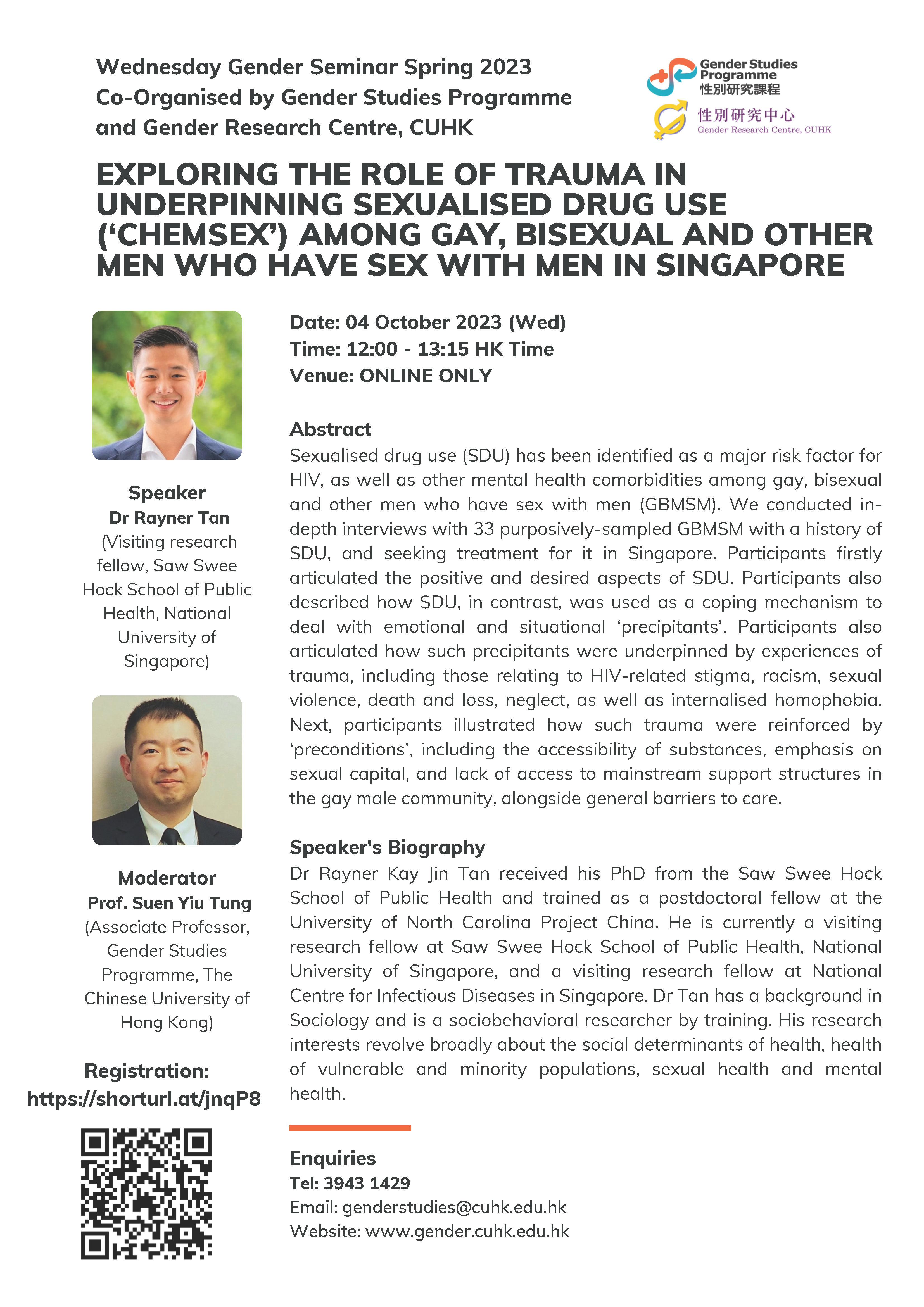 |
 |
“Chemsex”, related to but distinct from broader sexualized drug use, generally refers to use of psychoactive substances within sexual contexts. With growing research indicating its prevalence in gender and sexual minority populations and its associations with HIV, STIs and mental health comorbidities, it is considered to be an urgent public health and health equity issue. Primarily drawing from his recent qualitative study examining “chemsex” engagement amongst gay, bisexual and other men who have sex with men (GBMSM) in Singapore, Dr. Tan’s talk centered around the multidimensional antecedents underlying this phenomenon.
Under an interpretivist epistemological orientation, the qualitative study employed positionality/reflexivity-informed semi-structured interviews with a purposive sample of 33 self-identified GBMSM in Singapore followed by inductive thematic analysis. The interview process inquired into participants’ life histories and “chemsex”-related experiences, and participant welfare was ensured through methodological incorporation of anonymity protecting mechanisms coordinated by community-based organizations and the National University of Singapore. Interview results suggested several factors driving GBMSM’s chemsex engagement, including: 1) positive, desired aspects of “chemsex” (e.g., connectedness, sexual enhancement), 2) “chemsex” as a mechanism to cope with varied precipitants (e.g., sexual shame, low self-esteem), 3) traumatic underpinnings of such precipitants (e.g., intracommunity racism, societal-level homophobia), and 4) trauma-reinforcing preconditions of “chemsex” (e.g., sexual capital emphasis, lack of mainstream or institutional support structures). From such results, a trauma-informed, socio-ecological framework to conceptualize “chemsex” was proposed.
Dr. Tan’s talk ultimately provides novel, nuanced sociopolitical insights into “chemsex”, as well as challenges biomedical and pathologizing understandings of “chemsex” which characterize some extent of past literature and predominate popular discourse. Significant practical implications for community and healthcare settings may also be inferred, particularly the development of person-centered, multi-pronged harm prevention and reduction strategies to counter problematic forms of “chemsex”, especially in vulnerable minority populations.
撰文:LEUNG, Sinyu
Dr. Rayner TAN shared his recent work on what drives for underpinning sexualized drug use in the gay, bisexual and other men who have sex with men (GBMSM) community in Singapore, with a special focus on the role of trauma. Sexualized drug use, also termed as ‘chemsex’, generally refers to the use of psychoactive substances for sexual reasons. This study conducted semi-structured in-depth interviews with 33 GBMSM participants and used thematic analysis to analyze the interviews. The interview topics revolve on life history, trauma, HIV status, chemsex, barriers to accessing drug use recovery services, and incarceration.
As a result, a trauma-informed framework was conceptualized to describe the factors driven for sexualized drug use from psychological, societal, and structural levels. Firstly, for the positive and desired aspects of chemsex, participants stated that they experienced positive emotional states, sexual enhancement, love and intimacy. Secondly, participants explained their precipitants to chemsex. They regarded chemsex as a coping strategy to address individual and interpersonal stress (e.g., emotional wounds, loneliness, sexual shame, and social connections) and external stress related to work, finance, and family. Thirdly, participants pointed out the significant role of trauma in sexualized drug use, which came from HIV-related stigma, racism, homophobia, religious trauma, neglect, sexual violence, death and loss. Lastly, the societal and structural context resulted in preconditions that reinforced participants to engage in chemsex. The drug used for sex is easy to access, and the environment accepts chemsex as a norm. Besides, there is limited formal support for the GBMSM community such as LGBTQ friendly aftercare, family support, and legal support. On the other hand, participants also reported that the inadequate available help, stigma about drug use, and fear of being reported impeded their motivation seeking for caring support.
Overall, the research investigated sexualized drug use from the lens of coping strategies to trauma. It showed that the GBMSM community reinforced the experiences of sexualized drug use to cope with trauma and other societal factors but were also precluded from getting formal support due to those unfriendly preconditions. Even though chemsex may not cause problematic addiction and health issues to everyone, more inclusive interventions are needed for the GBMSM community to receive drug use treatment care and support.
撰文:LI, Ang
This lecture aims to explore the role of trauma in underpinning sexualised drug use ('Chemsex') among gay, bisexual and other men who have sex with men in Singapore. The speaker is divided into five parts to illustrate this topic: Introduction: Sexualized Substance Use or ‘Chemsex’, Preliminary Work on Sexualized Substance Use, ‘chasing utopias’: methods, Findings and Discussion.
First of all, in the introduction, the controversy caused by Chemsex as a public health issue was introduced. Then the speaker listed the related data of ‘Sexualized Drug Use in Key Populations’ and the motivation factors leading to this phenomenon. He then shifts his perspective to explore the underlying logic behind ‘The Rush To Risk’. What surprised me in this part is that the data and proportion of the use of sexualized drug exceeded my expectation, and the reasons behind it mentioned that the use of drugs does not necessarily have side effects, and drugs can also play a spiritual auxiliary effect in addition to physiological effects in sexual behavior.
Secondly, in the Preliminary Work, the speaker set Rationale and Objectives, and referred to previous works on Chemsex for research design and implementation. The survey covered Chemsex measures, Class differences, Social Capital and more.
Thirdly, the research method part states four aspects: Study Design & Participants, Date Generation, Topic Guide, Positionality & Reflexivity. The date generation mentioned the design principles and some details of the interview. First, in-depth interviews can be conducted on the basis of ensuring that the human rights of the interviewees are not infringed. Second, the interview can be conducted on the premise that the interviewer and interviewees do not know each other, so that the interview content can be as free from the influence of subjective consciousness as possible. In other words, if the two know each other, the interviewer will have preconceived ideas and affect the thinking and judgment of this research topic.
Next, the speaker summarized the key findings: First, positive and desired Chemsex can bring a sense of peace, sexual enhancement, love and intimacy. Second, precipitants, from the perspective of individual and interpersonal, have emotional wounds, loneliness, sexual shame and social connections; From the perspective of external factors, it is mainly caused by work-related stress, financial and family-related stress. Third, Different types of trauma caused by Intracommunity, general society and discrete incidents, namely HIV-related stigma and racism; homophobia, religious trauma, neglect; sexual violence, death and loss. Fourth, is four Preconditions: 1. Normative aspects: Ease of access, Chemsex as a norm; 2. Sexual capital: Sexual attractiveness as self-worth, Lack of safe spaces; 3. Lack of formal support: No LGBTQ-friendly aftercare, Lack of family support, Lack of legal support; 4. Barriers to care: Perceived lack of available help, Stigma around drug use, Fear of being reported.
Finally, there is the discussion section. the speaker believes that Data generated reflects just this slice of lived experiences and world views. At the same time, three aspects of Person-centred harm reduction interventions are proposed: 1. Sexualized drug use journey; 2. Engagement in sexualized drug use; 3. Personal Life Course.
撰文:LI, Yushan
The theme of the seminar this week is ‘exploring the role of trauma in underpinning sexualized drug use (‘chemsex’) among gay, bisexual and other men who have sex with men in Singapore’. First of all, Dr Tan shared the definition of sexualized drug use, which means the use of psychoactive substances for the purpose of having sex or in sexual contexts, and the key population of sexualized drug users are gay and transgender women. Then Dr Tan introduced the motivating factors of for sexualized drug use, including enhanced and extended sexual gratification and pleasure, freedom and confidence to explore sexual fantasies, pride and empowerment and so on. In order to best understand the risk of sexualized drug use, Dr Tan suggested us to acknowledge non-problematic use, simultaneously reframing the role of drugs in sexual behaviors and moving beyond biomedical forms of understanding, while he also introduced some research from different viewpoints and cite the relevant studies in Singapore, importantly including the modified socio-ecological framework of factors driving chemsex among GBMSM. Based on presentation upon, Dr Tan shared his study design and method, through purposive and theoretical saturation guided sampling 33 participants were recruited into the research and carried out on the basis of interpretivist epistemological orientation. The findings of this study mentioned four aspects: positive and desired chemsex (participants articulated desired and positive aspects of chemsex), precipitants (individual and interpersonal reasons including emotional wounds, loneliness, sexual shame etc.), trauma (in intracommunity, general society and discrete incidents), preconditions (normative aspects, sexual capital, lack of formal support, barrier to care etc.). After all, Dr Tan concluded the findings of the study, although the generated data only reflects slice of lived experiences and world views, the chemsex journey and its harm and reduction still make a sense to the various realms of homosexual research.
撰文:LI, Zhixin
On 4th Oct 2023, Wednesday Gender Seminar invited Dr Rayner Tan to share his research on the role of trauma in underpinning sexualised drug use (‘chemsex’) among gay, bisexual and other men who have sex with men (GBMSM) in Singapore.
Although “chemsex” as a public health issue has been widely studied in public health scholarship, there is a tendency to oversimply frame and label sexual drug use as pathological or risky, which conflates various problems and may further generate and reinforce stigmatization of sexual minorities. Dr Tan, thus, emphasized the need to acknowledge multiple motivations and move beyond biomedical forms of understanding. He shifted the research focus to the structural and social context of SDU to better understand causes and debunk problematic narratives. In his study, “trauma” was a strong and recurrent theme underpinning informants’ reports, which is understudied in the existing literature.
Dr Tan’s qualitative study adopted semi-structured in-depth interviews with 33 participants who were self-identified GNMSM and seeking treatment in Singapore. Interview topics included participants’ experiences and life histories of SDU, substance use, incarceration, trauma, and recovery stories. In reports, desired and positive aspects were articulated, such as peace, intimacy, and sexual enhancement. They took chemsex to cope with ‘precipitants’, a term referring to emotions and situations like negative individual and interpersonal issues and stressful external factors like family-related stress. Participants further pointed out how trauma experience provided context for ‘precipitants’ and underpinned them. Such trauma included three significant types: intracommunity, including HIV-related stigma and racism; general society, including internalization of homophobia and discrete incidents. Importantly, these traumas were related to 4 kinds of ‘preconditions’, including the accessibility of substances, sexual capital, lack of formal support and barriers to care, which also, in turn, motivate engagement in chemsex.
Grounded in sexualized drug users’ life stories, Dr Tan’s trauma framework offers a refreshing perspective to understand how social and structural factors produce and reinforce SDU and suggests the necessity to address individual trauma and structural problems when intervention.
撰文:LIU, Danchen
27 Sep 2023 (Wed) Gender Pattern in Livelihood Choices and Economic Consequences for Rural Households in China
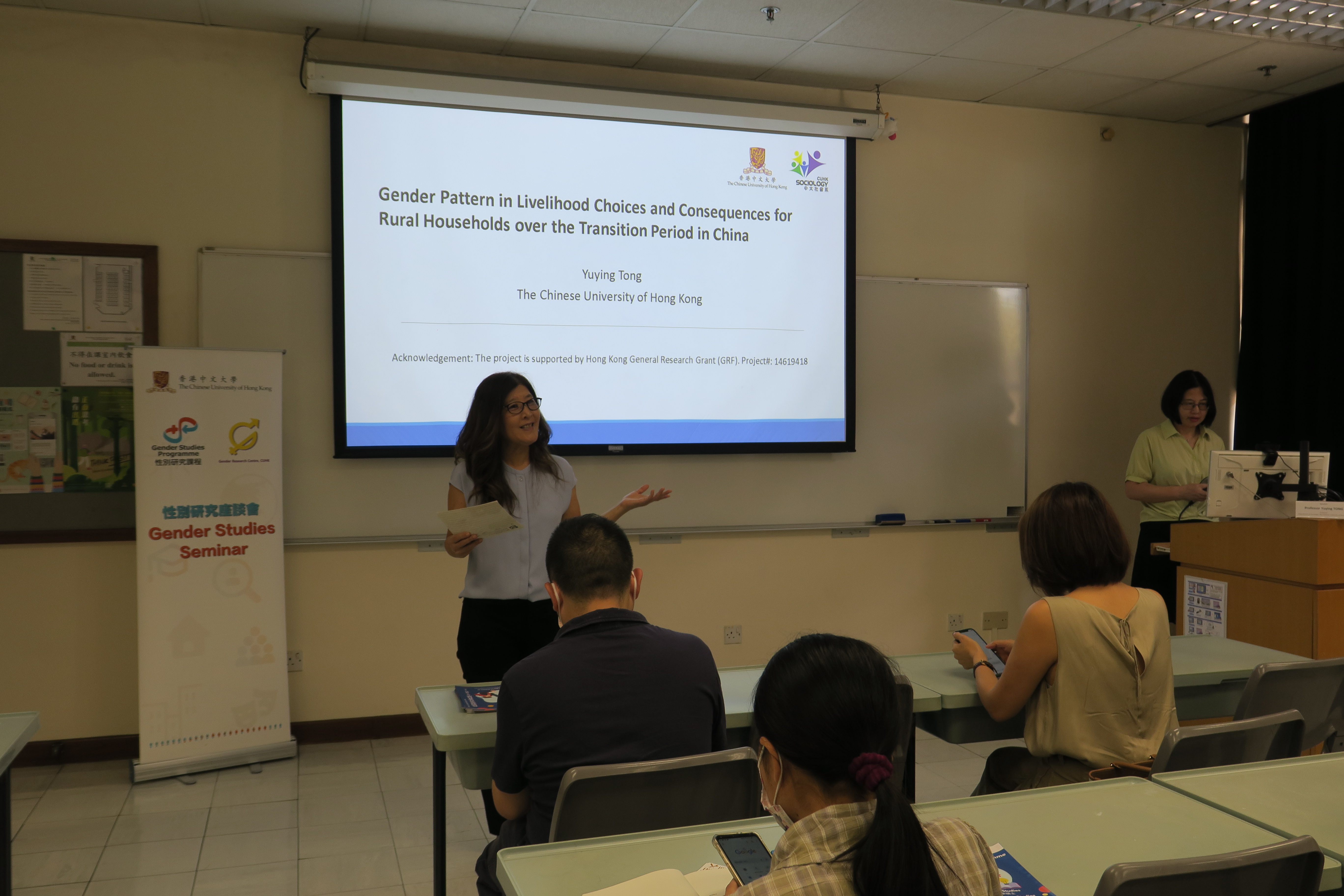 |
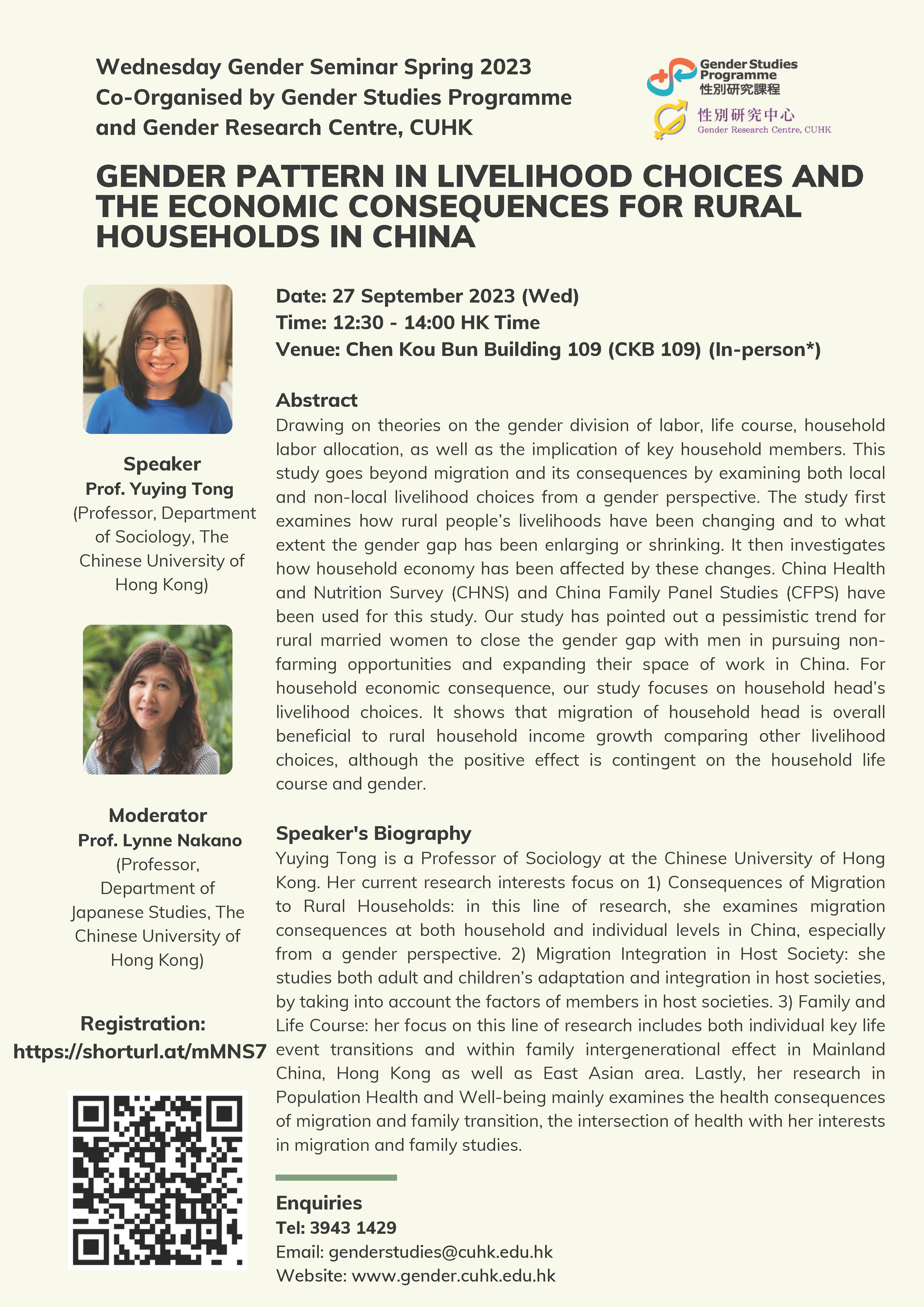 |
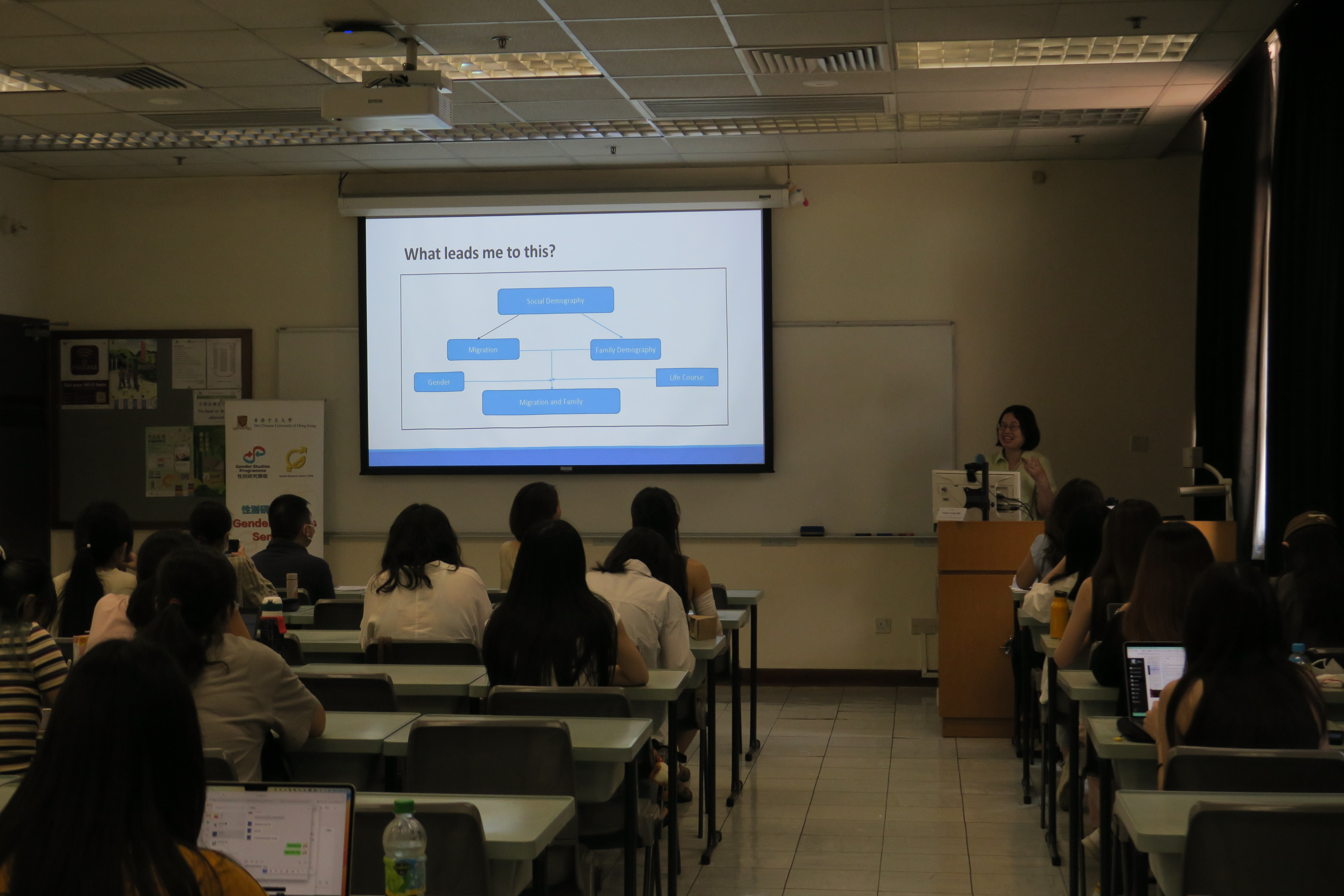 |
Under the liberation theory, women got out of house and work just like men and argued that “women substituted for men and freed men to undertake more new projects. Later, collectivization during the 1950s dismantled the house as a production unit but facilitated women’s participation in agricultural work. However, women still received lower work points although they did the same work as men. The economic reform launched in the late 1970s led to agricultural decollectivization and made the household once again the basic unit of production and in early reform era, the main strategy is to pursue local non-farm work for diversity such as township enterprises. So women take up more responsibilities in farming and also do some sideline work during off-farm seasons. After mid-1990s, migration to other places has become more dominant compared to local non-farm opportunities.
Under some theoretical background, we can hypothesize that:
· Compared to women, men are more likely to engage in non-farm work.
· By renegotiated gender role and with more opportunities, over time there will be a convergence of men and women in non-farm labor force participation.
· Marriage may set a constraint for rural woman and the extent of it has reduced over time.
· Women are more likely to pursue jobs in cities where there are more gender equal opportunities but the gap is reducing over the time.
The study find that although the gap between unmarried men and women has closed over time, there is no sign that the gap between married is closing. Women, in particular married women, are behind men in expanding both local and distant non-farm livelihood choices.
This reminds me of the topic of whether the active choice of a housewife is considered a woman's freedom, which was much debated in mainland China before. I think we can discuss that being a housewife is a choice, but should not forget that society still doesn't have a reasonably positive perception of the unpaid labor of housewives. We need to see the unresolved problems underneath this structural oppression and left behind by the patriarchal tradition. Women are facing many social problems.
撰文:GUO, Yijia
In the past few decades, with the rapid growth of rural areas and the increasing disassociation between livelihood and agriculture, rural people seemed to have more searches on their livelihood choices. During historical periods such as the “Great Leap Forward” and the Economic Reform periods, people began to focus on women’s agricultural work capability. Instead of aligning with the traditional communal gender role expectations, women were encouraged to leave their houses and work just like men. However, women were considered “substituting for men” or getting lower work points despite doing the same work as men.
Based on this background, the speaker introduced two studies to discuss the gender pattern in livelihood choices and consequences for rural households over the transition period in China. In the first study, researchers examined whether the gender gap and female disadvantages in livelihood choices have changed by analyzing data from the China Health Nutrition Survey. The sample were rural people aged between 18 to 54 years old. Results found that more rural people participated in non-farm work over time. Marital status constrained both men and women to take on non-farm jobs. Furthermore, though unmarried people did not show significant gender differences in their livelihood strategies, married women were less likely to choose non-farm jobs than married men, and this gap seemed not to be narrowed over time.
In the second study, researchers considered the key household members and compared female and male heads’ livelihood choices. They analyzed the data from The China Family Panel Studies and their sample was married rural people aged 20-65. According to their results, more people chose distant non-farm work over time. People were more likely to take on distant non-farm jobs when their household heads were young, especially when they were women. This livelihood choice from the household head was a strong predictor of household income growth. These results implicated that the livelihood choices of rural people are gendered and the family status may predict and affect rural people’s livelihood choices and consequences.
撰文:HE, Chuting
The theme of the second week's seminar was “Gender pattern in livelihood choices and consequences for rural households over the transition period in China", which was shared by Prof. Yuying Tong. She recounted two separate but connected studies under this project.
The first study focused on "the expanding search for work: gender gap in rural Chinese people's livelihood changes from 1989 to 2015". In the past few decades, rural areas around the world have experienced rapid growth in the diversification of rural household livelihood strategies. In China, the diversification process was accompanied by some important historical periods. Against this background, three research questions were posed to explore what are the gaps in livelihood choices between men and women. The hypotheses were analyzed by using data and samples from the China Health Nutrition Survey, identifying variables and incorporating APC models. Three conclusions were deduced as follows. First, men are more likely to work in non-farm positions and the gender gap shows little sign of convergence. Second, the gap between unmarried men and women is narrowing but for married women, the closing trend is somewhat handicapped. Third, women are behind men in expanding both local and distant non-farm livelihood choices.
The second study was a continuation of the first, which focused on key family members. The topic was “Female vs. men head's livelihood choices and household income growth in rural China from 2010 to 2018". The debate has been continuing for decades on whether migration as a livelihood choice is beneficial to rural household economic development. From the family life course perspective, the study used family as the unit of analysis and the household head’s age represented the household life course stage. The conclusions were drawn by utilizing data from the China Family Panel Studies (2010-2018) with Growth Curve models. The results showed that the livelihood choice of the household head is a strong indicator of household income growth in terms of both intercept and slope. At the same time, the migration of the household head generally favored the growth of rural household income.
撰文:HU, Bei
At the beginning, the author briefly introduced her social demography backgroud and the inflence of gendered life course, which finally led her to the subject of migration and family.
The first research is about the gender division of labor and industrial changes in rural areas of China. In the process of upgrading the industry, the separation of agricultural jobs and non-farm jobs, and the separation of places of residence and work are two major trends around the world. Gender role specialization and renegotiation have provided a theoretical basis for those phenomena. This study uses a sample of the labor force in rural areas in recent decades, using agricultural labor and non-agricultural labor as the benchmark, to examine women's disadvantaged status in job opportunities, the convergence of the gender gap, and the impact of marital status on it. Empirical results show that men are indeed more likely to obtain non-agricultural job opportunities, and the gender gap never decreases. Additionally, marriage is proved to be an obstacle for women to purse their own career freely, which forms a stark contrast to male partners both in local and distance non-agricultural jobs. Trends for gender equality at work in rural areas remain bleak, in consequence of which private and public support should be provided to rural women, especially those who are married and have children.
The second research focus on the migration of rural household heads. Although the dual impact of migration on household economic status has often been discussed, local non-farm labor force is largely neglected, as well as their livelihood chioces and outcomes. This research concentrates on non-migrants and adopts a ‘house life course’ perspective, in order to study livelihood chioces and income growth trajectory. It turns out that the household heads’ livelihood chioces can strongly predict household income, and the migration of them is economically beneficial; However, such effect is contingent on their life course--it becomes very different between farming group and non-farming group, which means that we are supposed to separate these two groups when studying left-behind villagers.
撰文:JIANG, Yufei
The topic of the lecture on September 27th is Gender Pattern in Livelihood Choices and Consequences for Rural Households over the Transition Period in China.
Two separate but connected studies under this research project
Study A:The Expanding Search for Work: Gender Gap in Rural Chinese People's Livelihood Changes from 1989 to 2015
Background:
Under the influence of China's special historical moments such as the "Great Leap Forward" and economic reform,Livelihood has become disassociated with agriculture overtime and Increased labor mobility has separated the locations of work and home places for rural people.
3 conclusions emerged from the study A:
1. In terms of gender labor division, men are more likely to do non-farm work, and gender differences still exist.
2. Married women have greater barriers to work than married men.
3. The immigration gap between the two groups - married men and married women working locally as non-farm laborers - has been widening.
4. Rural women need family and institutional support to continue their non-agricultural work after marriage and childbirth.
Study B:Considering the Key Household Members: Female vs. Men Head's Livelihood Choices and Household Income Growth in Rural China: 2010 to 2018
Background:
There has been a decades-long debate about whether migration as a livelihood option is beneficial to the economic development of rural families, with some arguing that it benefits the family and others arguing that it has a negative impact.
2 conclusions emerged from the study B:
1. When examining the left-behind villagers, it is necessary to choose to separate the two livelihoods.
2. The migration choice of household heads contributes to rural household income growth.
Through this class, I paid attention to the gender inequality in labor distribution in rural areas that I had never paid attention to before, and the fact that married men and women also face great differences in work after marriage. I will also have a deeper understanding of gender studies, in fact, not only limited to the broad level, in fact, those remote areas of gender issues are also worthy of attention
撰文:WANG, Ziqi
20 Sep 2023 (Wed) Emerging New Gendered Roles in Chinese Rural Families among Female Vocational College Students
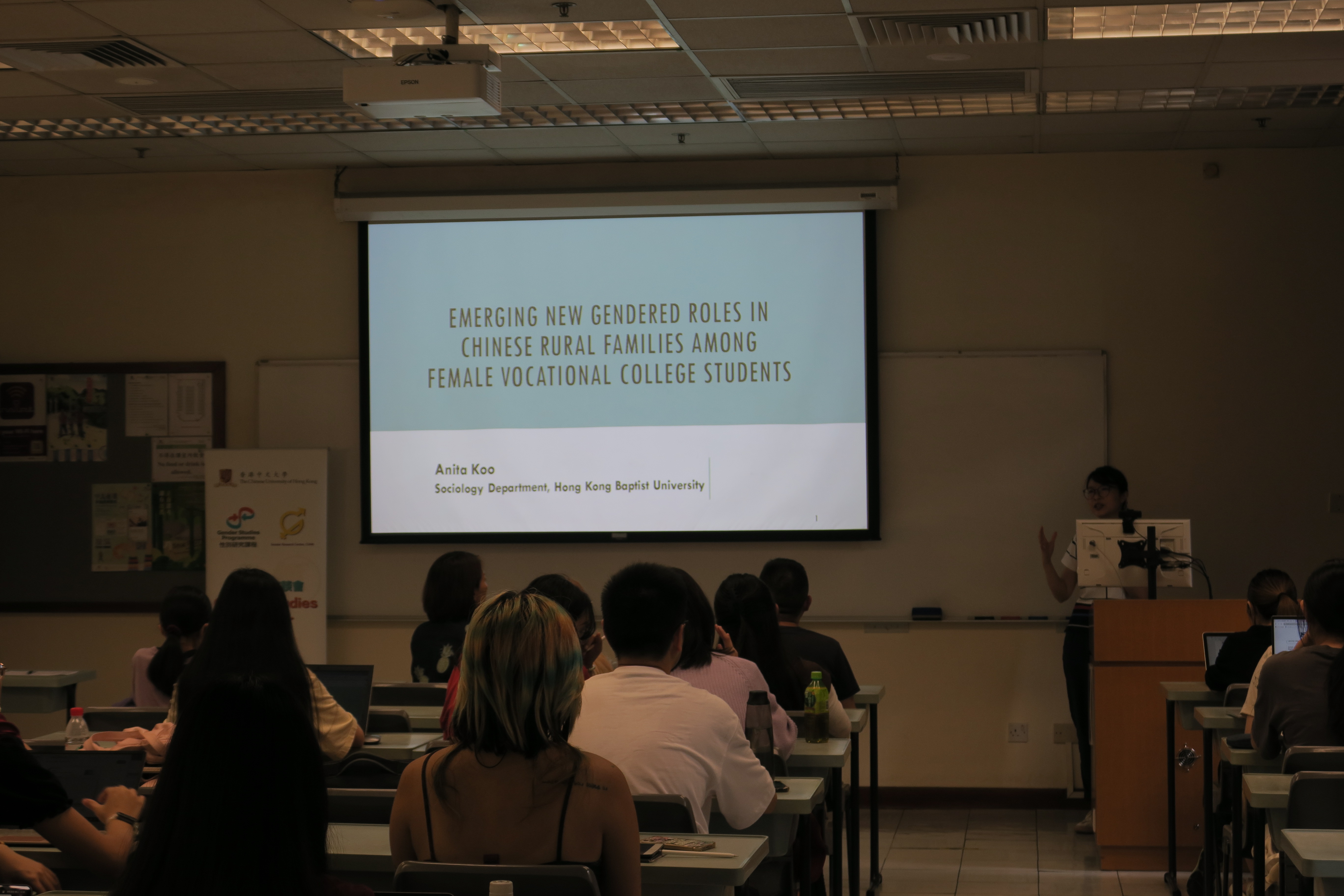 |
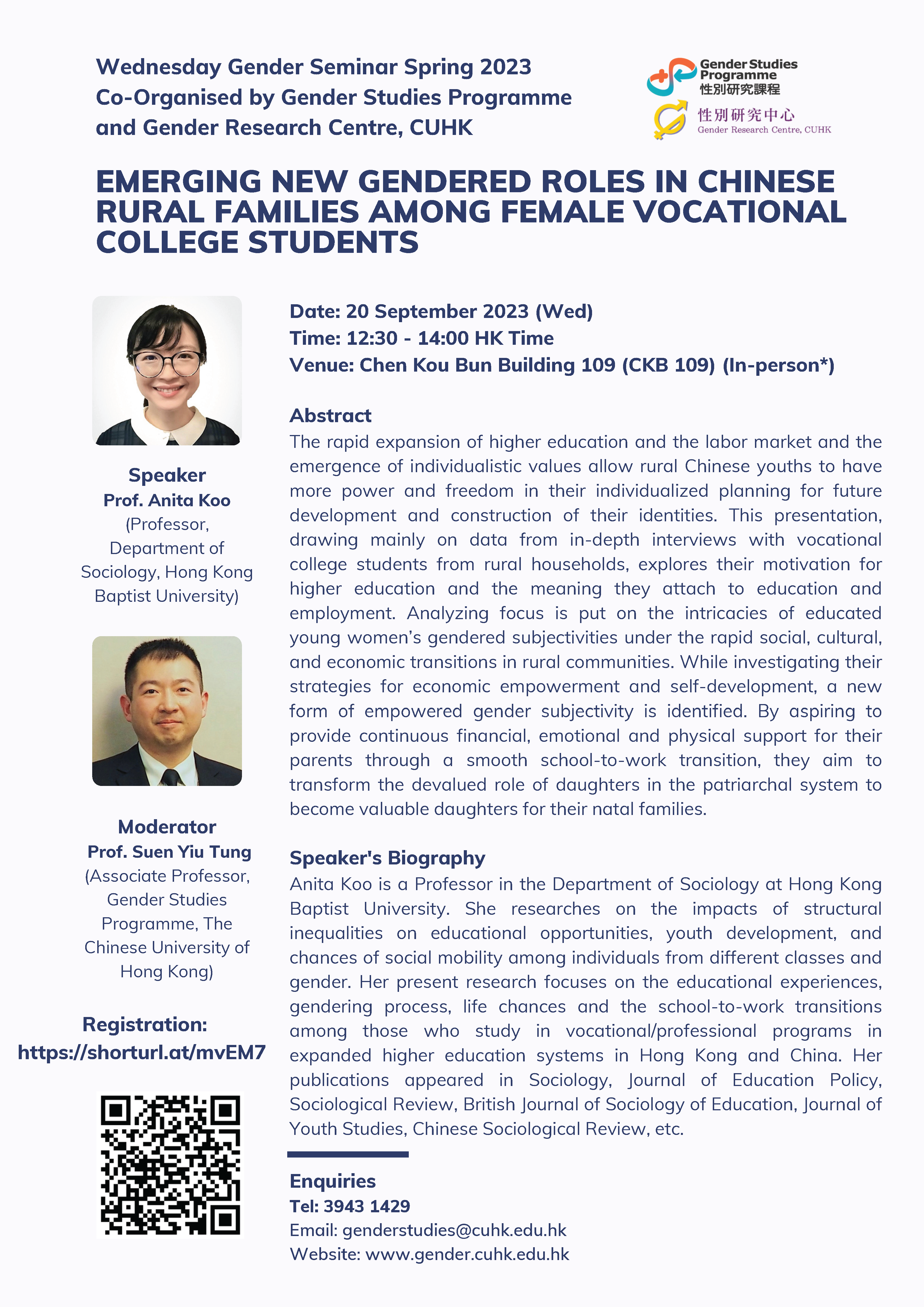 |
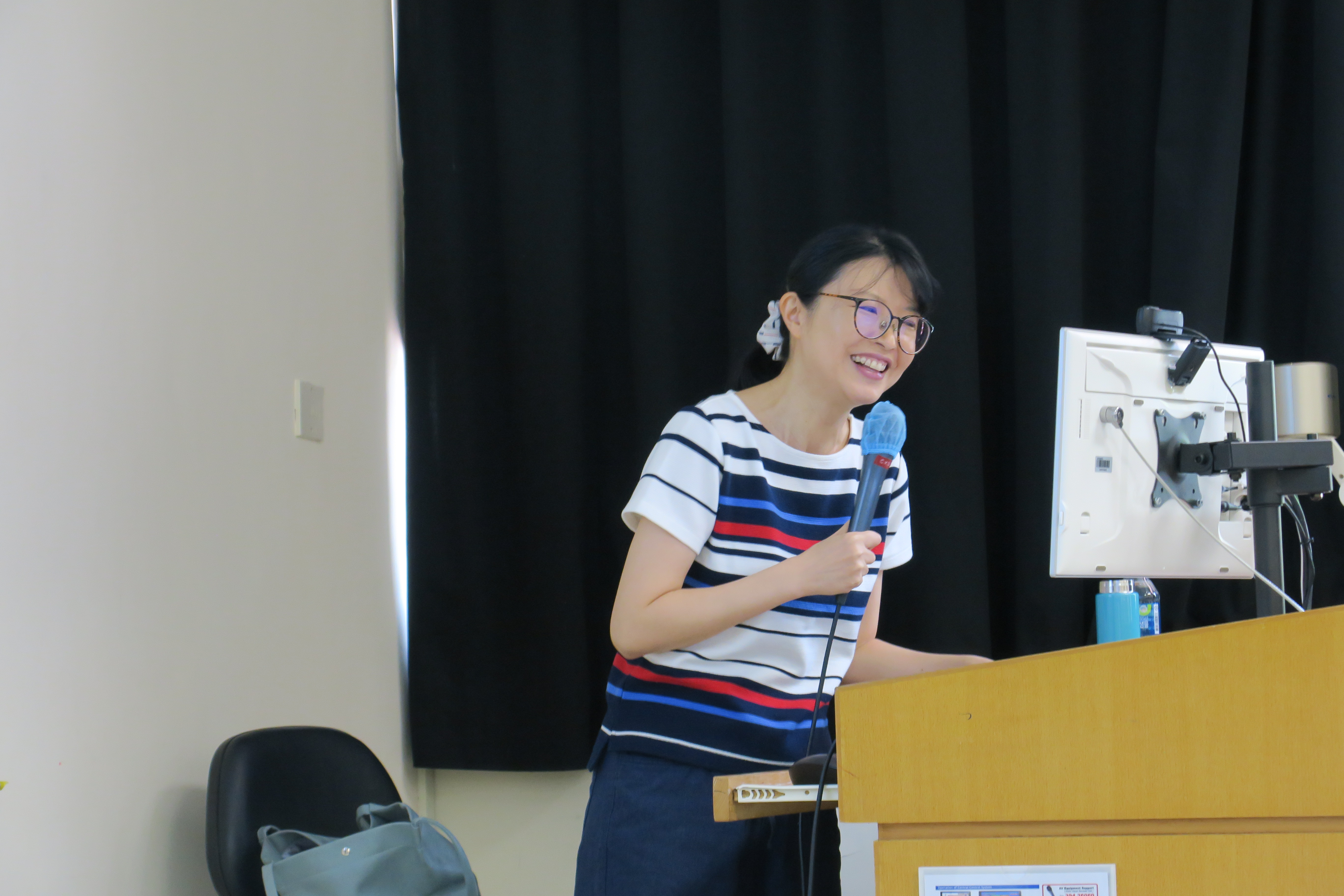 |
This presentation focuses on the neglected field of vocational education in rural China, concentrating on the progression of women's roles.
It begins with a background on vocational education in China. Vocational education is promoted in China to train skilled workers and foster development and high-paying jobs. Three main types of vocational school students were identified: children of rural migrant families, students with working-class backgrounds, and youth with other rural backgrounds.
The presentation featured two vocational colleges where most of the students come from rural areas and need loans to attend school. The marks scored by the students in the exams were too low, forcing them to choose vocational education. Professor Anita Koo found that there are inequalities in vocational education experiences. Men tended to study engineering, while most women studied programs such as nursing to enter the service industry. Both male and female students desired to gain better employment opportunities through education, whereas their educational choices were correlated with the needs of the gendered labor market.
Then Professor Anita koo interviewed the rural female students with questions about their educational decisions and life-planning. Rural women prioritize self-development and achievement through vocational education, and young women are beginning to aspire to financial independence and delay their marriage time. The female students believe that through this training they can counteract the traditional family system where rural women are seen as secondary and subordinate. They choose safe career paths as they consider practicality to be more valuable. Nevertheless, rural Chinese women's desire for a caregiving role persists. This is closely related to the cultural context of rural communities in China, where their desire is to be valuable daughters. In appreciation of the support from their parents, they prefer to stay in their hometowns and become caretakers of their families. Men, on the other hand, take risks and become themselves to fight for the future.
In summary, the presentation brought about directions I had never thought about and exposed some issues. The advancement of women in education is an important transformation that enables them to obtain stable jobs in society and become independent women. These successful female students have economic autonomy, bringing new hope and influencing more female students. However, in the context of China's rural culture, it is difficult for women to break out of the role of family contributors.
撰文:CAO, Jun
This lecture is titled as Emerging New Gendered Roles in Chinese Rural Families among Female Vocational College Students. Prof. Koo introduced the concept and influential factors of vocational education in China, pointing out analysis directions or questions with her research results after collecting lots of quantitative data.
First, Prof. Koo pointed out that vocational education is important but neglected. The rate of 40% students entering the vocational track represented the inequality of resources and opportunities, which was shown by the composition of students who were basically from rural or working-class backgrounds and got low grades in public examinations. With the development of industrialization and urbanization, expanding vocational education improved more opportunities to rural students, especially young women, but it seems that the regional and gender gap didn't narrow in higher educational attainment.
Second, information concerning vocational college students were shown to discuss the impact of increased educational attainment on social values. Prof. Koo demonstrated cases from two vocational colleges in Bijie and Lanzhou region. By attending vocational colleges, students who failed to enter universities claimed subjectivities to achieve self-development, as Chinese youth had created new explanation of subjectivites. For rural female students, attending vocational colleges is regarded as personal intention for both individual success and convenience of natal family, concequently they have a strong sense to pursue economic independence instead of romantic relationships, but their achievements from realistic choices targeting “good major/courses” only for female still reflects gender stereotypes and segregation.
At last, Prof. Koo discussed how the vocational education forced social change by transforming the gender norms and how this training empowers female students. The key finding is that the new roles of young rural women is “valuable daughters” which is not acknowledged by the old patriarchal system. Their motivation of taking vocational education is trying to actively take responsibilities to prove ability or subjectivity by providing financial, emotional and physical contributions to natal family, which greatly enhances their sense of self-worth. However, this empowered agency may not challenge but strengthened the gendered structure of the labor market and the primary caregiving role of women in the family.
撰文:FONG, Yuk Ping
Prof. Anita Koo presented her research on the emerging new gendered roles in Chinese rural families among female vocational college students.
The rapid expansion of China’s higher education and labor market has led to the expansion of the important but neglected vocational education system, which provides young people who have failed public examinations the opportunity to realize their neoliberal dream. However, improvements in educational opportunities have not narrowed regional and gender gaps in higher education attainment, especially for female and rural students, gender segregation is more pronounced in poorer areas. These factors prompted Prof. Koo to focus her research on female students in vocational colleges who grew up in poor rural areas.
Prof. Koo conducted fieldwork in two vocational colleges in Bijie, Guizhou, and Lanzhou, Gansu, the poor provinces in western China. More than 80% of the students were from surrounding rural areas. Prof. Koo used in-depth interviews to explore the complexity of gender subjectivity among the new generation of educated rural female students.
The interviews revealed that these girls all emphasized the importance of economic independence. They resisted traditional patriarchal arrangements through education and employment, and planned to develop their careers before considering marriage. However, unlike career women, “reality” rather than inner passion, personal interest, or self-realization is the common decision-making attitude of these girls when making education and career choices, and “life stability” is more important than future development opportunities. What they consider a good major is defined by a highly gendered labor market. This is influenced by the social and cultural background of Chinese rural communities. Underneath their strong desire for economic independence and pragmatic choices about education and career lies their strong desire to become “valuable daughters” of their natal families. They hope to provide continuous financial, emotional, and material support to their parents through the three new roles of economic role, care taker, and supporter, thereby changing the devalued status of daughters in the patriarchal system. Gaining a sense of self-worth and meaning by actively assuming the family responsibilities and contributions traditionally expected only from sons is central to their gendered subjectivity.
Overall, although these female rural students know the importance of work for economic independence, they do not regard being a career woman as a measure of self-worth. Instead, they use their relational nature to measure their contributions. By shaping themselves into “valuable daughters”, they complete self-realization in the process of providing support to their natal families. However, Prof. Koo also pointed out that such an empowered agency does not necessarily challenge the gender structure of the labor market and women’s primary caregiving role in the family but instead reinforces gender segregation. Nevertheless, they think it is a massive change because they gain a new identity.
撰文:CHEN, Peiwei
This seminar focuses on female vocational school students ’ educational decisions and the life-planning and explores the factors that shape the goals and future roles of this new generation by doing fieldwork in Bijie, Guizhou and Lanzhou, in order to give a better understanding of the subjectivities of female rural students and to think about how can they exercise their agency and construct their own identities.
According to the situation of traditional rural women who married early, female students in vocational colleges think they are different from them. They resist the traditional arrangement- be married in their late teens and stay at home to take care of kids- and refuse to be subordinated in the partrilineal family system.
The importance of economic independence is their main concern. Those female students believe that girls need to have their own careers and if they are financially independent, they are better able to help their parents and have more confidence if they get married someday.
To increase one’s likelihood of being employed in the highly gendered labour market, the female students choose to be more realistic and will go for the major that are suitable for girls and the job that can provide a stable life, which reinforces the occupational gender segregation. They intentionally retreat from the skilled manual jobs. The education doesn’t bring significant change to the gender structure in the labour market.
Behind their hope for economic independence and pragmatic choice in education and occupation, they actually aspire to be valuable daughters for their original family. They take the role of economic resources to contribute to their parents, the role of close-distance care takers and the role of supporter for their younger (male) siblings to go further and achieve bigger.
The gendered subjectivities of female vocational students in rural area come from taking up the responsibilities and contributions to their family that were previously expected only for sons. They seem to have more agency, but it doesn’t challenge the gender structure in labour market and the primary role of women in the family.
撰文:DU, Qiongxuan
Vocational education in China has been overlooked both academically and in policy discussions, and students engaged in vocational education have been stigmatized as "failures" and marginalized in society. However, after 2000, China's higher vocational education, in conjunction with national manufacturing policies, offered a new neoliberal dream for these marginalized students. How can we understand liberation and progress within this marginalized context? Professor Koo's remarkable qualitative research on rural vocational college students portrays the challenges and choices of rural young men and women entering higher vocational education. Particularly, when male students' employment aspirations are entangled with the national dream, female students' choices become active, long-term, and highly strategic decisions. By enhancing feminized skills in college, female students choose to conform to the highly gendered labor market, at the same time they position themselves back into family (as valuable daughters, caregivers, and supporters, rather than career women) to construct their identity. Vocational education, however, didn't change the gender structure in the labor market; it reinforced gender segregation.
Here, the based on assumption that higher education leads to liberation can be further discussed. It equates higher vocational education with higher education. However, vocational education in China, including higher vocational education and secondary vocational education, may not necessarily complement higher education; in fact, they can compete. The more university higher education develops, the fiercer the competition vocational college students face in the job market. Furthermore, as shown in the talk, higher education is expected to increase student mobility, whereas higher vocational education limits students to their hometown regions, turning them into local "technical workers." The content of higher vocational education is also embedded in the patriarchal discourse prevalent in rural areas, serving market values. Instead of being liberal, it has the potential to further reinforce class segregation between urban and rural areas.
There's also heterogeneity within vocational education. Secondary Vocational Education emerged simultaneously with compulsory education and has a history of over 70 years. It largely serves as a supplement to the nine-year compulsory education, often considered the "destiny" for rural and working-class families. On the other hand, Higher Vocational Education began to develop after 2000, with an emphasis on it post-2015. Students in Higher Vocational Education have already crossed the 50% high school dropout rate and possess higher levels of educational capital. They represent a privileged minority within vocational education, and this "privilege" is inseparable from their efforts and parental investments. Exploring the heterogeneity of vocational education can better help us understand the identity construction of rural vocational education students, especially their positioning within their family roles.
撰文:HUANG, Jiying
2023年春季
香港中文大學性別研究課程、性別研究中心合辦
12 Apr 2023 (Wed) Mini-Conference of Thesis of BSSc & MA in Gender Studies 2023
 |
 |
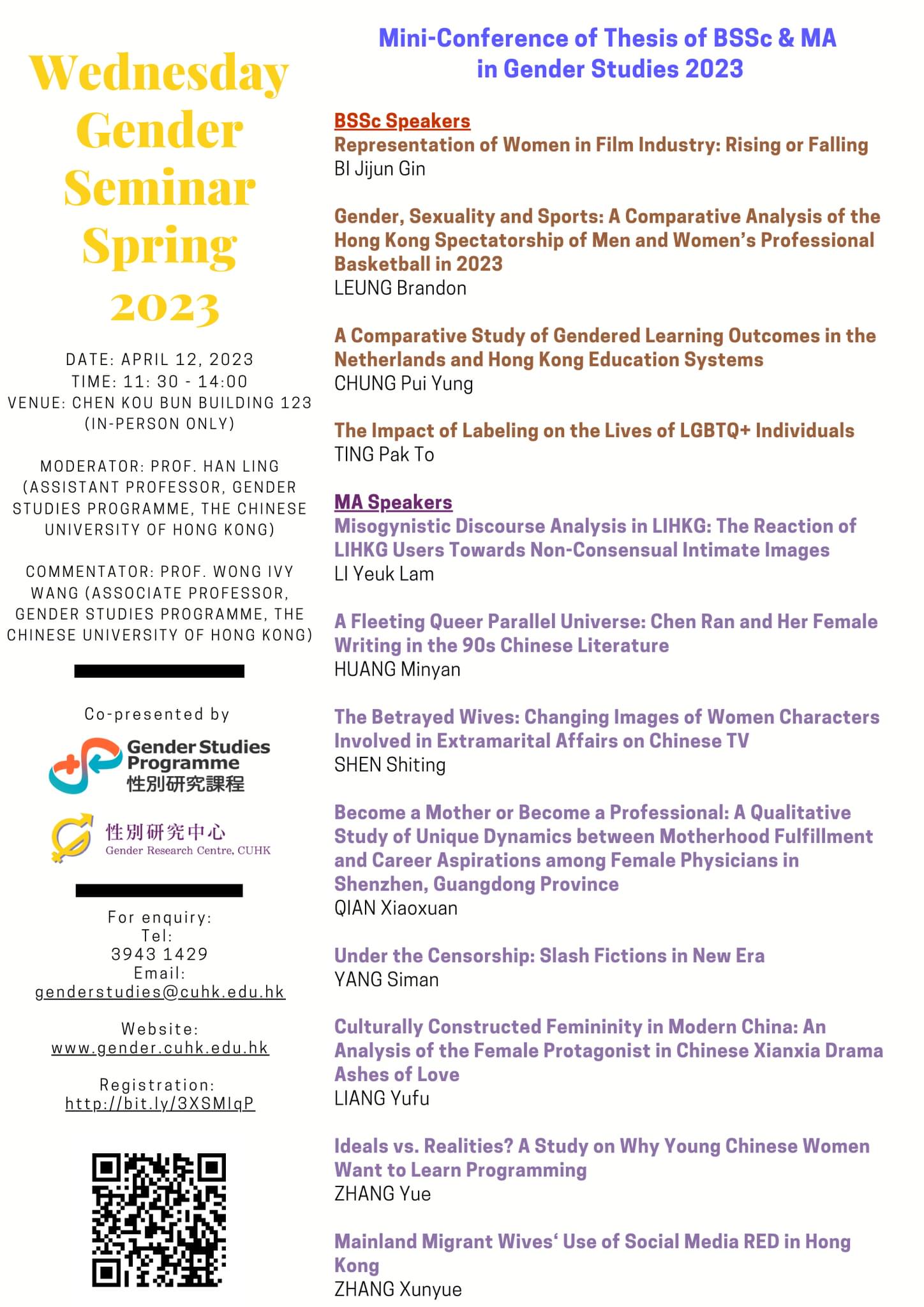 |
|
 |
 |
Bi Jijun Gin
此研究旨在探索電影產業從業者的性別比例懸殊的現象及大眾認知。大眾對性別的認知及性別刻板印象的形成深受媒體呈現的影響。媒體對幕前幕後女性電影業從業者的呈現,也會影響和塑造大眾對這一群體的認知。數據顯示,由1998年到2020年,從事電影幕後工作的女性占總從業者的比例有小幅上升,由17%上升到了23%。同時,這些女性從業者所擔任的職位也影響著電影中的性別呈現。由女性擔任製作人或由女性編劇參與創作的電影往往會塑造出更立體、更令人尊重的女性角色,電影的題材和內容也更加豐富多元。此外,若女性在電影項目中有招聘上的決策權,那麼這些項目的女性員工比例也會較高。在此次分享中,研究者主要介紹了他的研究中“大眾對電影業從業者性別比例的印象”這部分的數據。通過調查問卷的方式,研究者收集了100 份大學生的回覆。所有的參與者都高估了女性在電影行業的參與率,其中57%的參與者認為女性占到所有電影從業者的一半及以上。這個結果顯示,大學生群體對電影業的性別不均現狀沒有準確的認識。不準確的認知會令公眾意識不到推動電影業性別平等之迫切性;因此,這一結果亦彰顯了在大學建立聚焦女性的電影社團、進行公眾教育之必要。而在電影業內部,如要改變“男性主導”的產業現狀,則需讓更多女性擔任更有話語權的角色,從而帶來從校園到業界、從幕後到幕前、從招聘到創作內容方方面面的改變。
Brandon Leung
美國男/女子職業籃球聯賽(NBA/WNBA)是在全球範圍內廣受歡迎的運動賽事,相關的觀眾研究卻很稀缺。在職業籃球領域存在巨大性別薪資差異,數據顯示,在2020年,男性明星球員的薪水是同等成績女球員的178倍。此外,研究者注意到在香港,人們對NBA賽事的關注遠多於對WNBA賽事的關注。因此,研究者將性別視角引入籃球運動的觀眾研究中,比較香港觀眾對不同性別的職業籃球運動員的態度。此次分享中,他提出了三個關於女子籃球及WNBA的假設:1、觀眾傾向於低估女子籃球的價值,主要原因包括人們對女性體力和運動天賦的刻板印象;2、觀眾對籃球行業的關注度主要取決於相應的市場營銷是否有效;3、觀眾認為在捍衛女性籃球運動員權利、促進性別平等及行業發展方面,籃球協會(WNBA)應該承擔全部責任。
此研究採用了一對一訪談的方法,受訪者包括五位女性和五位男性,他們均有一定的籃球相關經驗(例如:上過籃球課、現為籃球隊隊員等)。訪談時長約45分鐘,在訪談開始前,受訪者需接受與NBA及WNBA有關的測試,以熟悉訪談話題。研究結果顯示,受訪者均認為WNBA的運動員具有足夠的體力及專業能力從事職業籃球,她們在比賽中付出的努力及展露的決心值得尊敬。關於市場營銷,受訪者認為相關的產品及服務可以增加運動員的曝光度,好的營銷策略會增加大眾對籃球運動的關注度。最後,受訪者認為籃球協會應該承擔起推動產業內性別平等的責任,因為它們擁有大量的資源和影響力去做這件事;此外,推動性別平等不止能使女性籃球運動員受益,亦將對整個籃球產業產生長遠的積極影響。
CHUNG Piu Yung
本研究旨在比較荷蘭和香港兩地不同的教育系統會導致怎樣性別化的教育結果。荷蘭的教育模式偏向問題導向式學習(Problem-based learning/PBL),以學生為中心,著重培養學生解決實際問題的能力。PBL通常以小組合作的形式進行,在這個過程中,學生能夠主動思考,自由表達自己的想法,培養人際溝通的技巧。香港的教育模式則更偏向傳統,以老師的講授為主,學生的角色較為被動;這可能是因為在香港人們更看重學生的考試成績。過往研究顯示,在傳統的教育模式下,女學生的學業表現不及男學生。同時,有研究表明,PBL有助于建構更加包容和平等的學習環境,這可能會促進女學生的學業表現。此研究計劃使用量化的研究方法以達成以下三個研究目標:一、比較荷蘭和香港兩地男女學生的學習結果會否有顯著差異;二、比較在荷蘭和香港參與“問題導向學習”教育項目的學生在學業上是否有性別差異;三、探索荷蘭和香港獨特的文化及社會因素會否影響“問題導向學習”式教育促進性別平等的效果。此研究的結果將揭示荷蘭和香港的學生在學習成績、專業選擇及職業規劃上是否有相似或不同的性別化範式,亦期望對兩地的教育政策制定者及教育者有所啟發。
TING Pak To, Parco
“LGBT+”泛指異性戀之外的性/別少數群體。這一標籤有著接納和連結性/別少數群體的積極意義,但這個標籤的廣泛應用也可能加深人們對這些群體的刻板印象——亦包括性/別少數人士對自身所屬群體的刻板印象。而這些刻板印象對性/別少數群體的身份建構可能產生複雜的影響,例如導致性/別少數群體的社會地位下降、個人獨特感的喪失及個人目標及價值的重塑等。因此,本項研究試圖探究“LGBT+”的標籤如何影響性/別少數群體的身份構建過程。
此研究將採用半結構式訪談收集數據,計劃採訪15位20歲以上、生長於香港、對個人性/別認同或表達有深刻理解的“LGBT+”人士。目前已邀請兩位受訪者參與初步研究,證實研究計劃採用的訪談方式是有效可行的。初步的研究結果顯示,“LGBT+”的標籤有助於性/別少數人士理解自己的性/別認同,例如,一位雙性戀的女性受訪者提到她“很感激這一標籤的存在,否則不知該如何看待自己”。這一研究發現展示了“LGBT+”標籤對性/別少數人士身份認同的積極意義,有別於大部分以往研究的發現。關於刻板印象,一位雙性戀受訪者表示,作為“LGBT+”的一員,不止要面對“LGBT+”社群外的對性/別少數群體的刻板印象(例如:雙性戀更淫蕩),亦要面對“LGBT+”內部細分群體對彼此的刻板印象(例如:只交往過女/男朋友則不是雙性戀)。然而,儘管受訪者承認性/別少數群體和置於他們身上的標籤互相影響,當被問到“LGBT+”這一標籤是否影響她個人的身份建構過程時,受訪者的回答是否定的。研究者認為部分受訪者或許無法意識到外部標籤與個人認同之間的連繫或交互作用,因此在之後收集數據的過程中,在這一面向需要詢問更具體的問題及對受訪者的回答做出更精準的判斷。
Li Yeuk Lam Blue
LIHKG連登是香港最熱門的網上社群之一,該平台以其反對女權主義、環保主義等左翼思想的氛圍聞名。未經同意散佈私密影像(NCII)是一種基於影像、隨著網絡發展而愈發普遍的性暴力行為。2021年,香港《刑事罪行條例》中增添了關於“窺淫、非法拍攝或(威脅)散佈他人私密影像”的相關條例,由同年10月開始實施。連登平台亦設有投訴NCII的途徑。然而,據本地NGO風雨蘭2023年的調查,連登是香港對“移除未經同意私密影像的要求”反應最為消極的網絡平台之一。基於以上背景,此研究旨在一、檢驗連登用戶在論壇討論中用以維持其厭女文化的模式;二、通過話語分析,揭示NCII受害者所遭受了一系列惡意對待(個人信息起底、網絡性騷擾等);三、推動司法完善及更有效的干預策略,為受害者提供支持。
此研究選取了連登平台上的兩個NCII案例,針對討論頁面中的用戶留言進行批判性話語分析,並將其中的厭女留言歸為六大類:蕩婦羞辱、身材羞辱、責備受害者、讚揚男性施害者/參與者、性暴力及其他傷害受害者行為。初步分析顯示,連登用戶常使用研究者提出的前三類留言來貶低女性受害者的身體,責備受害者同意影像,並認為她們同意影像則應預料到這些視頻/照片會被發佈。此外,研究者在留言區觀察到明顯的男性連結。連登男性用戶對影像中男性參與者或表以同情,或認為男當事人具有性魅力/是獵獲性資源的贏家。同時,研究者還觀察到許多對女性受害者進行性騷擾或打探受害者個人信息的留言。不過,研究者所選取的評論未能涵蓋針對這兩起案例的談論裡最惡劣、最粗魯的留言,因為相關討論在研究進行時已被刪除。這使得本研究的材料全面性有一定局限。
HUANG Minyan
酷兒閱讀(Queer Reading)如同捉迷藏(Hide-and-Seek)。文學作品中具有酷兒性的部分不總是顯而易見,它們往往是模糊、隱晦的,需要讀者仔細閱讀才得以辨認。自1990年代,酷兒理論在全球範圍逐漸傳播,亦在與華語文化的交互作用中逐漸實現了本地化。近30年間,華語世界產出了不少具有酷兒性的文學作品及聚焦酷兒理論的學術著作。此研究採用酷兒華語語系的框架,著眼於1990年代的中國文學。此時的中國處於已經歷了80年代女權主義思想的引介與傳播,但仍未進入21世紀網絡世代酷兒思想廣泛傳播的承接階段。研究者選擇了出生於北京的女作家陳染的作品爲閱讀文本,意圖探索這一階段中國本土的寫作中是否已有具有酷兒性的作品。陳染活躍於80年代末及90年代的中國文壇,以其私密、挑戰傳統的寫作主題,獨特離奇的寫作手法聞名。研究者意圖通過酷兒理論重讀這些90年代的文本,對文本中的酷兒意涵進行再詮釋,重新理解女性作家在當時中國文壇的位置,並挑戰重寫由男性主導、異性戀霸權的以及以漢文化為中心的文學史話語。
研究者分享了她的初步閱讀發現。陳染提出了“超性別寫作意識”的概念,認為同性間更具默契、更易相互理解,在寫作中盡力書寫非傳統的女性角色及女性間的關係。然而,陳染宣稱自己不追求也無意宣揚同性愛。這些論述在研究者看來具有一定程度但不充分的酷兒意識。陳染的小說作品展露出更豐富的酷兒性。例如,她曾創作了一個癲狂的女同性戀角色,但並不像許多西方作品的處理,將父權社會壓迫外化為癲狂,最終又將癲狂的後果導向角色自身。陳染筆下的這一角色將暴力導向外部,殺害了男性出租車司機。陳染作品中的另一特點是對親緣關係的酷兒化。她常在作品中描繪(類)母女關係,不論這些女性角色間是否有血緣關係,並將對女性間的同性情慾書寫融入其中。這樣複雜的關係不能僅由弗洛伊德的俄狄浦斯/厄勒克特拉情結理論來解釋,而需要更酷兒化的理解。基於以上分析,研究者認為中國文學裡的酷兒創作仍然等待更多的發現、閱讀、命名和研究。
撰文:TANG Xiaolei Anita
SHEN Shiting同學以極具中國市場吸引力的幾部典型婚戀主題電視劇為文本,探究出軌妻子形象的變遷,她們從以家庭為導向的純良母性形象到更為獨立、更以自我為中心甚至勇於復讎的現代女性形象,反射出中國社會文化環境及性別意識形態的微妙改變。
YANG Siman同學研究了中國耽美小說在嚴格審查制度下的夾縫生存。 一方面論述審查制度作為建構話語、堅持主流文化的政治導向、審美導向的重要前提,另一方面通過訪談挖掘民間自發性的協商與應對策略。
LIANG Yufu同學從中國仙俠電視劇中的女主角切入對現代中國構建的女性氣質的分析。 她認為這類劇作中的女性角色因擁有等同或超出男性角色的體能而擁有更大自主權,並打破了傳統社會女性要麼獨身要麼脫單的二分法人生發展模式,這些都在一定程度上違背了傳統對女性氣質的定義。
QIAN Xiaoxuan同學展開對中國深圳女性醫師家庭抱負和職業抱負之間選擇的定性研究,發現職業女性醫師的家庭責任期待是社會性別化建構的結果,即便家務外包成為一種替代性選擇時,傳統的性別分工模式依然不變,這些女性醫師 會從生活滿意度、社交關係中將其合理化,從新自由主義女權主義的壓迫轉化為自我選擇。
ZHANG Yue同學探討了女性轉碼的動力及在工作場域面對的性別實踐。 作為一種通往獨立和自由的手段,碼農是部分女性積極的就業選擇,但即便擁有了技術框架下傳統意義上的『無性別』身份,她們仍會面對性別化的質疑,甚至性騷擾。
ZHANG Xunyue同學研究了在小紅書活躍的大陸移民妻子群體的賦權和挑戰。 通過記錄日常、分享攻略、學習技術和賺外快等方式,她們建立了線上下社交網路並能消磨閒暇時光,但她們仍會因無法實現自我認同的博主身份和社會對其角色期待的壓力而無所適從。
撰文:XU,Yinuo
22 Mar 2023 (Wed) Empathic Accuracy, Mental Depletion, and Relationship Satisfaction among Heterosexual Romantic Couples
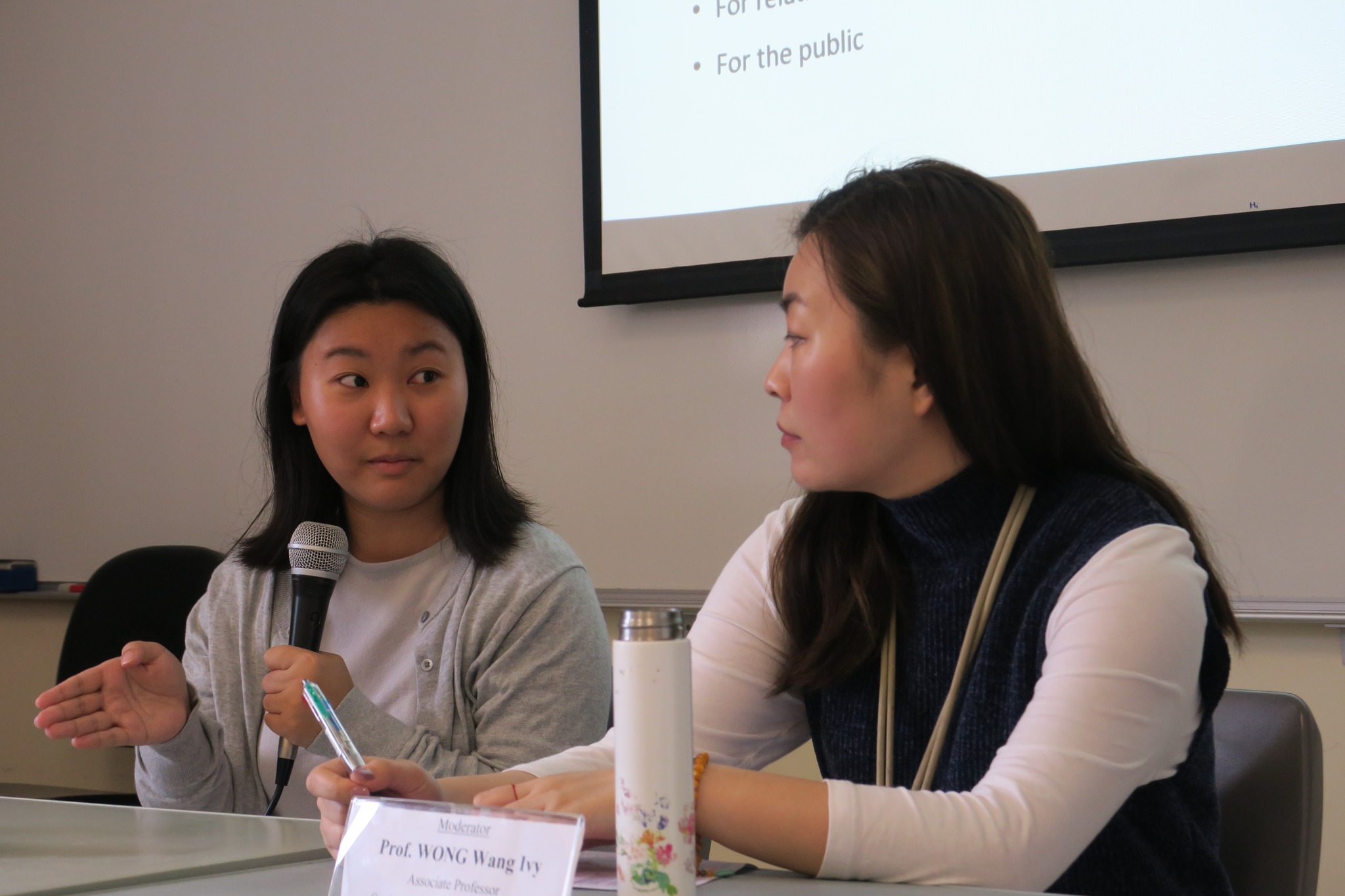 |
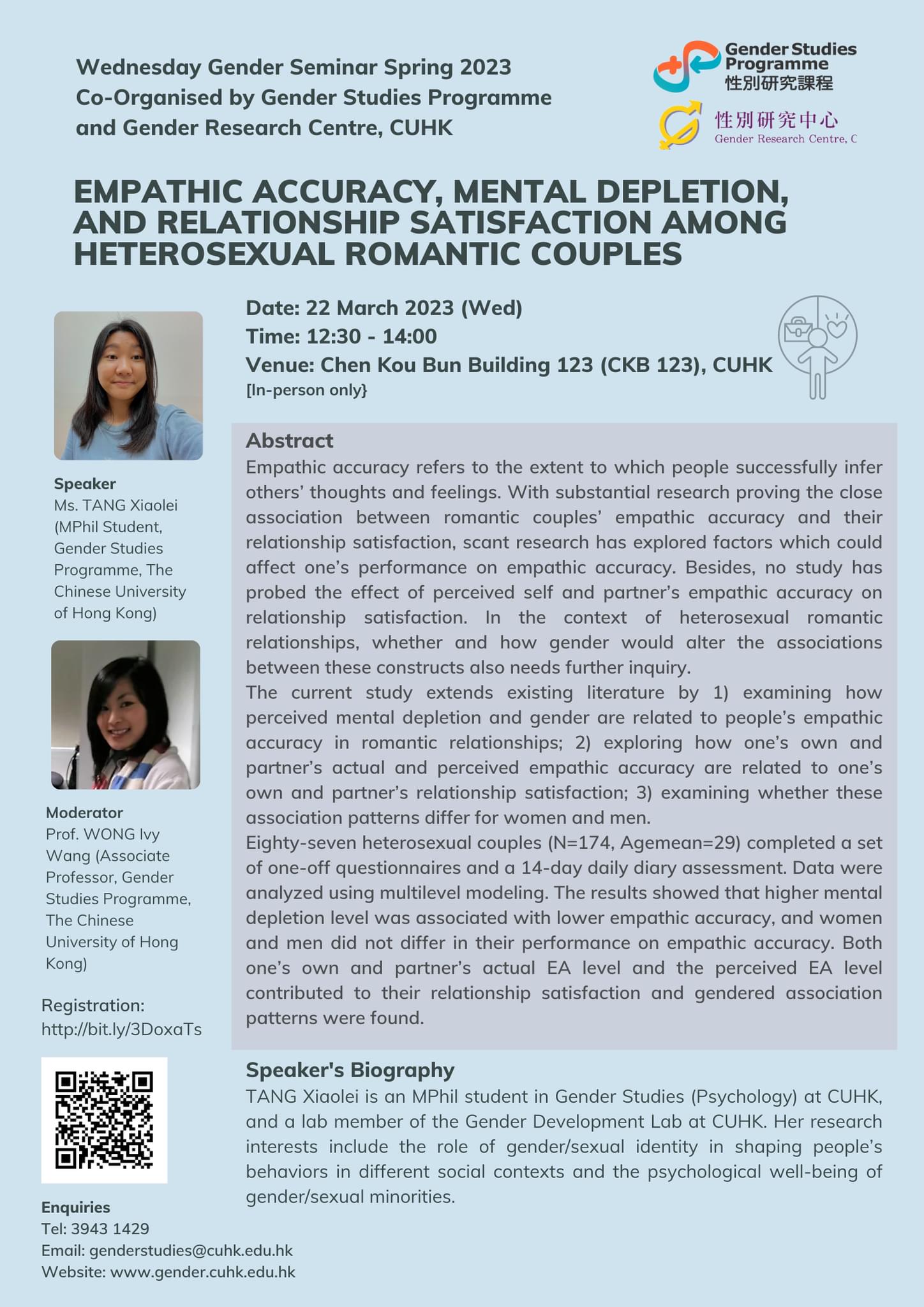 |
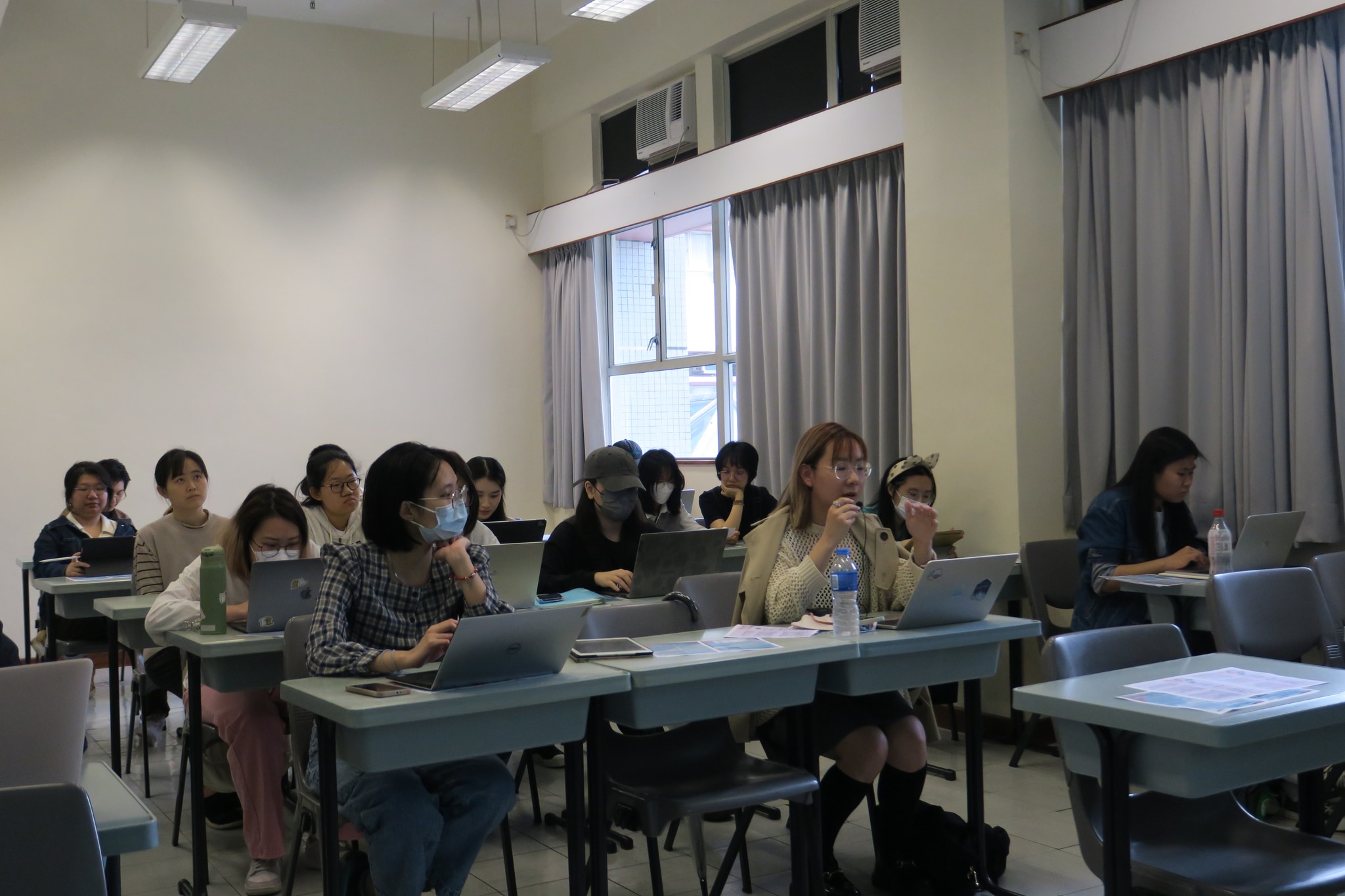 |
在2023年3月22日的週三性別研討會上,香港中文大學性別研究專業的研究型碩士Tang Xiaolei同學分享了她的研究《異性戀關係中的共情準確度,精神消耗和關係滿意度》。 共情準確度(Empathy Accuracy, 下文稱EA)是指人們成功推斷他人想法和感受的程度。 此前已有大量研究表明,情侶的EA和他們的關係滿意度之間存在密切聯繫,但很少有研究探討可能影響一個人EA水準的因素,而Tang 同學的研究考察了所感知的精神消耗、性別和人們在戀愛中的共情準確度的關係,探索了自己和伴侶的實際和感知的共情準確度與自己和伴侶的關係滿意度的關係,考察了這些關聯模式是否存在性別差異,這彌補了此前研究的不足。
在Tang同學的研究中,87對異性戀伴侶獨立完成了一套一次性的問卷調查,和14天的每日日記評估。 在問卷調查中,這些異性戀伴侶的回答會體現他們的共情力商數(Empathy Quotient)——他們對自身共情力的評估,和他們對當前戀愛關係的滿意度,以及他們的一些基本資訊。 在每日日記評估中,他們會更具體地評價當天自己的精神消耗程度、自己如何看待當天的伴侶和戀愛關係以及自己和伴侶的心情,並且,他們會需要對自己的評價準確度進行估計。
Tang同學使用分層線性建模(Hierarchical Linear Modeling)和參與者-搭檔相互依賴模型(Actor-Partner Interdependence Model)對收集到的數據進行了分析。 結果顯示:較高的精神消耗水準與較低的EA水平有關; 女性和男性在EA水平的表現沒有差異; 自己和伴侶的實際EA水準和感知的EA水準都對他們的關係滿意度有積極影響。 同時,Tang同學比較了以上幾組關聯模式中的性別差異。 Tang同學的研究表明,在異性戀情侶之間要保持良好的關係,溝通是關鍵; 適度休息有利於優化伴侶關係。
撰文: LI, Xiangyi
15 Mar 2023 (Wed) 撒嬌攻:耽美小說中的親密關係幻想與對陰柔氣質的再賦義
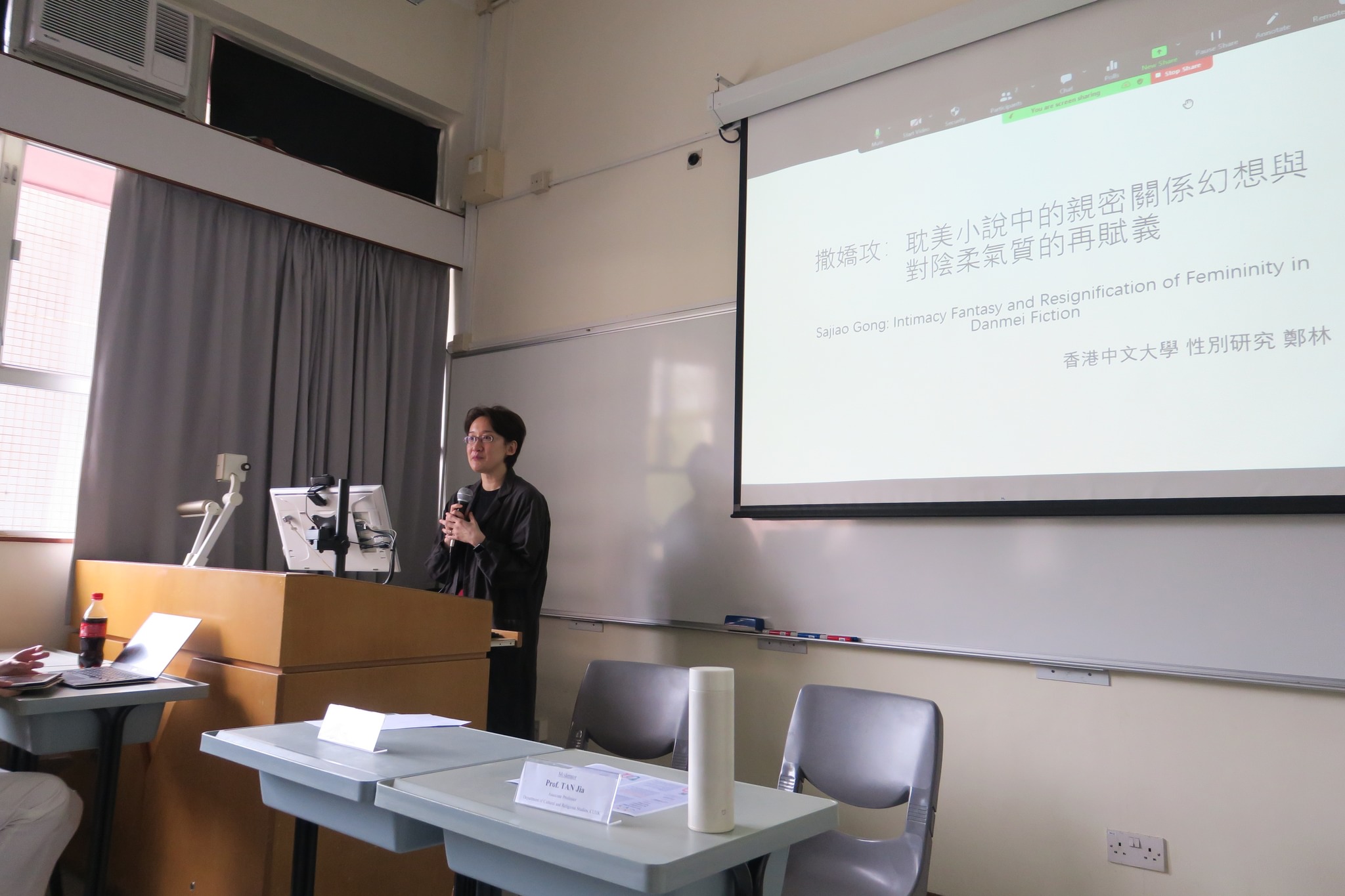 |
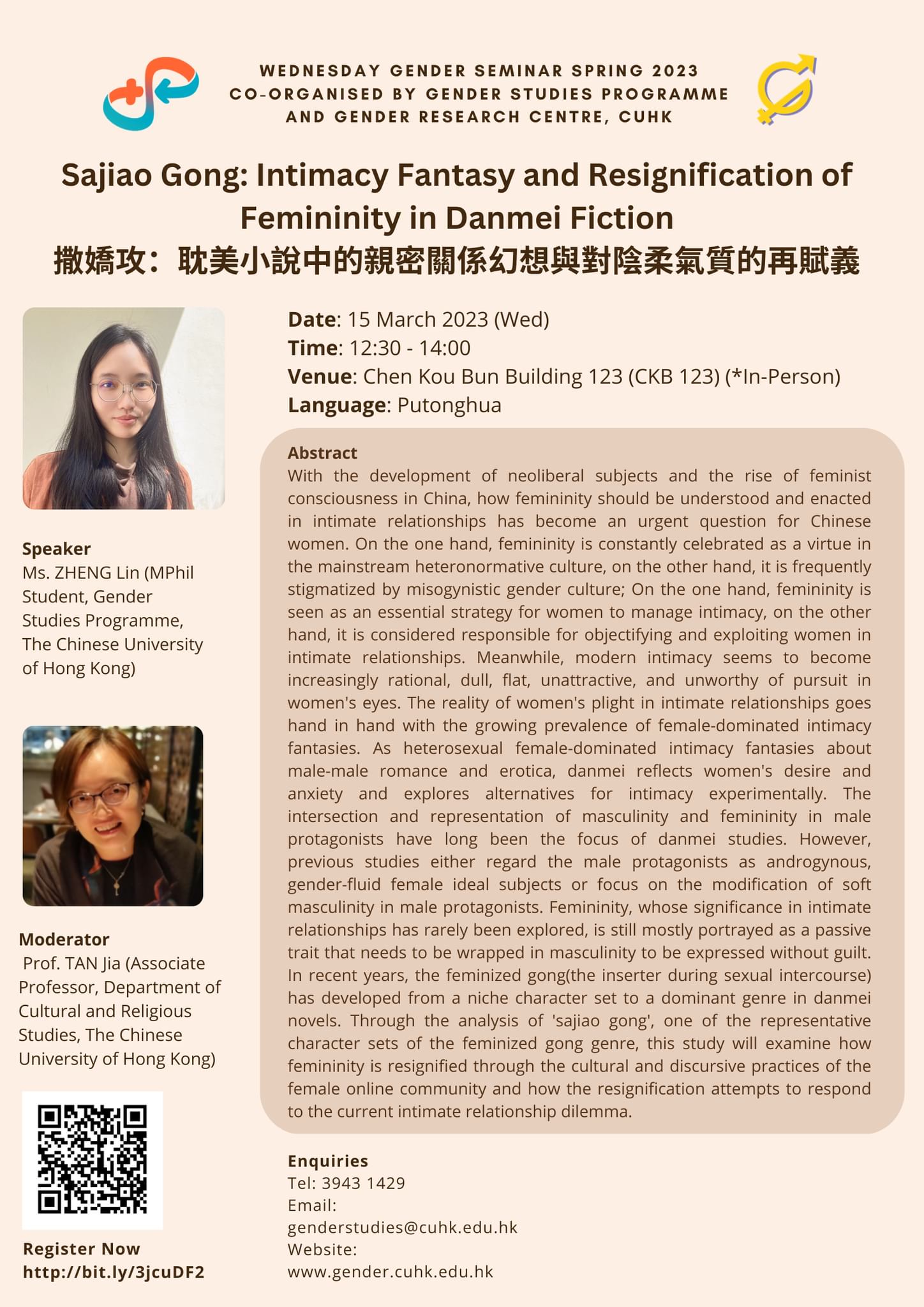 |
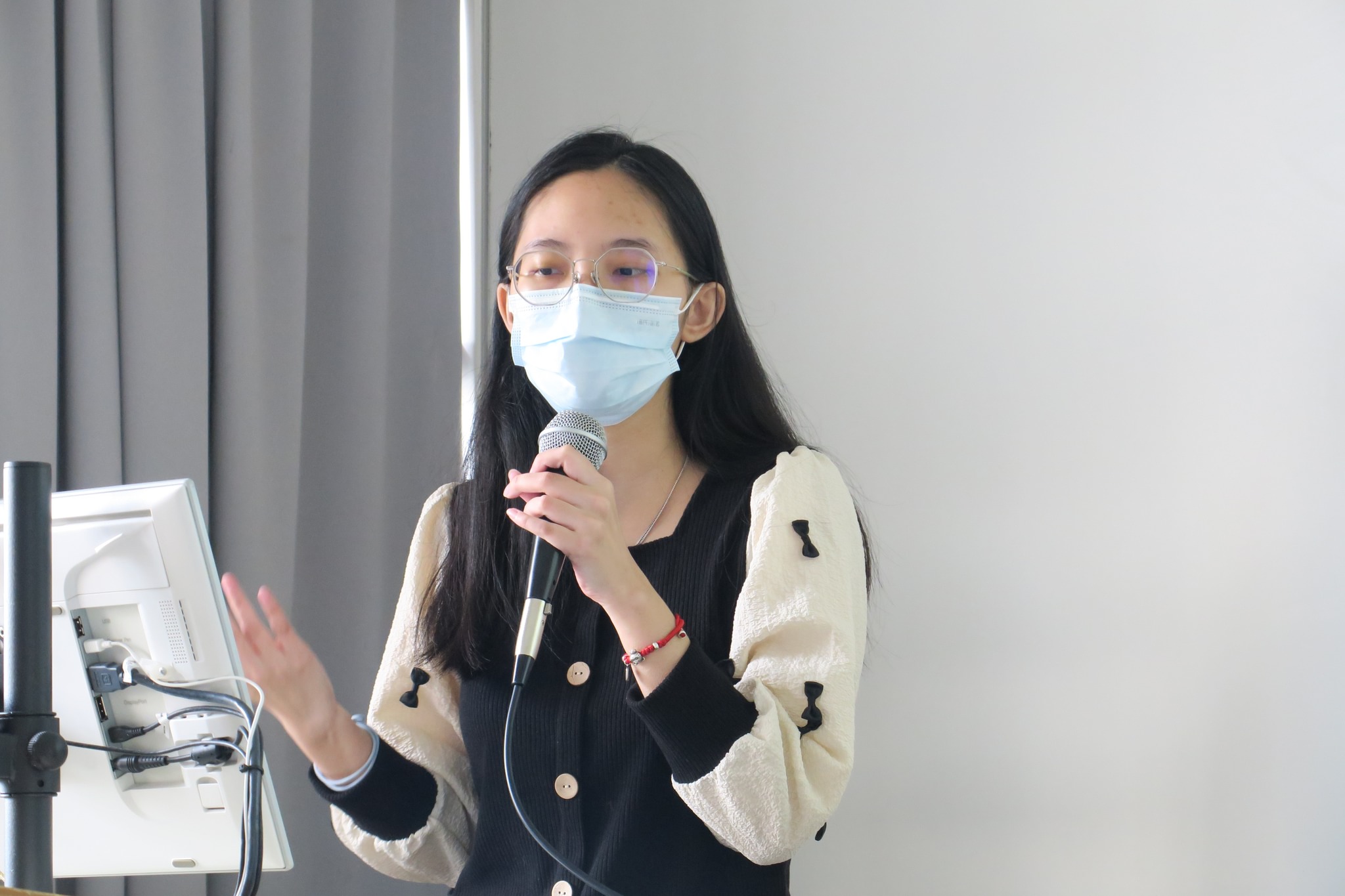 |
3月15號的週三性別研討會由香港中文大學性別研究的MPhil同學鄭林主講,題為《撒嬌攻:耽美小說中的親密關係幻想與對陰柔氣質的再賦義》。主持人譚佳教授對講者和題目進行簡要介紹後,研討會正式開始。
耽美小說是女性作者寫作的、以女性讀者為預設接受群體、以女性慾望為導向的、主要關於男性同性之間的愛情或情色故事。20世紀末期,這種始於日本的流行文化逐漸流向港台,並最終傳播至中國大陸地區。自2007年後,網絡文學的商業化轉型形塑了大陸耽美小說銷售創作和消費的環境,付費、高更新頻率、長篇幅等體制和機制上的變化使讀者成為主導內容走向的核心因素。
為了更快捷地滿足更普遍的受眾慾望,創作者試圖通過提煉人設和cp模式對文本進行高度類型化,幫助讀者進行更精準的消費。人設和cp模式的存在使耽美小說的創作趨近於東浩紀所提出的數據庫/資料庫寫作,即一種以人設為核心的故事生產模式。通過構成一個龐大的數據庫系統,作者可以利用人設中令人產生喜愛情緒的“萌要素”組合產生角色,進而形成了與傳統小說(即以情節為中心)相對的角色小說(即以角色為中心)。耽美小說受眾會根據類型反復消費角色在文本中呈現的親密關係模式,也憑此寄託親密關係理想。
通過文本分析與參與式觀察,鄭林認為,撒嬌攻一類更具陰柔氣質的人設和cp模式的流行,折射出當代女性對於自身在親密關係中弱勢地位的焦慮和對話,也是一個生產出新語義的自反性過程。通過描寫攻方的表現情感依賴並促使受方消除對陰柔氣質焦慮的行為,作者改變了撒嬌原本作為貶損的、弱勢的、人身依附性的、提供情感服務的語義,使撒嬌不再被緊密地綑綁在女性或親密關係中的下位方。對撒嬌的再賦義,不僅給予了陰柔氣質自身更多積極意義,也是對相異於男性價值體系的女性價值坐標的再思考。
撰文: QIAN, Xiaoxuan
本期研討會的題目是《撒嬌攻:耽美親密關係幻想與對陰柔氣質的再賦義》,主講人為香港中文大學性別研究專業的碩士鄭林。
首先,鄭林介紹了耽美是一種主要由女性創作和消費的、有關男性同性愛情與情色的文化。 在當代中國,耽美文化主要以網路小說為載體,經歷了由亞文化向流行文化轉變的過程,並在商業化領域取得了成功。
當下耽美小說在發展過程中逐漸主流化,即由最初的以書寫帶有越軌色彩的同性情感,轉變到借用“男男相戀”來表達女性的理想親密關係。 她將耽美創作與消費形容為「一場由多人參與的,遵循社群內部的基本共識,且致力於探索親密關係相關問題的大型思想實驗」,實際上是在「反復驗證和遴選理想的親密關係樣態的過程」。
隨後,她介紹了耽美文化中的「攻」的概念,即同性性行為中的插入方,通常被視為更加具有男子氣概的存在,反之則為受。 攻比受弱的情況很少出現,但目前更具陰柔氣質的攻方很流行。 這正是她的研究問題:以「撒嬌」爲代表的陰柔氣質如何通過耽美「萌文化」和話語實踐被重新賦義,以及這一賦義行爲如何試圖回應當下的親密關係困境。
結合具體案例,鄭林介紹了撒嬌的定義與使用場景,認為在作品中呈現出的對強的執念和對弱的恐懼,側面反映出當代女性的花木蘭式困境,即:當女性不再輾轉、緘默於男權文化的女性規範的時候,男性規範自身成了絕對的規範。 但當耽美小說中「撒嬌」不再被緊密地捆綁在親密關係中的下位方身上,陰柔氣質不再與汙名化、客體化等負面標籤綁定,這就實現了對以「純粹的陽剛氣質」建構起的主體性的反思和解構。
撰文: ZHANG, Yue
15 Feb 2023 (Wed) Penalty, Bonus, or Needs: Family Care Responsibilities and Work in Three Labor Regimes of Chinese Societies
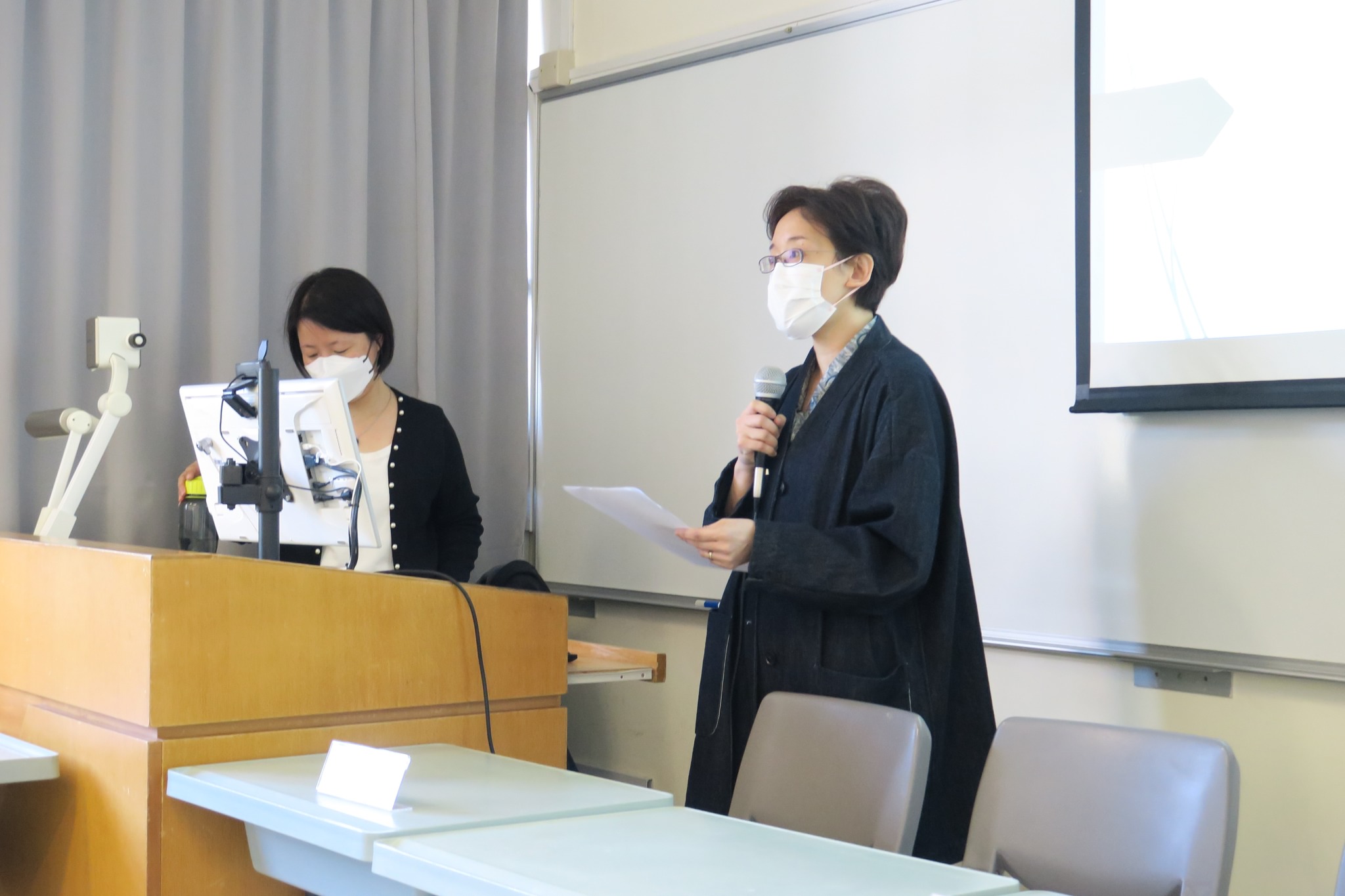 |
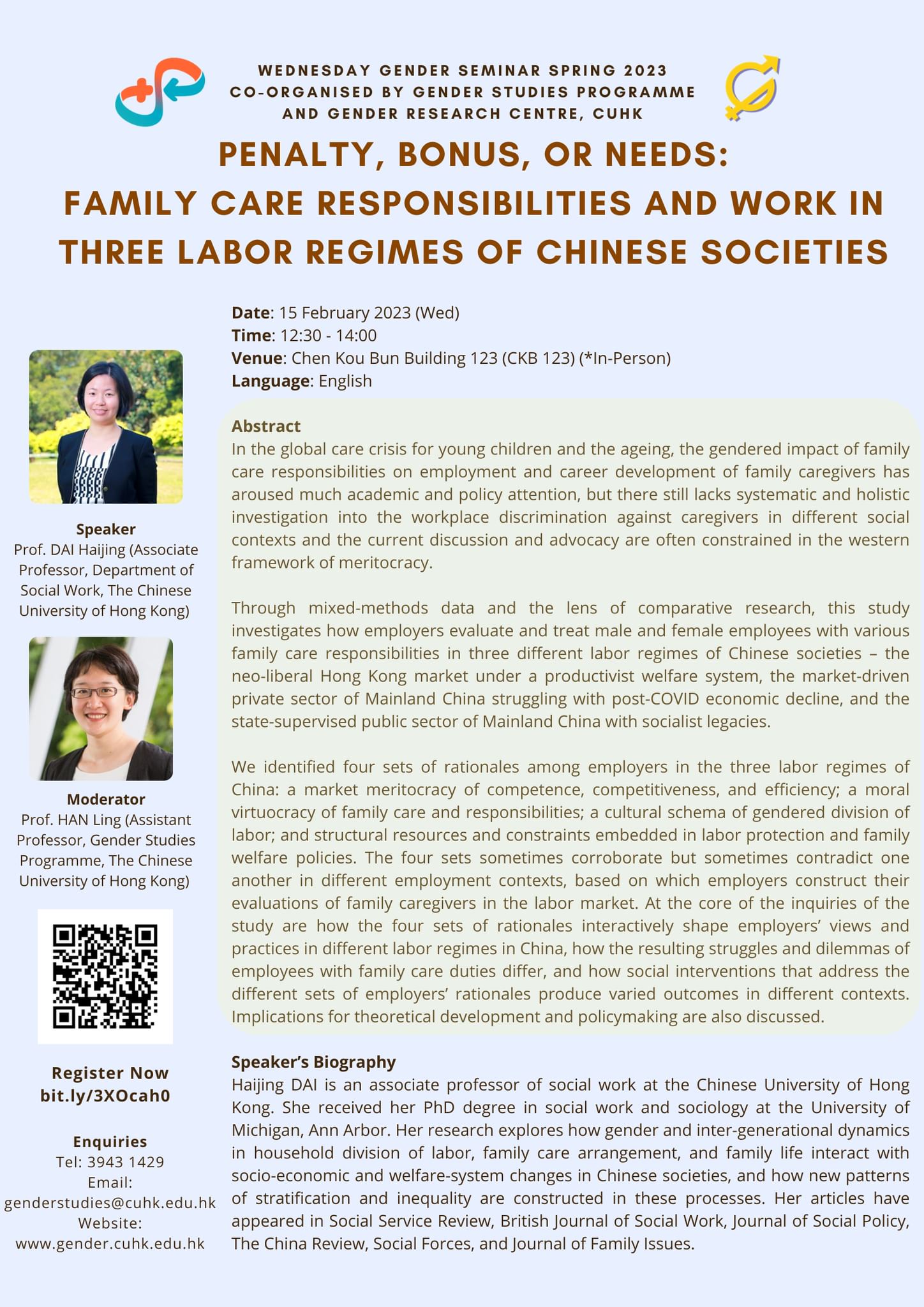 |
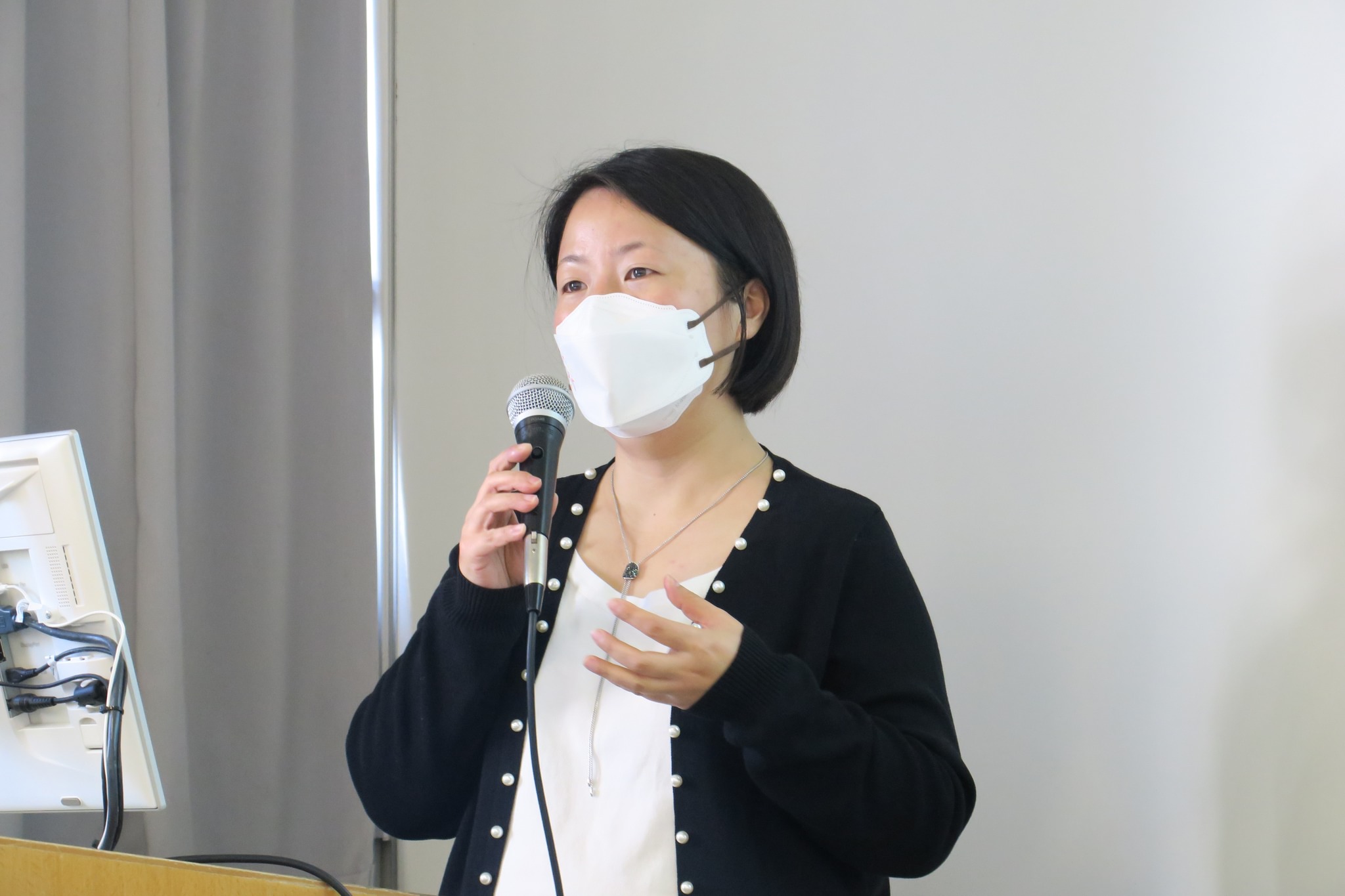 |
在2月15日的週三研討會上,來自香港中文大學社會工作系的戴海靜教授分享了名為“獎懲或需求:中國三種勞動制度中的家庭照料責任與求職”的研究。戴海靜教授採用定性與定量混合方法,對香港、深圳國有單位、深圳私營企業三地人力資源從業者進行問卷調查與訪談,以探討雇主如何評價及對待承擔不同家庭照顧責任的男性與女性求職者。研究發現,強調能力、競爭力與效率的新自由主義市場機制,注重家庭責任的中國傳統道德體系,父權制框架下的性別規範與性別分工,以及勞動者權益保障政策與家庭福利政策的結構性資源與約束,四種機制共同作用,導致家庭照料責任對就業與職業發展產生性別化影響,並在三種不同勞動制度下有所區別--就香港這一自由經濟體而言,男性會因承擔家庭照料責任而獲益,而與之相反的是女性求職者所面臨的母職懲罰;對於經歷疫情後經濟衰退的深圳私營企業,出於對效率的強調,承擔家庭照料責任對男性和女性求職者都將面臨更多質疑;而獎懲之說似乎並不適用於強調集體效能的深圳國有單位。
撰文: GU, Yuxuan
如何兼顧工作與照顧兒童、長者等家庭成員,向來是個讓人頭疼的問題。本港街頭及媒體不乏照顧者的廣告,有的來自非政府組織,有的則是政府宣傳,無一例外均是呼籲公眾多關心和支援家庭照顧者。
香港近年接連有照顧者懷疑不堪壓力,釀成倫常慘案。有鑑於此,當局由本年度起,展開為期三年的宣傳活動,舉辦照顧者為本的計劃和公眾教育項目。大中華地區乃至全亞洲的家庭照顧者危機,可見一斑。
本次分享的戴海靜教授指出,箇中原因或許與人口老齡化、勞動力短缺、少子化、女性覺醒有關。而新冠疫情下,幼稚園等暫托機構遭勒令關閉,照顧的責任再次落到家人(尤其是女性)的身上,照顧者危機進一步惡化,亟需更多關注。
以往一般認為,母親的身份在職場構成劣勢甚至懲罰,具體表現為薪酬的性別不平等。市場認為照顧者缺乏競爭力,對女性照顧者的歧視尤為明顯,而目前的研究較少從僱主的角度開展,戴教授認為這是學術方面缺失的一環,因此決定由此出發,採用基於履歷表的調查,配以訪問等方法,研究三個不同的市場領域,即香港以及深圳的公私營界別。
本港有較完善的福利制度,奉行不干預的新自由主義,而且1997年主權移交後出現了儒家思想復興,更重視家庭。分析數據後,戴教授發現本港職場不論公私界別,都認為照顧家庭是美德,也是可靠的象徵。然而,僱主仍然不偏好母親,因而她們在零售業等初級職位較受歡迎。在評判男性工作能力時,僱主多以專業為標準,而對女性則會同時考慮工作專業以及照顧職責。相比兒童照顧者,僱主更願意聘請長者照顧者,他們不覺得這是歧視,因為他們認為當母親是個人選擇,照顧長者則不是。香港僱主普遍不歡迎延長產假和帶薪家庭假,認為家中長者及兒童等應該由老人院舍等機構照顧。
據我個人了解,近年不少港人外移,本港多個行業確實正面對人力短缺問題,當局曾表示釋放女性勞動力是可行方向,有社企更專門協助「全職媽媽」,以彈性工作模式重返職場。
而在深圳,私人企業普遍追求利潤,往往忽視保護勞動權益。僱主認為照顧者對工作並不用心,不歡迎兒童、長者的照顧者,不論性別,都充滿敵意,不過大公司會較寬容。深圳私企認為員工應該自己找人照顧家人,例如祖父母,也認為照顧責任是家事,基於公私分明的原則,不應在職場提起。他們認為市場應該不受管制,更明言從不理會勞工法例,否則沒有公司能營運下去。在僱主眼中,二孩、三孩政策破壞勞動市場,認為給照顧者提供現金資助是政府的責任,而不是企業本身。
相比之下,深圳的政府和事業單位等公營市場,情況則更有意思。鐵飯碗不怕丟,不過薪酬較低。僱主對於員工的評核,並非以個人為單位,而是看整個團隊,重視團隊精神及意識,強調和諧、互惠、合作,而非競爭,也恪守勞工法例,尊重員工的各種需要,包括照顧家庭的責任。僱主不歡迎45歲以上沒有家庭照顧責任的人選,有的尤其不喜歡30歲左右沒有孩子的女性。政府及事業單位認為,女性員工若希望懷孕,應該有計劃、按部就班,否則產假期間無人可以頂替工作,大失預算,因此他們不喜歡員工沒有提前通知便突然懷孕。總之,他們認為員工應該知道,要鐵飯碗,便要有很多的權衡取捨,譬如低薪、生孩子要「排隊」。
戴教授認為,日後的研究應更關注勞工制度、僱主的想法、社會福利制度。家庭究竟是公共抑或是私人領域?我們的社會需要的是更好的父母或是更好的僱主、體制?照顧責任應是一體的、協調的,僱主也應當參與其中,讓兩種「生產」(創造production與生育reproduction)不再對立。
撰文: CHEN, Shujun
18 Jan 2023 (Wed) Tokophobia as Feminist Resistance? Female Netizens’ Reproductive Experiences and Discourses in China’s Cyberspace
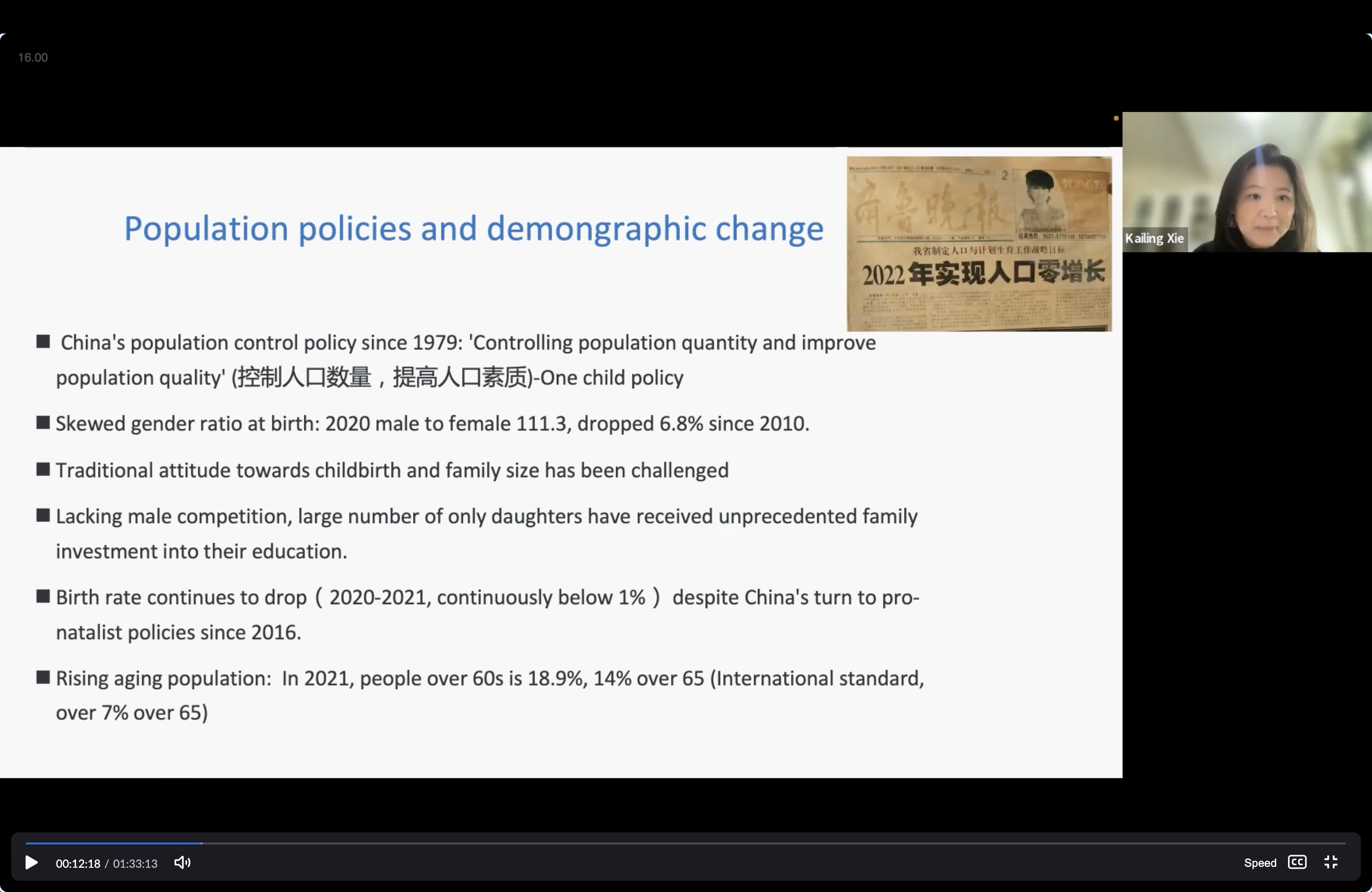 |
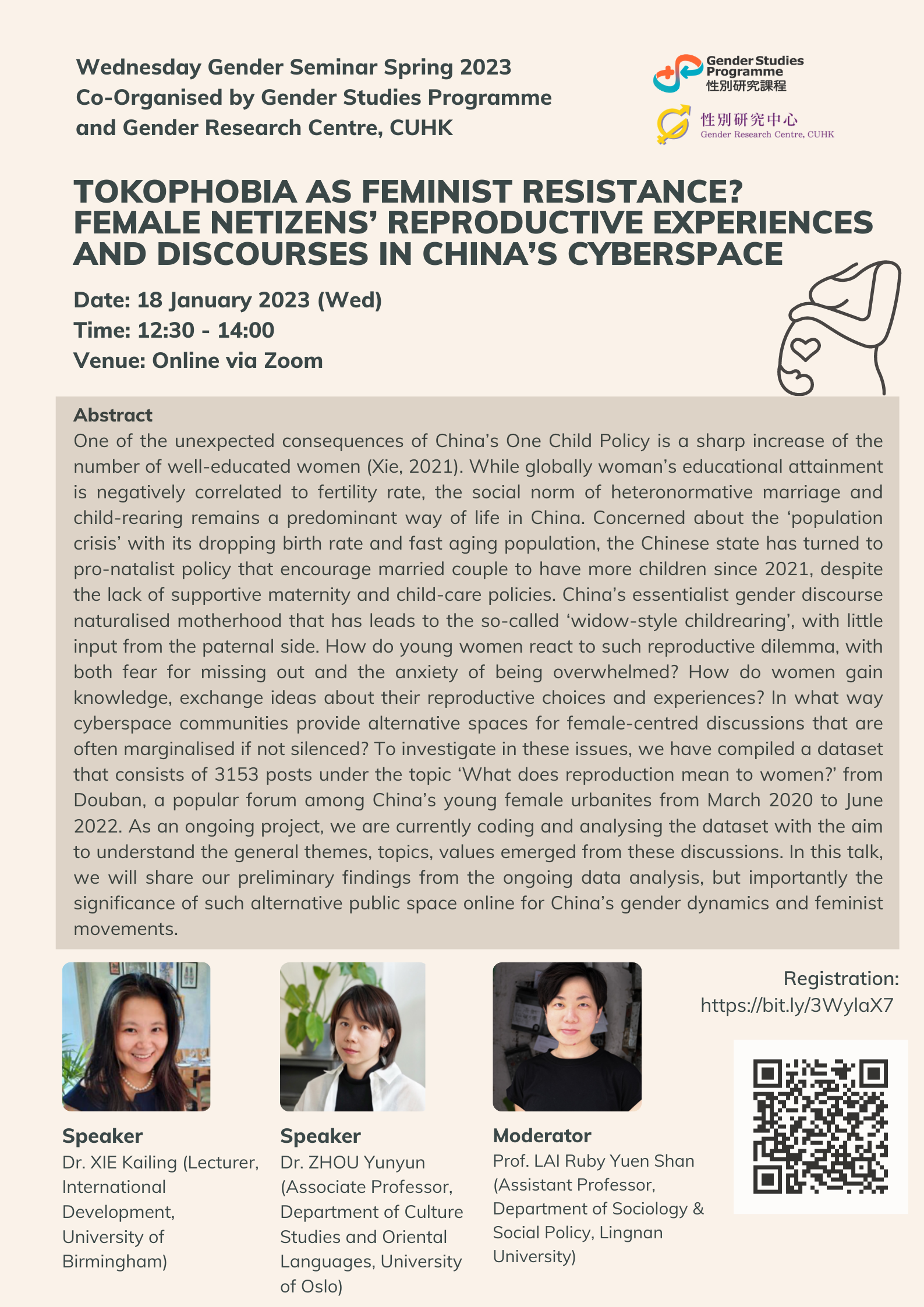 |
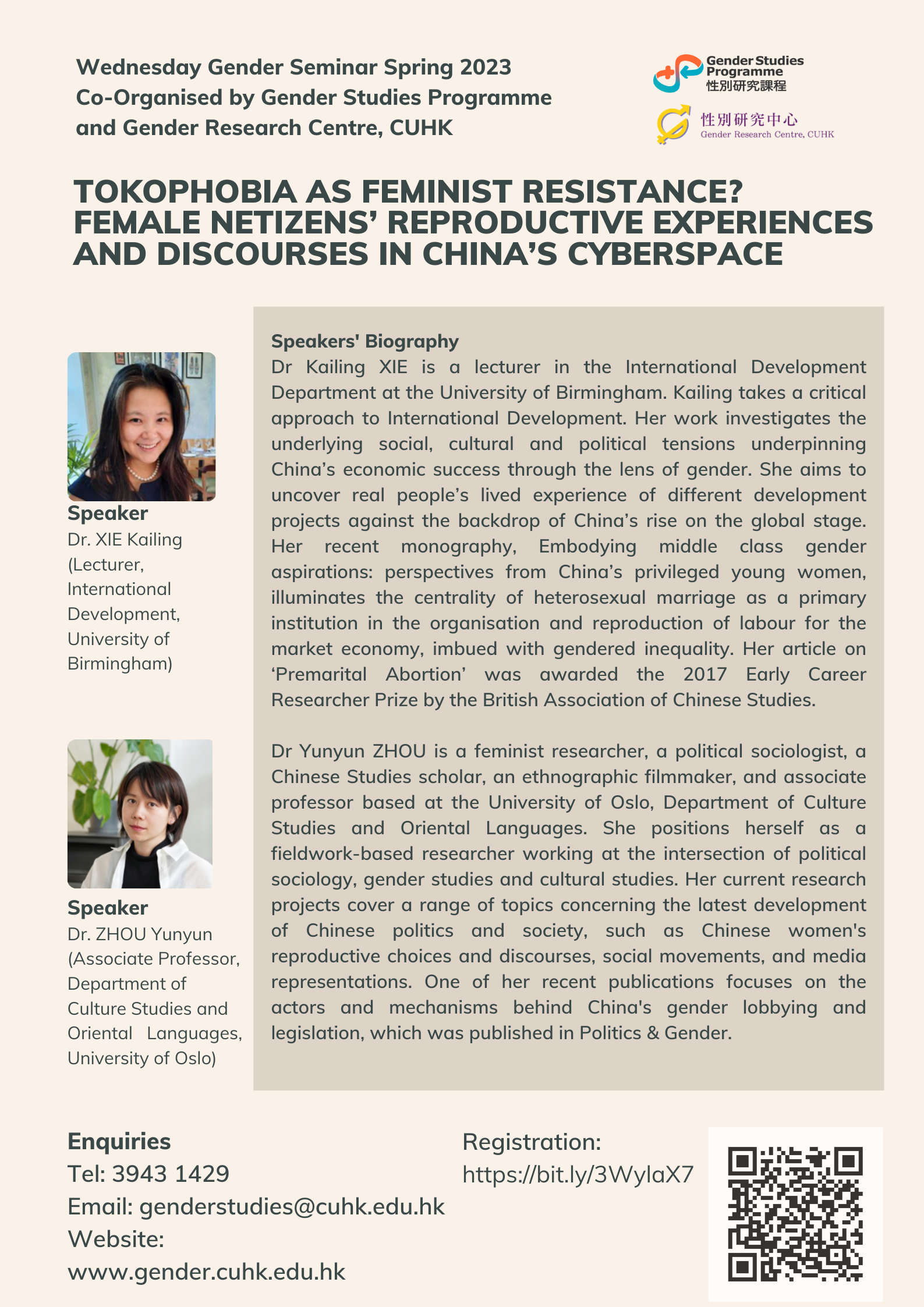 |
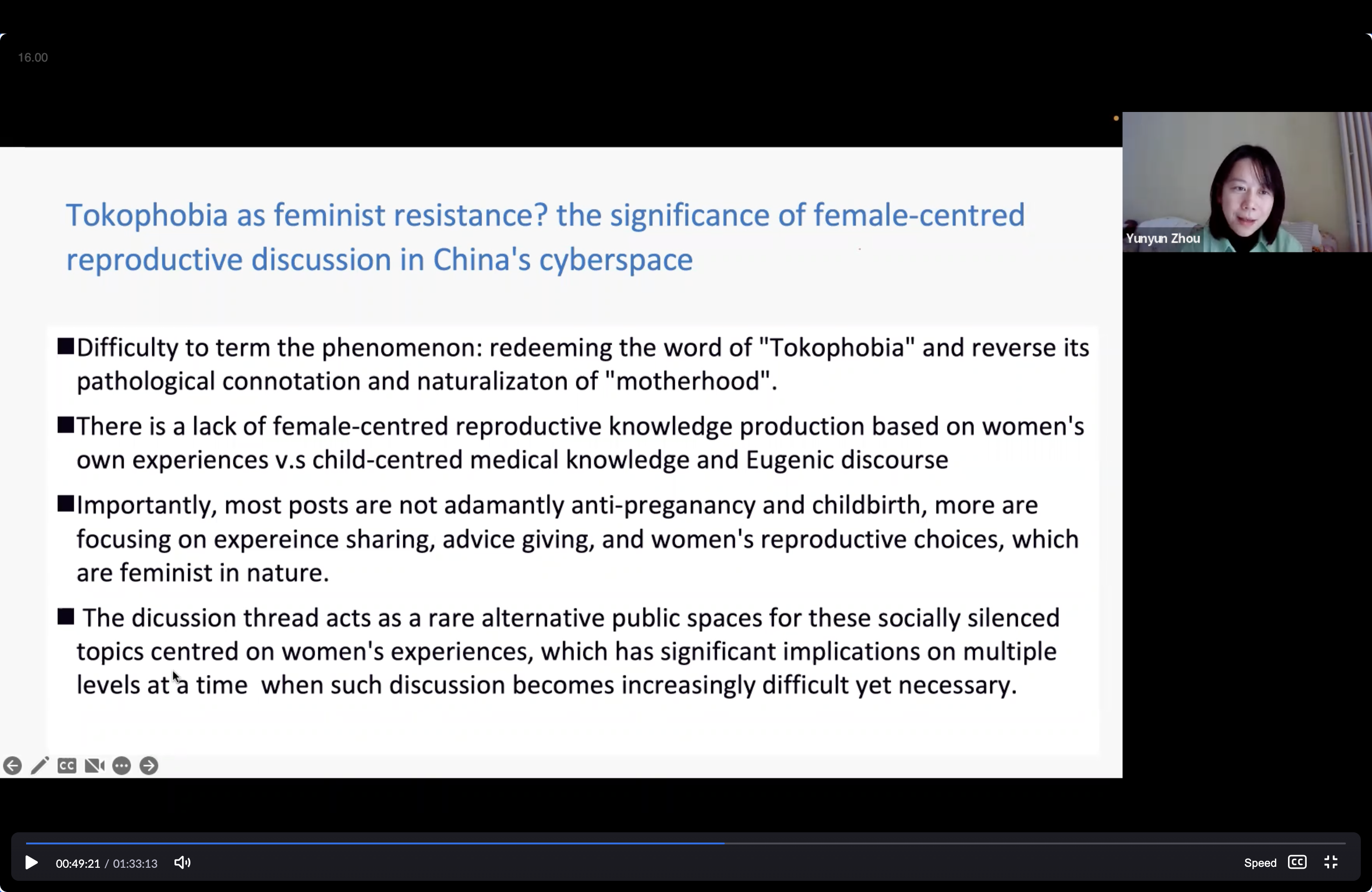 |
Gender inequality related to reproduction is a global issue, and the personal and family spheres, as objects of power control, make individual choices often the result of internalized power structures and gender norms. With the rising number of well-educated women with university degrees and high female labor participation, the fertility rate continues to drop in China. Concerned about the demographic change and the population crisis, the Chinese state turned to pro-natalist policy since 2021, despite the lack of supportive maternity and child-care policies.
This study focuses on young women’s reproductive dilemma posed by patchy patriarchy’s essentialist discourses and their individual desires. It further demonstrates the characteristics of the public cyberspace where women gain knowledge, exchange information and express their opinions about their reproductive experiences. This study also explores the role cyberspace play in shaping gender discourses in contemporary China. Conducted on Douban, a popular forum among Chinese urban young women, the study collected 3153 posts under the topic ‘What does reproduction mean to women?’ and analyzed the most “liked” 100 posts with thematic coding.
The findings suggest that discussions on Douban are predominantly focused on negative experiences of new motherhood. Women are physically and emotionally dehumanized in the process of pregnancy and childbirth. Due to the patriarchal family value and the essentialist gender discourse, motherhood is naturalized and romanticized, which has led to the ‘widow-style childrearing’ and the sacrifice of female individuality and professional career. As a result, in the absence of public support, women have to rely on private sources to address emotional issues and access female-centered reproductive knowledge. The phenomenon of tokophobia presented in online discussions is a resistance to naturalized motherhood. The discussion of childbirth in cyberspace has brought the invisible labor undertaken by women into the public sphere, which is feminist in nature.
撰文: ZHANG, Mengya
1月18日,Xie Kailing 博士和 Zhou Yunyun 博士在線上性別研討會上講演了兩人正在合作進行的研究——「恐育作為女權抵抗?中國網絡空間中女性網民的生殖經驗和話語」。兩位研究者首先勾勒了研究所處的中國語境,中國獨生子女政策使得女性獲得高等教育的機會大大上升,雖然在全球範圍內,婦女的教育程度與生育率呈負相關,但在中國,異性戀婚姻中女性養育子女仍舊是一種具有道德強制力的社會規範。兩位研究者借用 Evans 所提出的「支離破碎的父權」(patchy patriarchy)這一概念,認為將女性生育職責「自然化」、「本質化」的話語仍舊具有某種權威性,成為國家推行政策時的話術,並在公共文化生活中,例如在售賣母嬰用品的廣告中被不斷地生產和傳播。隨著出生率下降帶來的老齡化危機的初現,自2021年起中國政府轉而採取支持生育的政策,女性面臨著愈受嚴峻的生育壓力。而市場經濟驅動形成的以慾望為核心的現代式的對「自我」的追求,以及中國近年來在年輕女性群體中愈受浩大的女性主義聲浪則進一步成為引發女性在網絡空間中關於生育激烈探討的契機。為了探察受過良好教育的年輕女性對這一生育困境的回應,以及網絡空間在這種生育困境討論中的作用,兩位研究者對熱度極高的豆瓣主題帖「生育對一位女性意味著什麼」進行了的話語分析。在以主題式編碼為主的初步話語分析中,研究者們發現大多數的話語都圍繞著生育的消極體驗及其作為一種「被掩蓋的黑暗秘密」展開,並進一步展示了話語群中三個顯著的主題:生孩子作為一種肉體和情感上的雙重創傷;「喪偶式育兒」剝奪了女性的個體性;缺少女性中心的知識生產和對父權制結構的反思。在講演的最後,研究者們進一步指出了這一現象的複雜性:回帖中沒有出現明顯的反對生育的聲音,而是更多地集中在經驗分享,給予建議和女性的不同的生育選擇上,儘管帖子的發表者們並沒有明確自我表明女權主義立場的傾向,但她們關注和討論著與女權主義緊密相關的議題。研究者們認為,網絡空間提供了一種另類的公共空間,使得在社會空間中被迫靜默的女性經驗相互溝通,女性話語得以建構。
撰文: ZHENG, Lin
2022年秋季
香港中文大學性別研究課程、性別研究中心合辦
16 Nov 2022 (Wed) The interplay between intimacy and commodification: Exploring family and work lives of lesbians in China
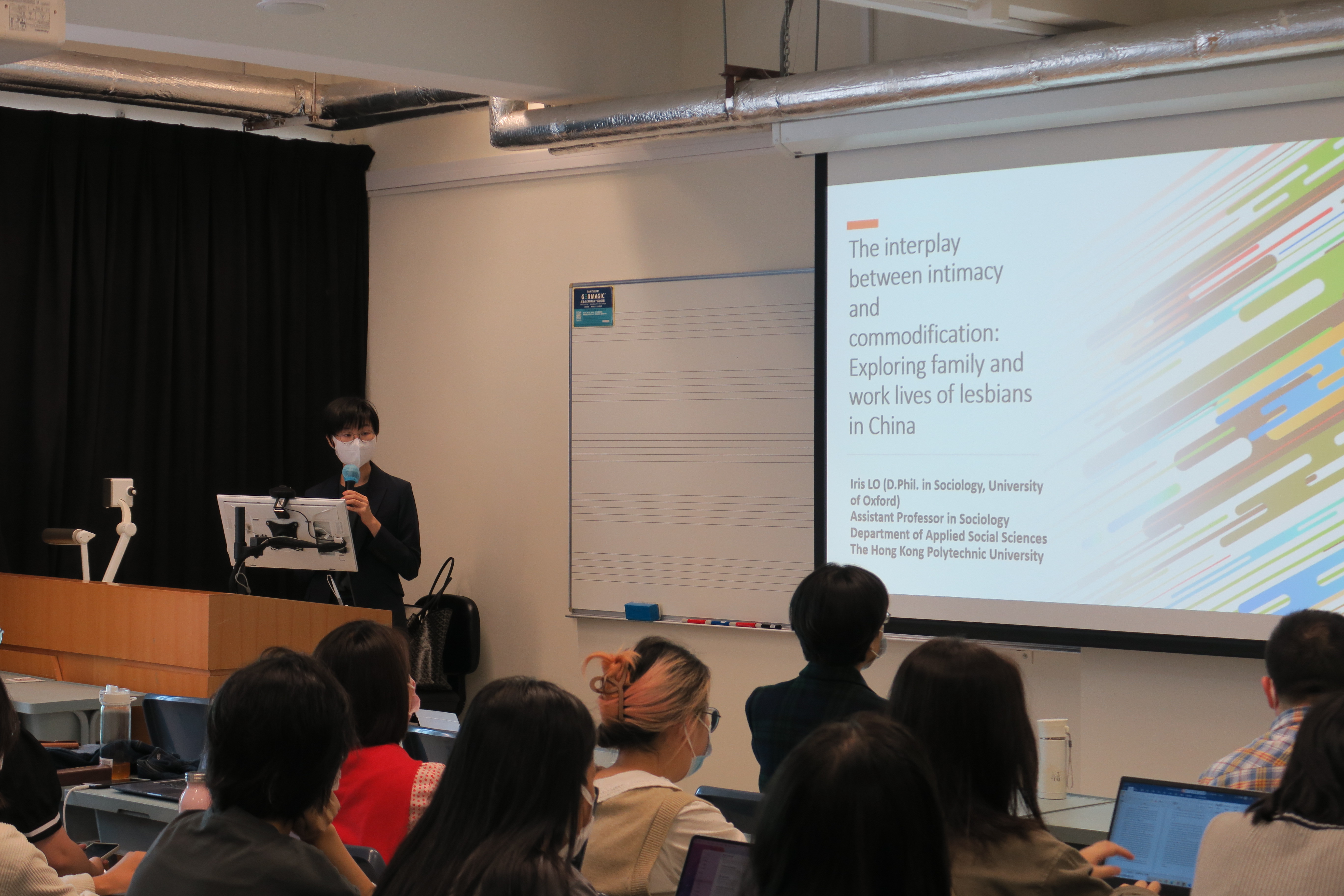 |
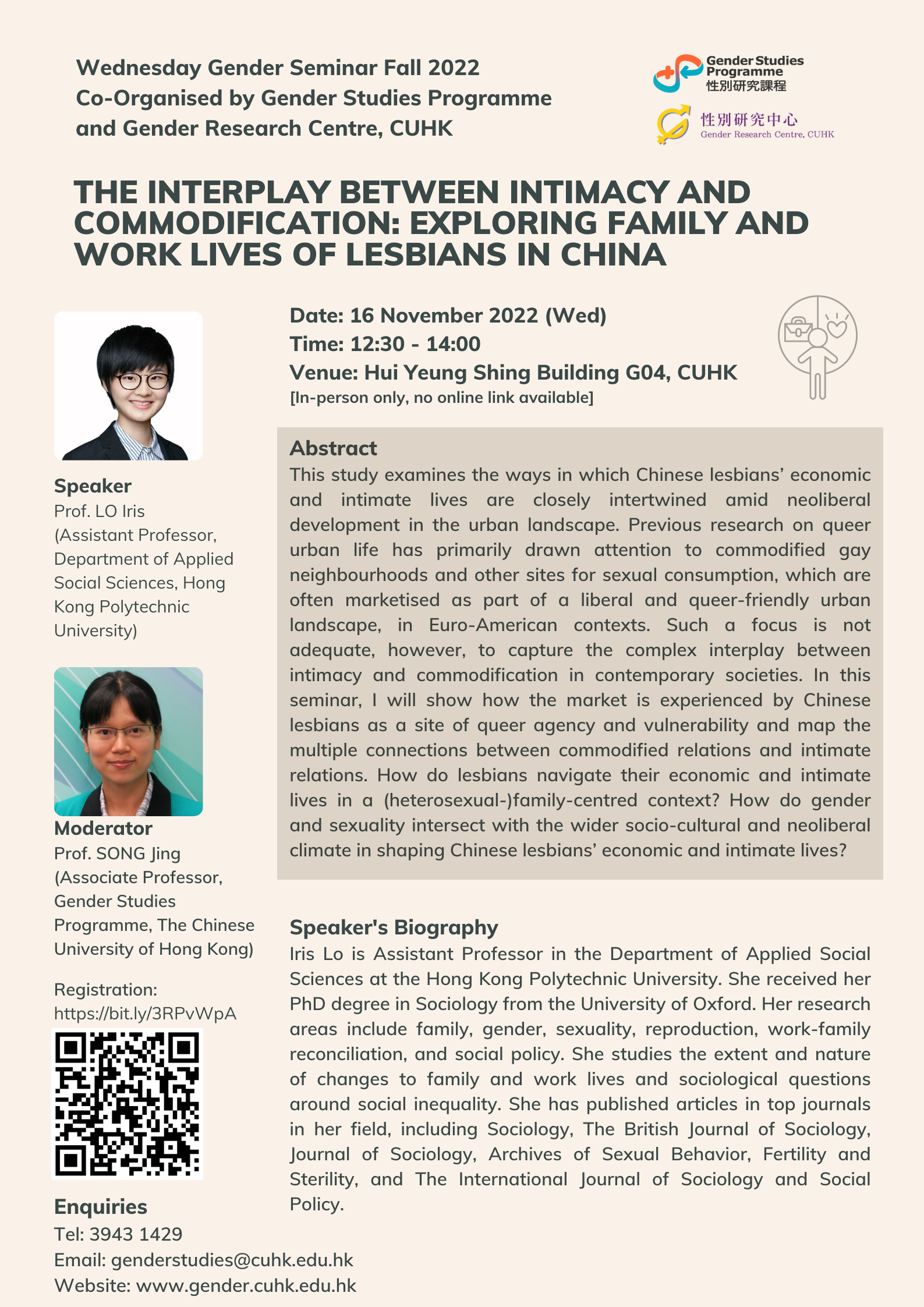 |
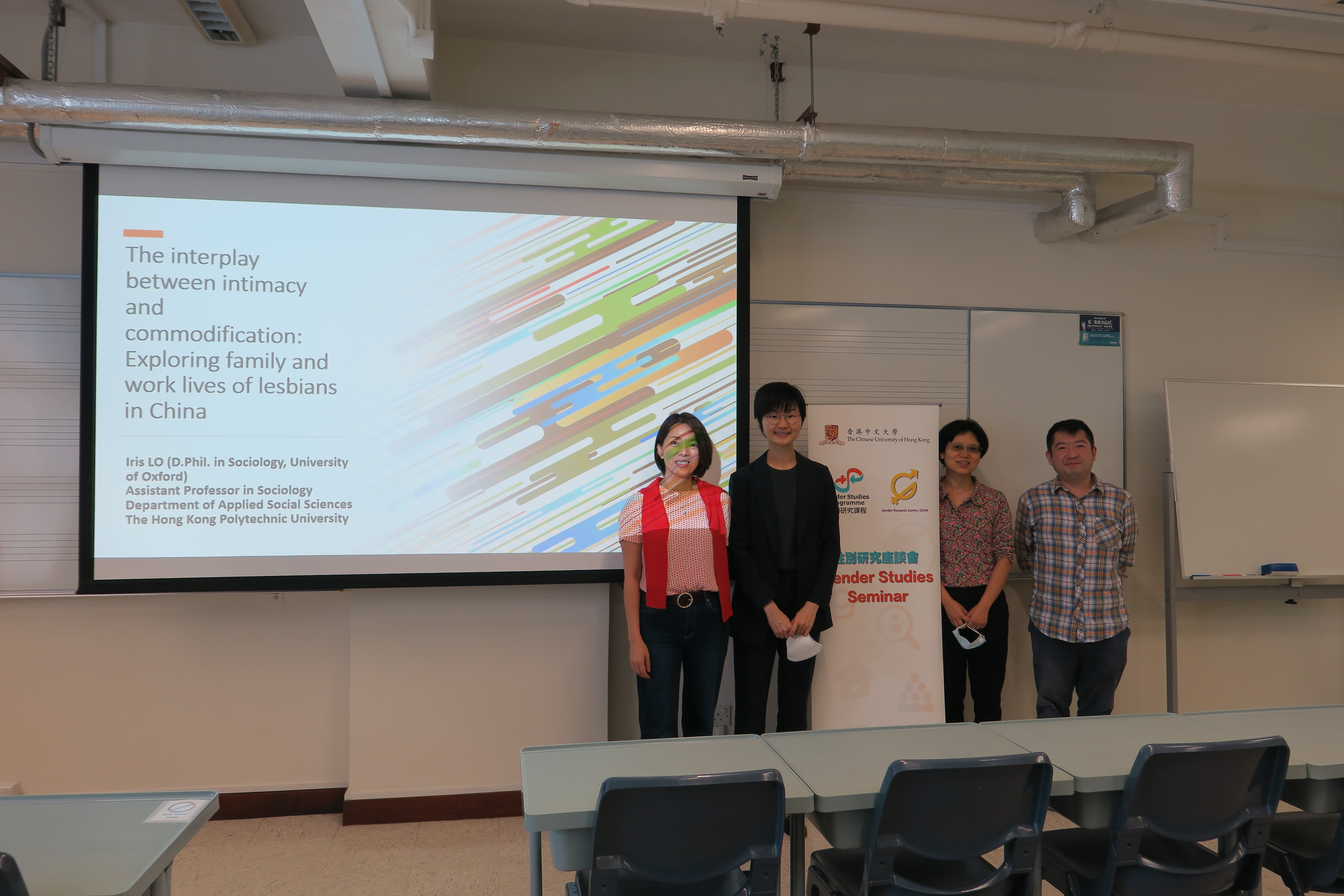 |
Prof Lo’s presentation examines the ways in which lesbians explore opportunities and navigate constraints in their family and work lives in urban China. Research reveals that the interconnection between the economic and intimate life of lesbians in modern cities is commodified. They not feel empowerment through navigate lives in work and pink market as resourceful consumers, but also intersecting with sociopolitical and neoliberal power with their everyday practices on a larger background.
Although the respectable queer citizens could make relatively free expression of their sexual identity through the consumption of commodities and capital, opportunities to subvert traditional gender expectations carry a high price tag, which could be unaffordable for many economically disadvantaged lesbians. The hidden danger here is that commercial logic may cover personal voice. That is it transforms feminism from a political movement to a non-politicized product and personal attitude. And the paper also point out that lesbians also face the hinders in the labour market. Except from fashion field, in which sexual minorities have their own traffic(自带流量). In most workplaces, lesbians are cautious about disclosing their sexual orientation because of the fear of discrimination and prejudice. It inspire us to think how gender norms, heteronormativity, and policy intersect in generating obstacles for Chinese lesbians to thrive as respectable adult workers. This has important implications for further attempts to help adult worker to fit better with people's diverse work /family needs.
Despite from everyday practices and interactions,there’s also need to observe the penetration of digital media into daily life. And it is easy to find that in many mon-homosexual-oriented social media software in China, lesbians have less visibility compared with gays, which is similar to the second point of the article's research gap.
撰文:XU Yinuo
On November 16, the topic of professor LO’s speech was the interplay between intimacy and commodification by exploring the family and work lives of lesbians in China.
She began her speech with the research objectives and the research question, which were how do Chinese lesbians navigate their economic and intimate lives in a context where same-sex relationships are yet to be socially or legally recognized, and how do gender and sexuality intersect with the wider socio-political and neoliberal climate in shaping Chinese lesbians’ economic and intimate lives. The main research gaps were underground queer scenes in more restrictive contexts, everyday practices in commodification and sexuality, and Chinese lesbians.
After introducing the challenges and opportunities of the queer community, the rise of queer desires, and the pink market, she told us her research method is an in-depth interview about well-educated lesbians in Beijing. There were three findings. Firstly, participants' intimate lives are 'commodified', because their choices about intimacy and same-sex marriage are related to the workplace and pink market. Secondly, the ways they use to avoid gendered and sexual obstacles in the labor market by hiding or fictitious their sexual orientation, gender expression, and marital status are 'commodified’. Thirdly, most participants’ strategies to accommodate and/or resist established norms are finding their own comfort zone.
In conclusion, this research showed how commodification and intimacy interact with each other, and the dilemma of Chinese lesbians that they must get a decent job to have the life they want, but due to the gendered and sexual obstacles, they cannot openly lead the life they want.
撰文:ZHANG Yue
At the talk on 16 November 2022, Prof. LO Iris shared her project, "the Interplay between Intimacy and Commodification: Exploring Family and Work Lives of Lesbians in China." Based on the in-depth interviews with lesbians living in Beijing, she delved into the economic and intimate lives of lesbians in the Chinese urban landscape and weaved it with the political and neoliberal atmosphere in China.
She proposed that 1978 is the watershed compared with previously stigmatized, although not illegal, queer living circumstances, allowing the new exploration of queer subjectivities. Queer people were shaped by middle-class cosmopolitan values that encouraged them to pursue their material and emotional desire without transgressing social norms or challenging the limitation that the government set. During the interview, Prof. LO found that urban lesbians were eager to enter the labour market to gain enough money to become respectful citizens, capable workers, and resourceful consumers. And they expected this would bring them more freedom and subjectivity to their sexual orientation.
However, Prof. LO also found that the queer agency that the market brought was always intertwined with vulnerability. The strategies that lesbians adopted to sustain decent jobs providing the economic foundation for the life they wanted may also reinforce the gender and sexual orientation hierarchy. For instance, lesbians must be cautious about disclosing their sexual orientation in the workplace. They would try to hide their sexual orientation and pretend to be heterosexual. They would constantly come across the question of why they still stay single and even need to lie to their colleagues that they have got married to a heterosexual man or try to perform a traditional social script of femininity. Also, although they were determined to commodify their labour power, there was no guarantee they could earn as much money as expected since the gender wage gap still exists.
In the open discussion, several valuable and debatable points were highlighted. For instance, does the commodification in the research refers to labour or intimacy? Is the theoretical framework expandable to other Chinese intimacy phenomena, like dating shows? Is the concept of intimacy proper to explain the performance of gender norms and the interest in personal life in the workplace? Is earning enough money truly free lesbians from parents' expectations of heteronormative life?
撰文:ZHENG Lin
9 Nov 2022 (Wed) Employing domestic workers and gender gap in domestic labor among working parents: An effective strategy?
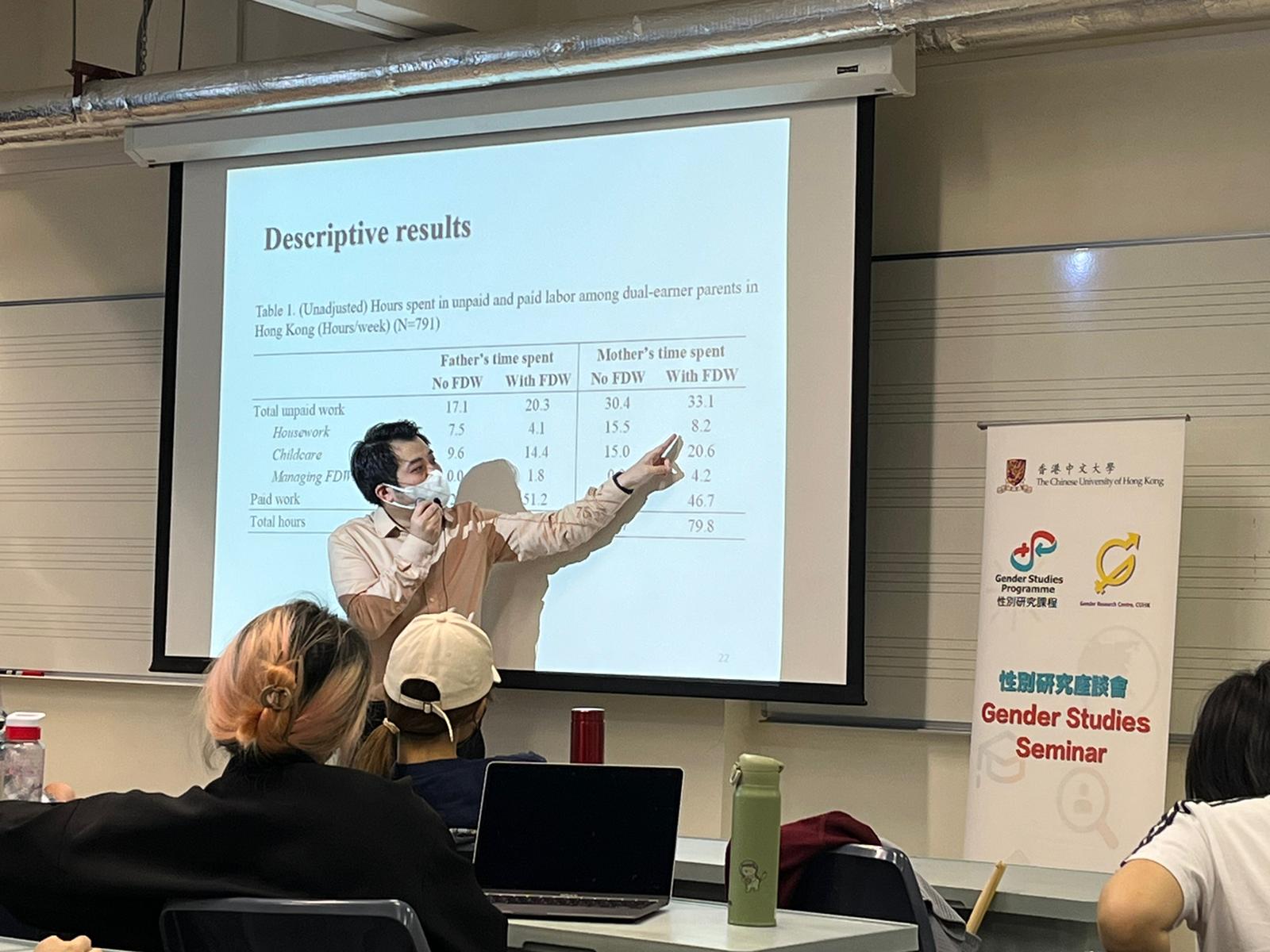 |
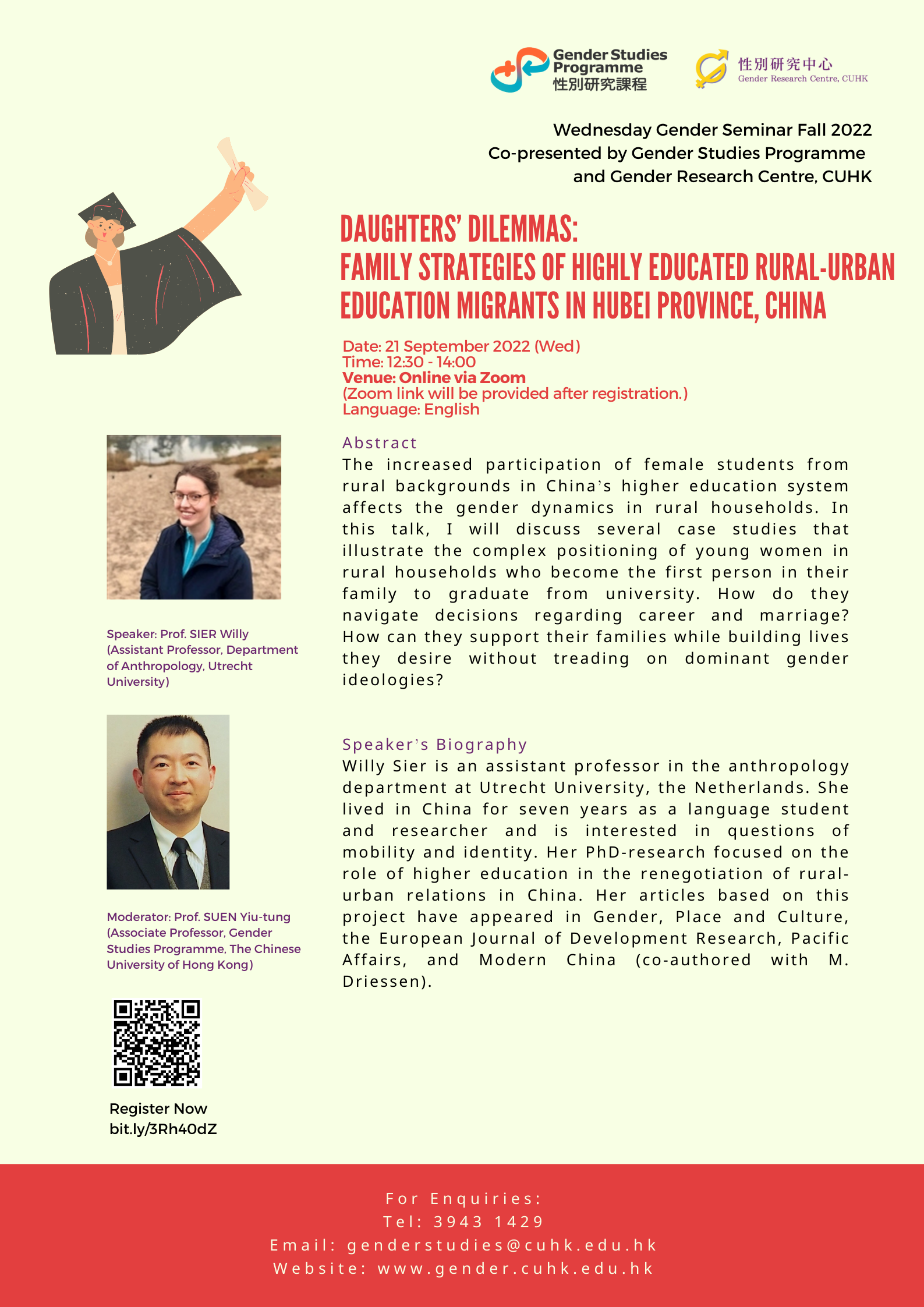 |
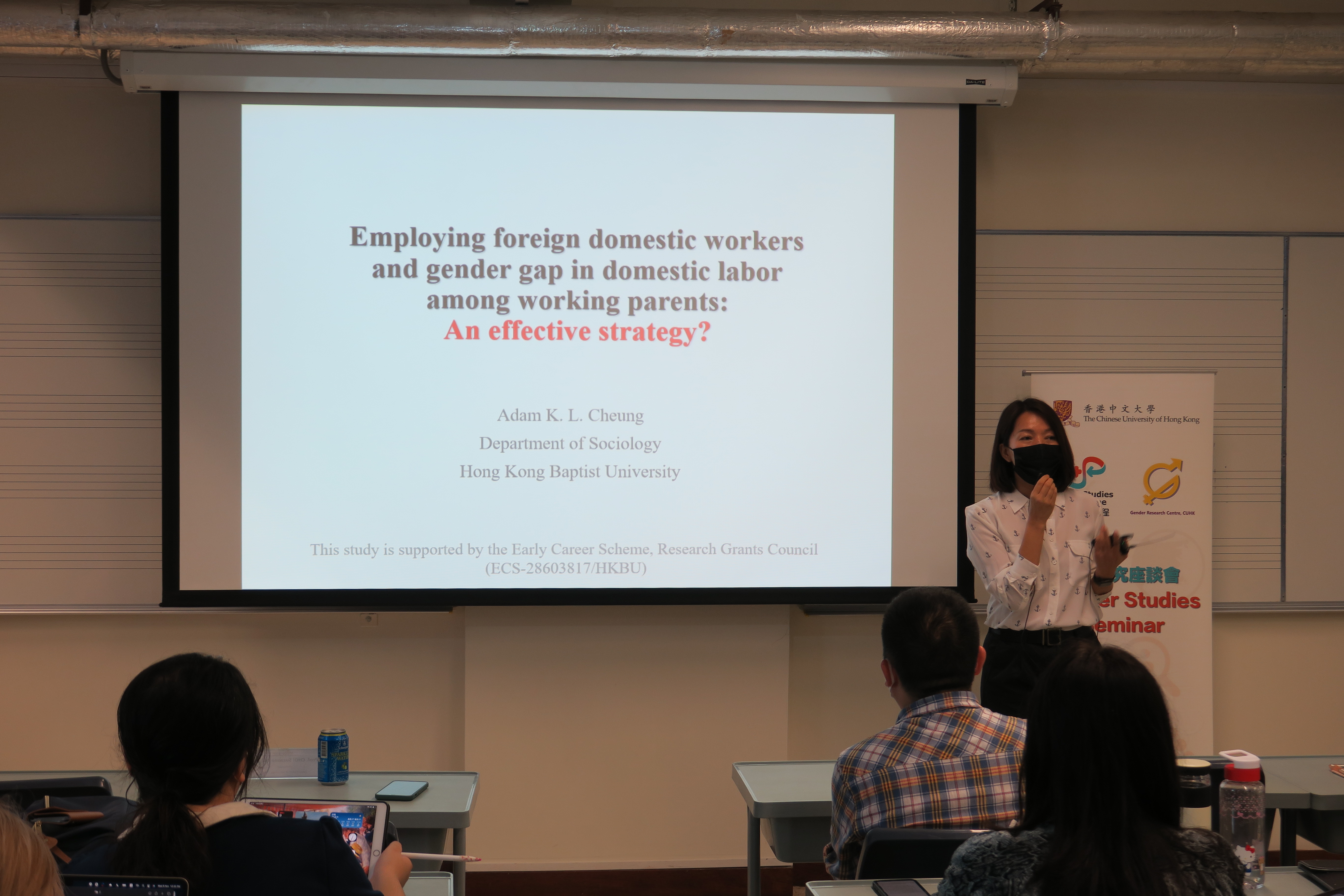 |
At last Wednesday seminar, Prof. Adam Cheung presented his research on how live-in foreign domestic workers (FDW) help reduce unpaid domestic labor for dual-earning parents in Hong Kong.
Consisting of 4-5% of HK population, FDWs play an unignorable role in HK society, and around 1/5 married population in HK live with a domestic worker. While research on FDWs’ living/working conditions flourished, limited studies have investigated the changes they brought to the employer families. Prof. Cheung therefore shifted the research focus to the hiring families. He also pointed out that, the well-established time-saving effect of the labor outsourcing nature of hiring domestic workers might not be applied to Hong Kong context for two reasons. Firstly, live-in domestic workers could generate more management tasks for the employers. Secondly, the prevailing intensive-parenting beliefs might hinder the delegation of all childcare tasks to the domestic workers, that is the delegation-involvement paradox. Instead, the time saved in housework might be taken up by the parents to do more childcare/management tasks, producing a time-displacement effect. As the emotional and communal nature of proposed new tasks, a gendered labor pattern might be expected.
Prof. Cheung’s study used a two-stage mixed-method design. The quantitative data of a representative sample of working parents (N=791, Nwith live-in help=265) suggested a time-displacement effect of live-in domestic help. Although paid help significantly reduced the time parents spent on housework, parents with live-in domestic workers spent around 3 hours more per week in unpaid labor than did those without paid help. The increased labor involved managing the domestic worker and childcare. The following in-depth interviews (N = 20) revealed parents’ subjective perception of the use of live-in domestic help as a strategy to achieve better parenting. In terms of gendered labor division, with a live-in helper, working mothers saved more time in housework but also had a larger burden of management and childcare than working fathers. No effect of hiring live-in help on diminishing gender inequality was founded, and working mothers had a higher total labor hours than fathers in both conditions.
撰文:TANG Xiaolei
Employing foreign domestic workers and gender gap in domestic labor among working parents: An Effective Strategy
The use of live-in domestic labor is popular among dual-earning parents. Around one-third of dual-earning parents in Hong Kong currently hire live-in domestic helpers. This study provides a critical examination of the time-saving hypothesis from the domestic outsourcing literature on the roles of hiring live-in help for household labor and situates the time-saving effect in the literature of intensive parenting. The research uses mixed method, analyzes quantitative data from a representative household survey to investigate the association between employing live-in domestic help and time spent by the working fathers and mothers on housework, childcare, and tasks related to managing domestic helpers, and also analyzes qualitative data from in-depth interviews of first-hand experiences about the role of hiring help in household labor to unpack the meaning of hiring help and its relationship with the notion and practices of parenting.
The findings suggest that the use of live-in domestic help is a specialization strategy to strive for perfection in parenting for parents. By outsourcing household chores and more routinized childcare tasks to the helpers, working parents, especially mothers, can focus on emotional bonding and tasks conducive to the development of their children. Working parents hiring live-in domestic work spent significantly fewer hours in housework, however, the reduced time in housework is totally replaced by the increased time on childcare and managing the helper. The time-saving effect of using domestic help is stronger for women than for men but it does not reduce gender inequality, mothers took up most of the new role of managing domestic helpers to deal with both household chores and routinized childcare work. Parenting strategies, though, are more intensified on the part of the mothers. The gender gap still exists.
撰文:ZHANG Mengya
Although there has been a lot of research on FDWs (Foreign Domestic Workers) in Hong Kong recently, Professor Cheung's research is very refreshing. Unlike other places of the world, Hong Kong has a tradition of employing live-in FDWs rather than flexible helpers for domestic outsourcing, which means that the former has a higher threshold, is more inflexible, and requires the employer's family to spend more time negotiating with and managing. Also, Hong Kong is a well-known city for its culture of intensive parenting. Many Hong Kong parents will consider hiring FDWs as a strategy to practice their intensive parenting.
Based on domestic outsourcing and intensive parenting, Professor Cheung has studied the time-use patterns between Hong Kong families with and without FDWS through a mixed-method of quantitative and qualitative research and has come up with conclusions that are different from previous research. He found that the time-saving effects of domestic outsourcing are overestimated, and the time-displacement fits Hong Kong’s condition more. In Hong Kong, hiring FDWS does save parents (mainly mothers) some time in housework, but the time of child-care and managing helper increase. Due to the expectation of intensive mothering, these two tasks are still gendered and mothers always do more, which indicates hiring help cannot enhance gender equality.
In my opinion, Professor Cheung's research perspective and findings are very inspiring. As someone interested in domestic outsourcing in mainland China, I have only focused on work-family time conflicts in the family, but not aware of the chores-childcare conflicts (especially for mothers). In addition, Professor Cheung also emphasizes the importance of the ideology of intensive parenting. In mainland China, the role of FDWs is usually taken by grandparents. However, after the abolition of extra-curricular classes, will parents' anxiety turn into a form of intensive parenting and prompt them to hire young educated helpers to do the child-care work? This is still underexplored and deserves our attention.
All in all, I really enjoyed this seminar and it gave me a lot of inspiration for my research.
撰文:ZHANG Xunyue
5 Oct 2022 (Wed) Gender Research Centre Orientation Talk: Honour Based Violence: Minority Women As Agents of Change
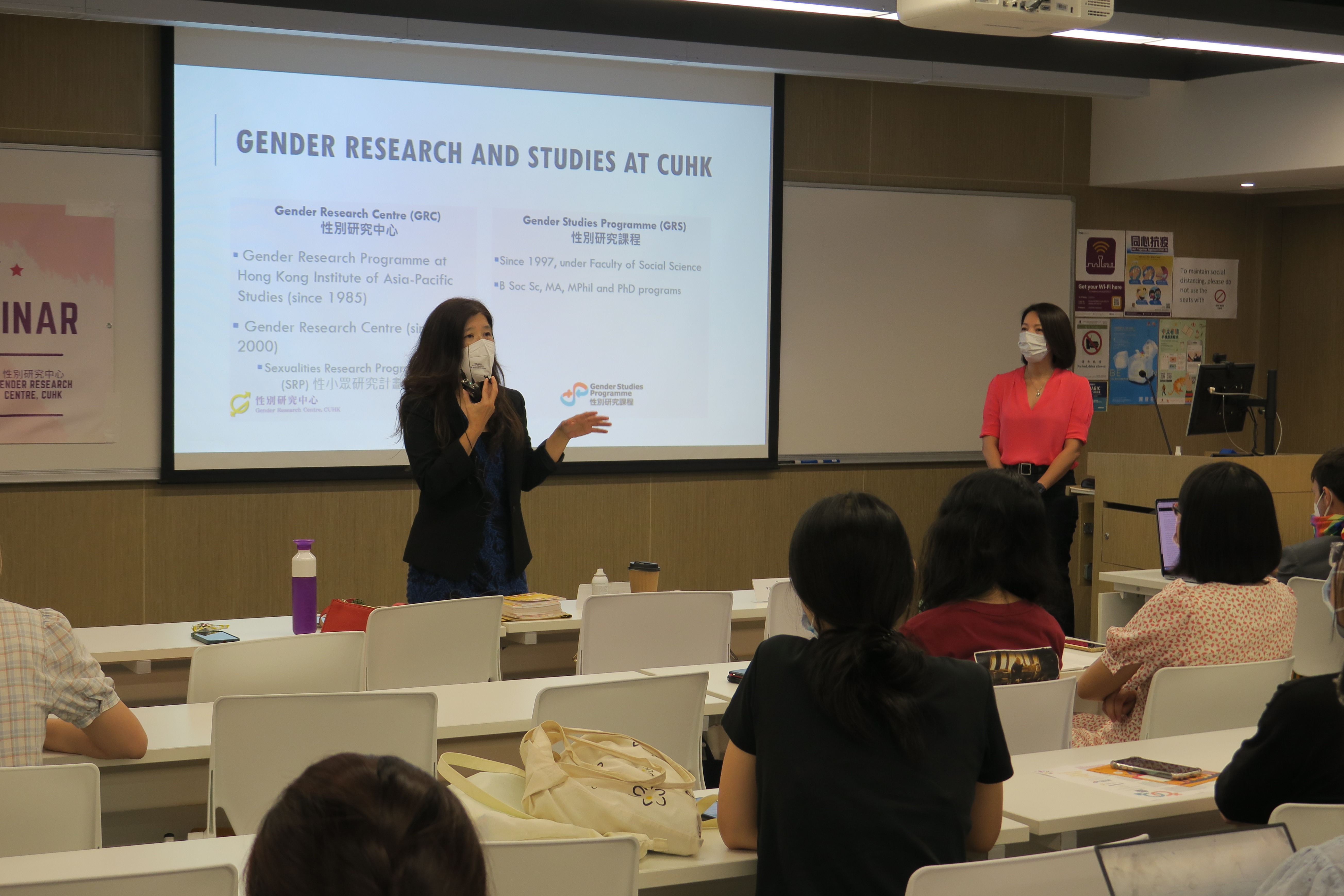 |
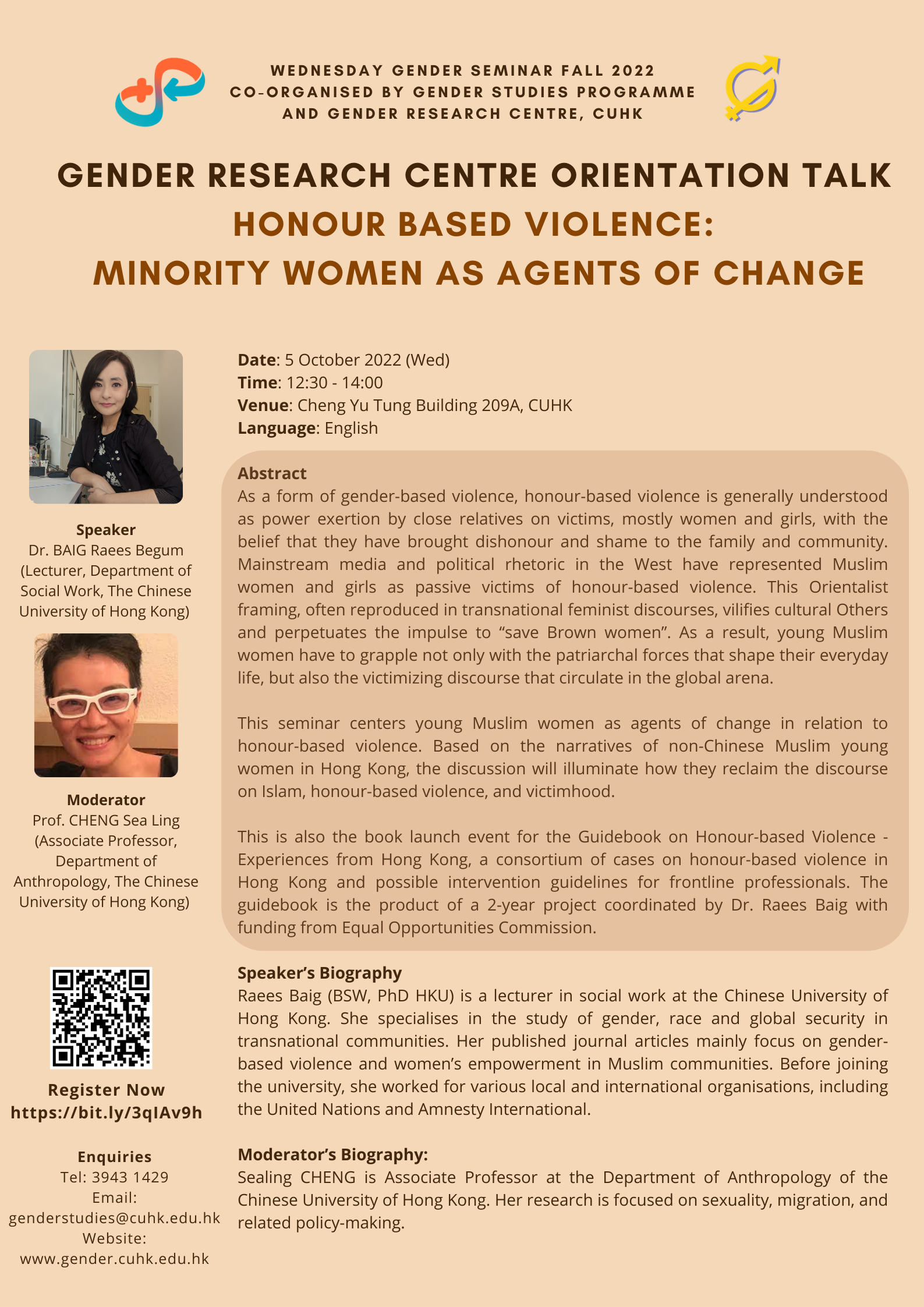 |
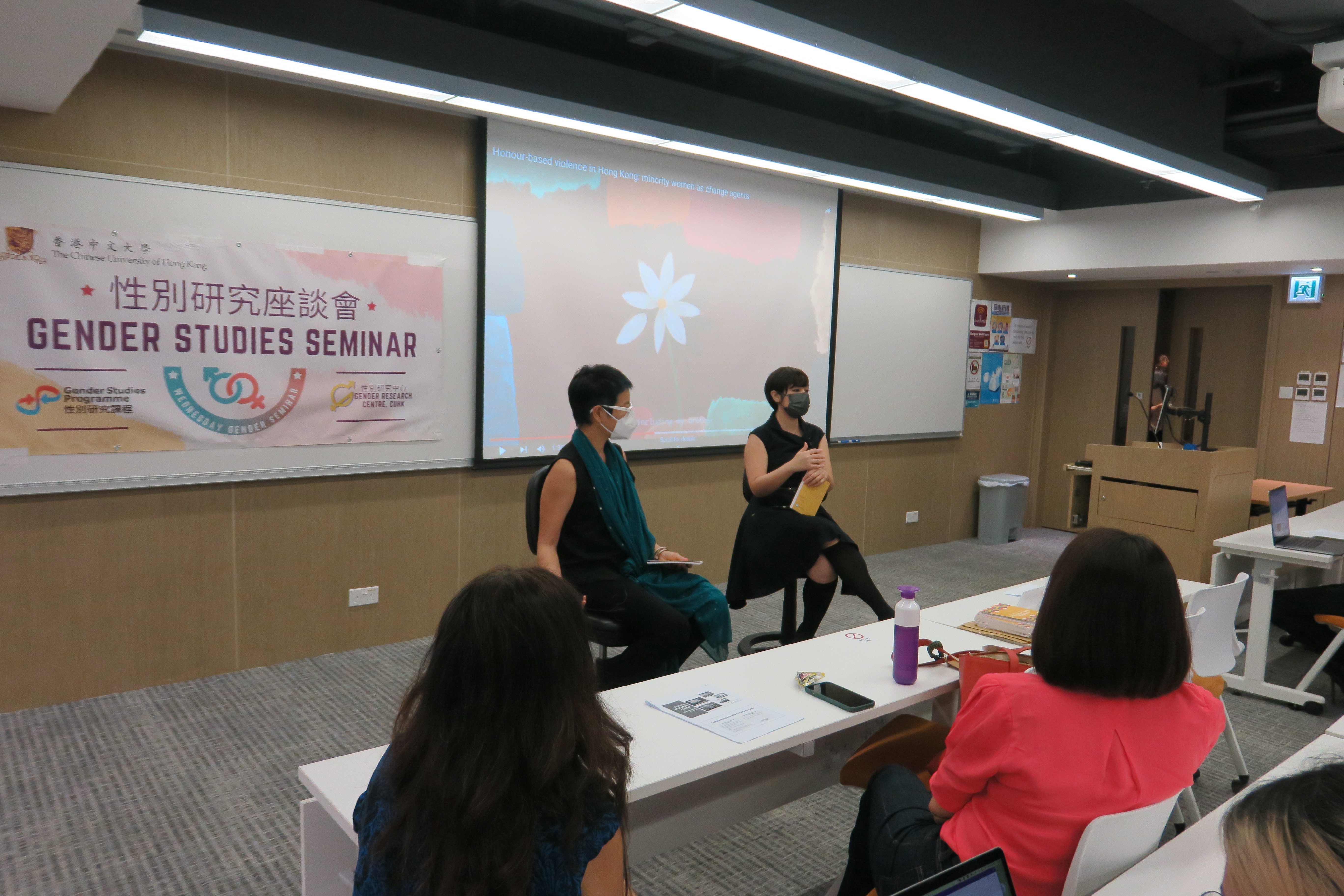 |
At Gender Research Center Orientation Talk on 5 October 2022, Dr. Raees Baig shared the research project Honour Based Violence: Minority Women as Agents of Change and presented a guidebook which is the product of this project.
During her involvement in local NGO’s investigation and assistance on domestic violence, she noticed that some Muslim women in Hong Kong were suffering from domestic violence because they were thought to brought shame to the family and community . She began to focus on their situation and try to connect with them. At the beginning she realized that Muslim women who had experienced honour-based violence, although they may not understand “honour-based violence” as an umbrella term, were able to share awareness of certain violence and poor power positions, while they also had a lot of confusion about marriage, sex and romantic relationships. Dr. Raees Baig then set up a workshop to give these women a platform to share their experiences and gender equality ideas, allowing them to connect the concepts and terms to their own experiences and identities.
However, the younger generation who have been subjected to honour-based violence are no longer passive victims, they have escaped from the official ideology through the internet and self-study of the Qur’an, and have learned about the political and religious contexts of their experience and many notions of gender equality. They try to escape their families or teach their families the new ideas they have embraced, in order to change the awful father-child relationship.
When asked if the project had helped to heal and empower the women victims, Dr. Raees Baig thought that it was important to give people who had experienced honour based violence or domestic violence more space to share their experiences, which helped them to realize and understand their situation. She also felt that their project has gone some way to challenging the global victimizing discourse of Islamic women by giving these women themselves the opportunity to speak about their effort to change the situation.
撰文:LI Xiangyi
A guidebook focusing on Honour-Based Violence (HBV) was shared in the seminar in order to address the issue of HBV of young Muslim women in Hong Kong. Their HBV experiences were revealed in the booklet, aiming to explore the way they interpreted their experiences in religious and cultural perspectives, and promisingly, initiating discussions and concerns on HBV cases in Hong Kong.
The seminar is facilitated by Dr. BAIG Raees Begum and moderated by Prof. CHENG Sea Ling in a Questions & Answers approach. Dr. BAIG first shared about the motivation behind the project, their interests in investigating how the young Muslim women perceive phenomenons such as domestic violence, HBV, forced marriage in their own words. Surprisingly, the younger generation has more thoughts on differentiating their culture and religion; they also have stronger mobility on their Muslim identities and their personal autonomy when comparing to the older generation who refused to relate themselves to sexual topics.
Dr. BAIG further explained the use of the word ‘honour’ and the underlying reason for young women being the agent of change but not victim-survivors of HBV. The ground of honour is strongly correlated with pride and reputation, in social contexts, on the other hand, honour also refers to standards and behavioural guidelines encouraged by the community. In fact, Dr. BAIG revealed that young women exposed to HBV are not only perpetrated by their father or other male relatives, female members sometimes play an assisting role in the process of HBV. HBV is therefore notably family-based in Islam culture.
Nonetheless the traumatic stress experienced by the young women, Dr. BAIG mentioned they expressed a longing for rebuilding their family’s relationship, breaking through these down the ages, agony family dynamics. With an eye to leap forward the family hierarchy, those brave women tried to regain their dignity in becoming a change agent instead of labelled as victim-survivors in their situations. They further share their self exploration process through this project to break the original Muslim teaching myth, meanwhile fighting for their identity of being a Muslim.
撰文:LI Yeuklam
The seminar on Oct 5th has been successfully held. Compared with the previous seminars, this one has some special components. First is the orientation of Gender Research Center. The GRC is an organization specializing in gender issues at the Chinese University of Hong Kong, and Prof. Lynn demonstrated the academic and practical achievements of the GRC by presenting the center's past research projects, book publications, workshops, and other activities and it was committed to recruiting members for this seminar. The second part is Dr. BAIG Raees Begum’s sharing of her 2-year project of the honour-based violence (HBV) focus on the non-Chinese Muslim young women in Hong Kong, also the publication of the guidebook based on the real experience and cases of the HBV investigated in this project.
What motivated Dr. Baig to conduct this project must be recalled from a social work experience that took place several years ago. At the time, Dr. BAIG was cooperated with one local NGO to work on domestic violence. During the work, they discovered that the situation could be religious and cultural ways. Although the previous generation of non-Chinese Muslims living locally in Hong Kong may not understand the ture meaning of the academic terms like “domestic violence” or “forced marriage”, they can express this sentiment in their own language. However, the young female generation, with the fully understanding of these term, strong self-identity, and highly opening thoughts of ideal relationship, tend to use their own voices to challenge the rigid culture. These young females started to subvert abuse and the inequalities they feel within their families. Hence the initial phase of this product: to create a platform for them to talk more about these concepts on gender issues.
Moving to the topic of “women as agents of change”in this scenario, Dr. Baig explained that from the interacting with these girls they really see how the girls grew up, how they changed their self-perceptions and how they changed their families, even if they were experiencing abuse and violence. Women in the domestic violence isn’t victims anymore, we can see how they breakthrough these situations and some of the cases the girls even developed the capacity to educating they parents and rebuild family bonds.
In summary, HBV is a form of family-based violence, and in Hong Kong society today, neither social work nor the legal system has a good solution to HBV and a host of other problems such as physical control and forced marriage. On the one hand, society should build on this, but on the other hand, we should also see how women in such domestic violence gradually developed to find their own way to defend themselves.
撰文:QIAN Xiaoxuan
21 Sep 2022 (Wed) Daughters’ Dilemmas: Family Strategies of Highly Educated Rural-Urban Education Migrants in Hubei Province, China
 |
 |
 |
Prof. SIER Willy, in her talk, revealed how female university graduates, as the first and only bachelor’s degree holder in her rural family, experienced various intersecting social processes that were shaped by both the structural condition of China’s social transformation and their dual roles, i.e., the role of daughters in the rural household, and the role of migrant female university graduates working in the city. The author conducted ethnographic research in Hubei province, one of China’s ‘big education provinces’ with rich educational resources and a huge number of university students. With the rapidly changing conditions in rural China and the expansion of China’s higher education system, university enrolment by young women of rural origin has increased exponentially. However, these young female ‘education migrants’ continue to struggle with the exclusion of rural citizens in cities and the entrenched patriarchal family culture in rural China. They are expected to use their gender and educational achievements to provide support to their families through their urban earnings and marriage. For instance, in one of the two cases that the speaker showed, the respondent’s mother required her to get married soon to somebody with a high bride price in order to finance her brother’s marriage. This case also revealed that those highly-educated female migrants’ contributions to their rural households resulted from elaborate negotiation processes with their family members. Additionally, the study emphasized that those highly-educated female education migrants from rural China are not a homogeneous group: one respondent was keen to pursue a career and maintain her independence, while another expressed her desire to help strengthen both her own and her family’s social and economic standings through marriage. Overall, gender, rurality, and migration are indicated to put multi-pressure on female university graduates from rural backgrounds, and their ‘education migration’ brought their intense negotiations with rural households, which reconfigure the gendered household dynamic in rural China.
撰文:GU Yuxuan
On September 21st, the Wednesday Seminar was successfully held, presented by Prof. Willy Sier, the assistant professor of the anthropology department of Utrecht University who has lived in mainland China for seven years.
Prof. Sier's pointed out that expanding urbanization and higher education opportunities have made education increasingly crucial for rural families. Hubei, a wealthy province with a well-established higher education system, was attracting an increasing influx of education migrants. During Prof. Sier's fieldwork in Wuhan between 2015-2017, she spoke to several young, first-in-the-family, highly educated women who face the dual pressures of their families and city lives. Prof. Sier deemed that their contribution to families goes beyond the existing literature, including the sacrifice of economy, emotion, and even personal desire.
Prof Sier discussed two case studies. One was Julia, who came from a single-parent family and took on much of the responsibility of supporting her mother's retirement and her brother's marriage after graduation. Faced with her mother's urging for marriage, Julia doubted the necessity of getting married as a city woman and believed that marriage might deprive her of the legitimacy of raising her family of origin as a rural daughter. Professor Sier argued that this case showed how the identity and mobility brought by educational migration give rise to complexity in gender roles, marital relations, property distribution, and kinship in rural Chinese households.
The other was Misty, an interlocutor who graduated from a junior college. Misty returned to her hometown and entered an unromantic marital relationship after the challenging career choice and financial crisis after graduation. This case prompted Prof. Sier to reflect on how inflation in higher education has caused a gap between employment choices and career dreams, especially for women with rural backgrounds.
Prof. Sier observes that almost every interlocutor shows ambitions in the future while diligently navigating a social landscape in which their positions are shaped by gender, educational achievements, and rural status, as well as societal structures, including marriage and labor markets. From the Pandemic to today, Prof Sier remains in contact with interlocutors remotely. Although these cases may not be representative, Prof Sier believes these anthropological studies provide academic value in understanding how intersecting social structures have shaped the lives of the increasing number of young women with higher education backgrounds and shifted dynamics in their rural families.
撰文:HUANG Minyan
The research is based on the background of rural labour migrants. Young people from rural backgrounds increasingly moved to cities by enrolling in universities due to land consolidation, low pay for working in leading local enterprises, and the explosive growth of the Chinese higher education system. Professor Willy Sier examined how higher education affected university-educated daughters in rural households of their employment prospects, but also how this made sense within broader gender ideologies and labour market contexts.
She argued that highly educated young women contribute to the family in a way that goes beyond what we know from the literature as they contribute financially and emotionally and sometimes even sacrifice their ambitions to contribute to the family projects, such as helping their brother marry. She showed two cases.
First is Julia's story; being the only person in a family with a degree, she feels responsible for ensuring her brother's and mother's life. She cannot consider getting married because she thinks it's unfair for her husband and child to continue supporting her original family. Julia's case connects two sets of questions, those about the emancipating potential of higher education for young women and questions about daughters' role in rural Chinese households. It is often suggested that education is an important tool for promoting gender equality. But we see that Julia's achievements and energy are directed towards securing property for her brother and that she continuously needs to prioritize her family's needs over her desires.
The second case is Misty. Misty puts family needs ahead of her own emotional attachments when choosing a mate. Working in a factory had been an essential part of the marriage negotiation because being an accountant made her also an attractive person to marry into this family that had a factory. But her dream is to be a teacher, and don't want to work in a factory.
Their educational trajectories have always been important to them. However, they also navigate a social landscape in which their positions are shaped by their gender, educational achievements, rural status, and societal structures, including marriage labour markets.
撰文:JIN Shuyi
14 Sep 2022 (Wed) The Cultural Politics of Intimacy: A Methodological Experiment
 |
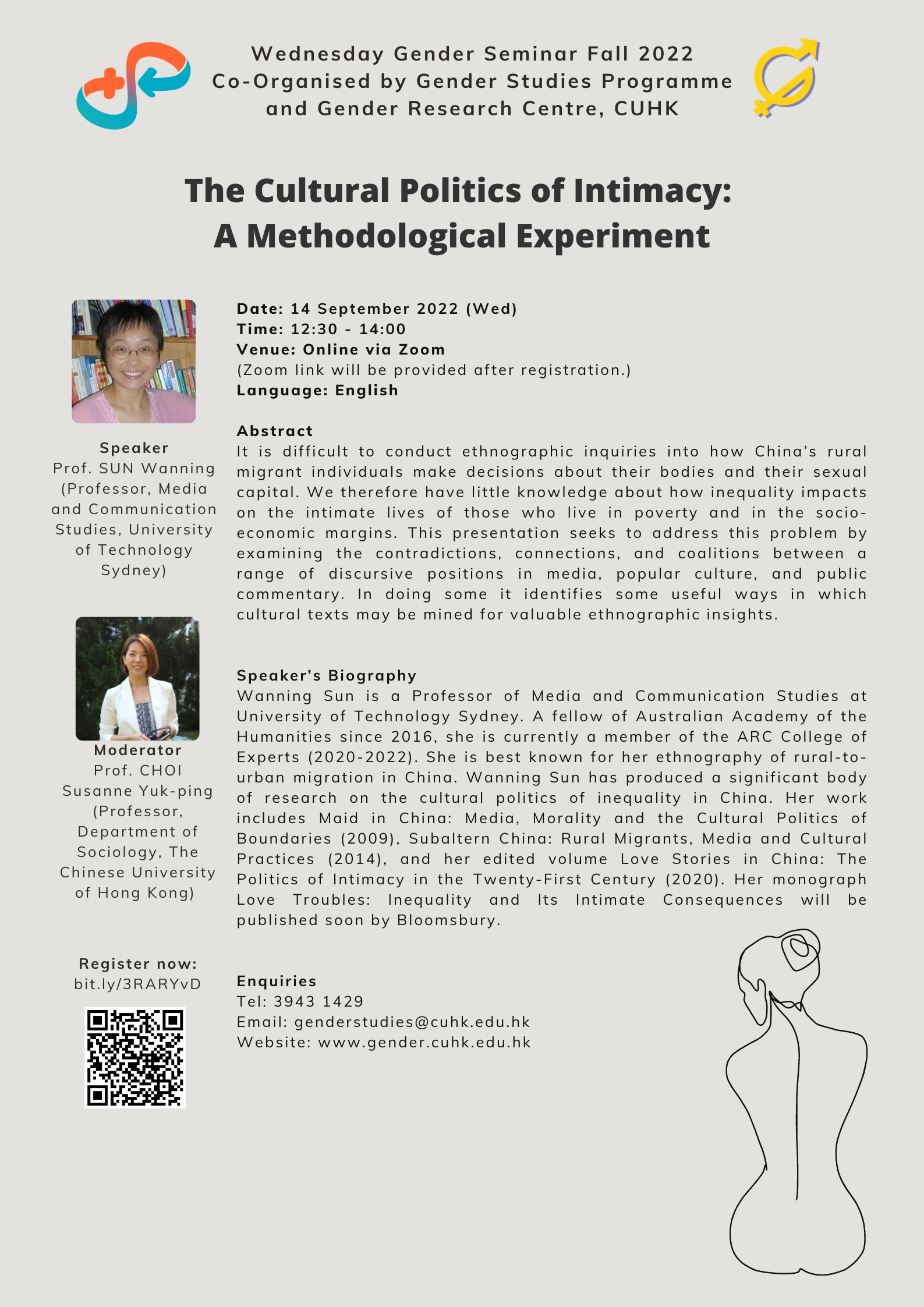 |
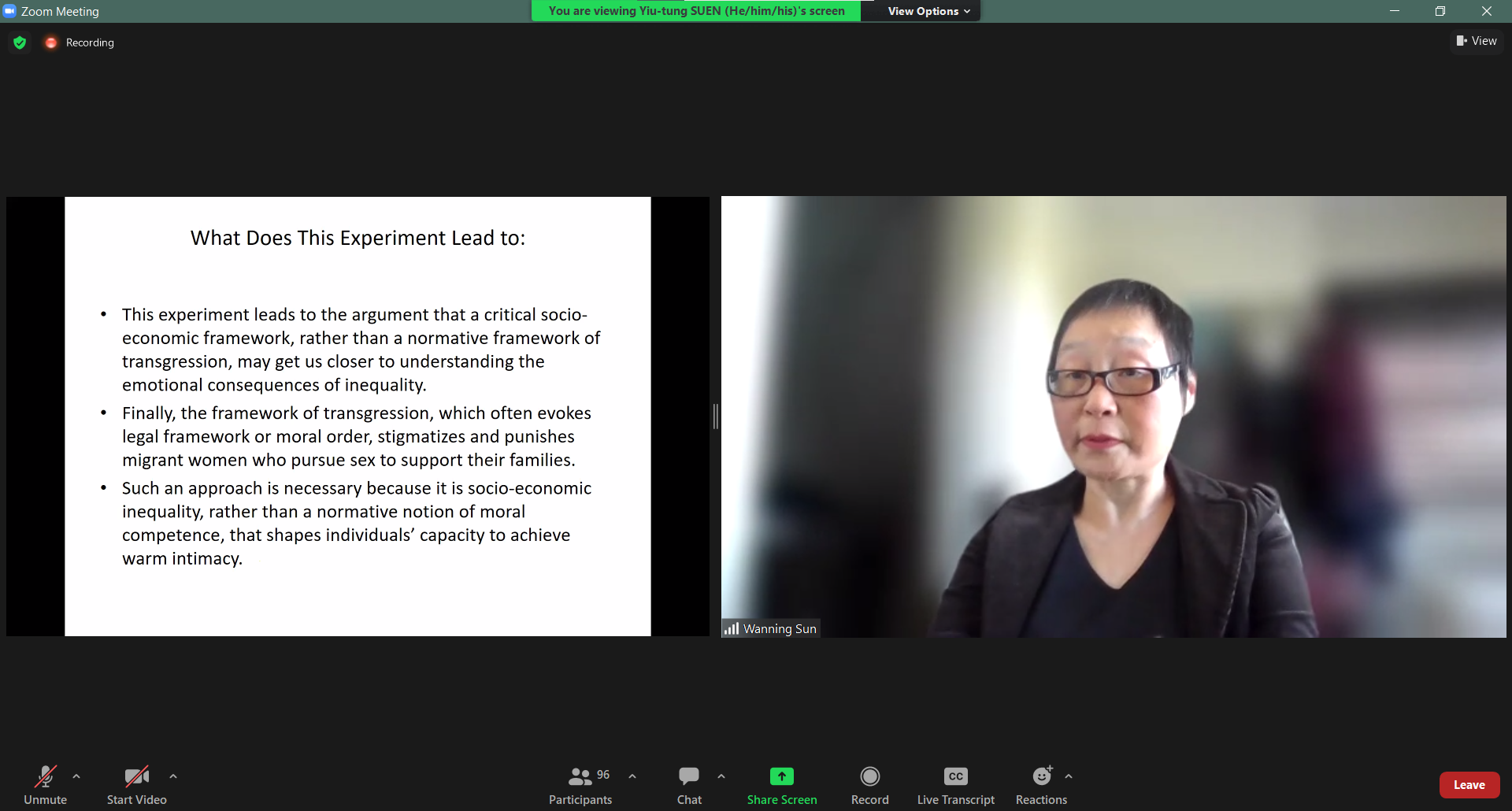 |
Researchers tend to encounter difficulties when it comes to knowledge of how inequality affects the intimacy of the socio-economically marginal people. This presentation tries to figure out this problem by introducing a methodological experiment. The speaker, Prof. SUN Wanning from the University of Technology Sydney, addressed how she conducted this experiment by analyzing the contrasts, coalition, convergence and collaboration of the discursive relationships in social media, popular culture, and public criticism.
Generally, it is challenging to carry out conventional ethnographic researches when ethnographers seek to know how China’s rural migrants experience their intimate and sexual lives. Because there are methodological difficulties in investigating one’s negative love life and documenting their “dark intimacy.” Prof. SUN attempts to offer a new solution to this obstacle with a methodological experiment: to study a wide range of textual materials, by contrast, coalition, convergence, and collaboration. Her material sources include state media, labour literature, sweat-shop management’s statements, statements in an NGO’s newsletter, etc. This kind of experimental methodology dialogues with the absence of first-hand ethnography. Making good use of the narrative nature of ethnography, it regards the creators or gatherers of the textual materials as surrogate ethnographers. It thus puts forward a new concept, “‘second-hand’ ethnography” or “surrogate ethnography”.Instead of setting up a hierarchy of truthfulness, this new concept intends to ferret out the cultural politics through their discursive relationships. This experiment makes for a critical socio-economic framework in place of a normative framework of transgression. Whilst the latter one usually draws out legal or moral issues and leads to stigmatization and punishment, neglecting the emotional consequences. Prof. SUN also argues that it is socio-economic inequality but not a normative idea of moral capacity builds peoples’ abilities to reach out warm intimacy. Hence, it is of necessity to come up with such an approach.
撰文:DENG Zhuoyun
In the Wednesday Gender Seminar, held on September 14, 2022, Prof. SUN Wanning, from Media and Communication Studies at the University of Technology Sydney, shared difficulties she encountered in the process of ethnographic research and presented a special case which involved various discursive positions in series of textual materials, as a powerful solution to overcome the methodological troubles. By outlining her research trajectory, Prof. Sun mentioned that the socio-economic marginalised experienced intimacy as a new notion of ‘dark intimacy’ that is purchased, violent, or injurious. Since intimacies nowadays are public social goods that not everybody has equal access to and needs to invest bodily and emotional capital, it is crucial to consider how inequality marginal groups suffer impacts their love lives. Also, first-hand ethnology may confuse the researchers due to the private essence or absence of intimacy. This led to questions about how scholars should integrate and make sense of collected data in the cultural context. Inspired by Huang Yingying, Eva Illouz, and Judith Farquhar, Prof. Sun addressed that second-hand ethnology, or surrogate ethnology, can be helpful when treated as particular narratives rather than neutral documents. To be specific, Prof. Sun introduced a project about how Foxconn sex workers were represented in textual materials with varied positions, including commercial and state press, Foxconn management’s statement, their self-statement from NGOs, lowbrow magazines, and Dagong literature. Their attitude toward sex workers varied, and female workers’ motivations to become sex workers were depicted differently, mainly in two ways: a normative framework of transgression(legal and moral order) and a socio-economic framework(supplying the family's finical needs). Between texts, four relationships: collaboration, coalition, contrast, and convergence, emerged and mutually contributed to understanding which and how the latter framework, rather than the former, gets us closer to the consequences of inequality. Thus, Prof. Sun concluded that the experiment analysing clusters of texts and their conceded perspectives is necessary since it is inequality that shapes female workers’ capacity to achieve a warm intimacy, not the normative notion of moral competence. In summary, Prof. Sun highlighted the importance of understanding and being attentive to power relations in diverse texts. To Introduce and examine a series of cultural texts does not mean doubting whether the ethnology is authentic and establishing the hierarchy of truthfulness, but revealing the cultural politics through their relationships.
撰文:DU Ruini
The nature of intimacy, being private and obscured, often leads to the absence of first-hand ethnography. Dark intimacy that is purchased, violent, or injurious, poses a further methodological difficulty in the investigation. In this circumstance, a range of cultural texts contribute important ethnographic insights to Prof. Sun Wanning’s studies of the intimate lives of the marginalized. Considered as second-hand ethnography, the textual material is produced and mediated by a diversity of “surrogate ethnographers”, requiring a critical analysis in and among the texts, for instance, the discursive privilege they each possess, different agendas and readers, as well as the tension arising among them.
Prof. Sun examines various aspects of the texts and suggests four main discursive relationships: contrast, collaboration, coalition, and convergence. For example, contrast is reflected in the disparity between the narratives by different media. State media and commercial media adopt a normative framework in their commentaries on migrant women workers as part-time sex workers. The documented intimacy is simplified as a transgression, with what has truly constituted the women’s plights and decisions left undiscussed. Contrasting such an approach is a sex worker’s storytelling in an NGO’s newsletter, which offers a glimpse of a woman’s emotions, struggles, and the certain familial, political, and economic circumstances she faces to decide on her body and sexual capital. While in some literary works included in Prof. Sun’s studies, a different relationship defined as collaboration can be discovered. From novels depicting migrant workers’ dark intimacy to poems based on the real lives of sex workers, these texts approach the intimate lives of the marginalized from their own perspective instead of moral judgements, with the sensibility of the political and economic influences. These texts support and enhance the legitimacy of one another.
The normative framework of transgression neglects individuals’ dilemmas and the socio-economic contexts, typecasting and stigmatizing the marginalized. Prof. Sun thus argues for a critical socio-economic approach to intimacy that explains how socio-economic inequality pervasively affects individuals’ intimate lives, as well as the studies of the discursive relationships that contribute to a more comprehensive understanding of cultural politics.
撰文: FONG Yuk Ping
13 Apr 2022 (Wed) Mini-Conference of Thesis of MA in Gender Studies 2022
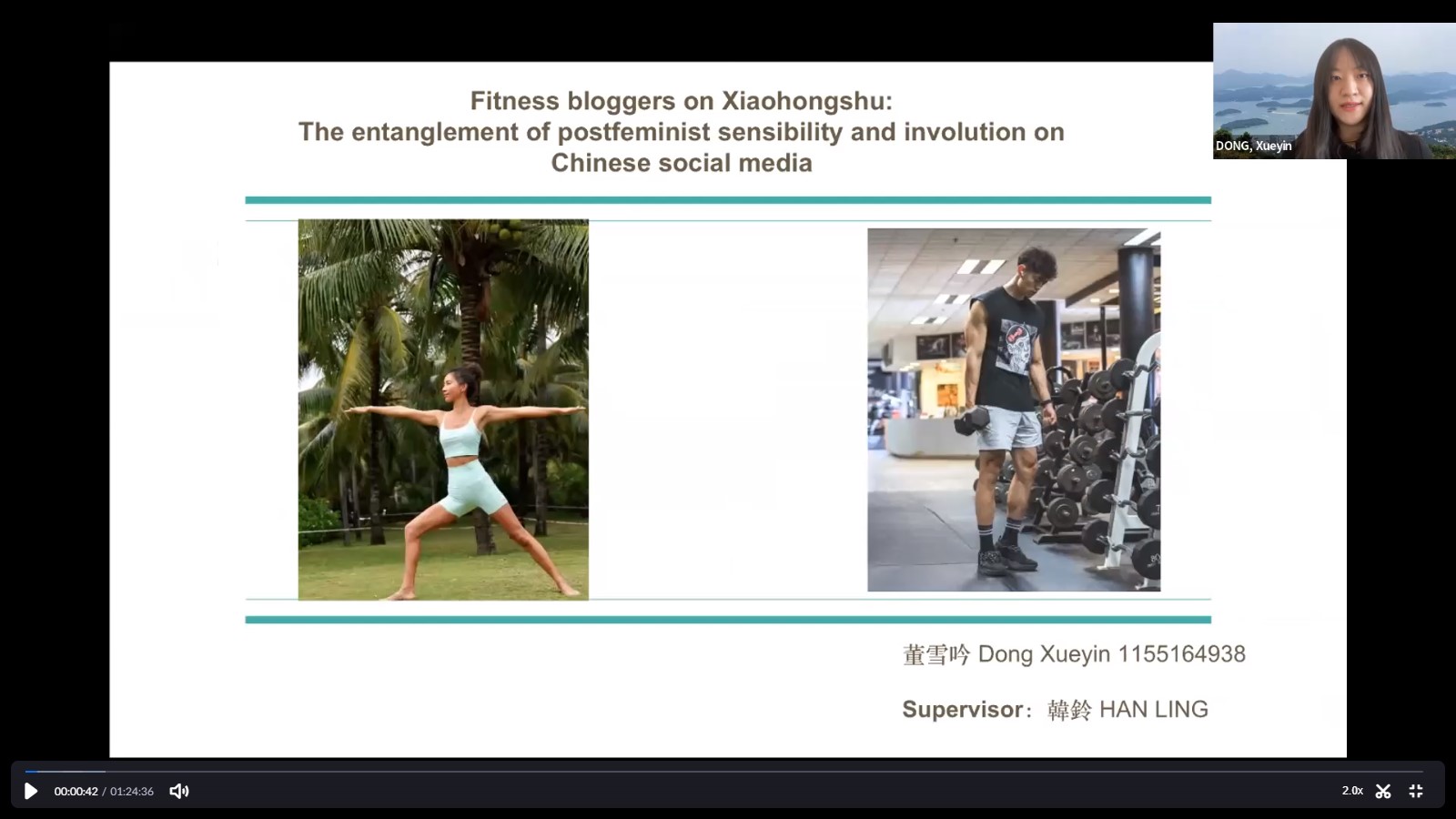 |
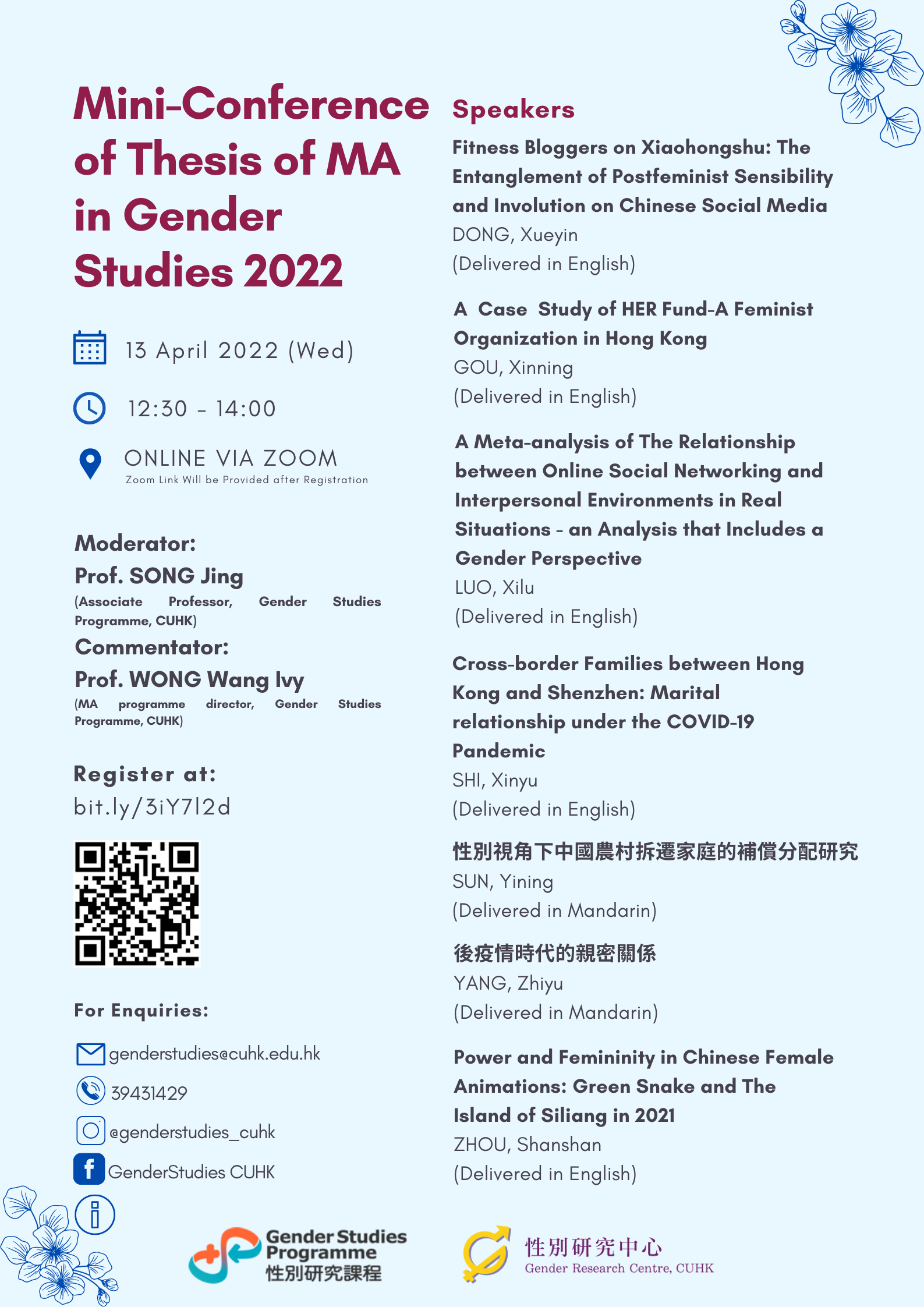 |
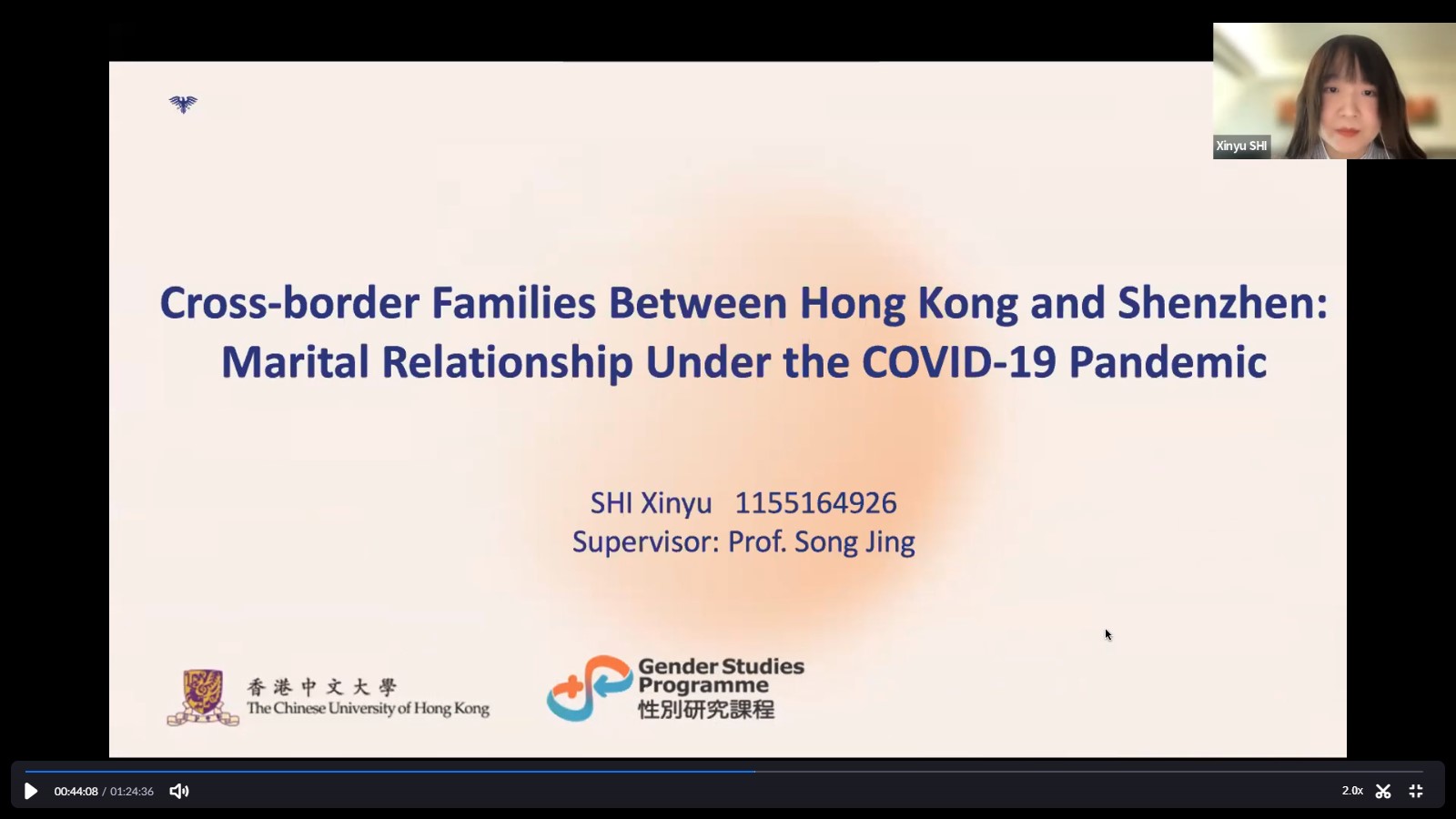 |
在2022年4月13日的週三性別研討會上,來自香港中文大學性別研究課程的七位修課式研究生同學分享了她們的畢業論文研究專案。
董雪吟同學通過對六位小紅書健身博主的392篇博文進行文本分析,從女性主義視角探討了她們對於內卷的實踐。她的研究結果發現,女性博主更多地談論性別不平等,表達對內卷行為的焦慮;而男性博主則較少使用後女性主義的情緒勞動話語,他們的行為也更符合內卷的定義。
緱欣寧同學選取了香港唯一的民間婦女基金會HER FUND進行案例研究。在針對HER FUND的工作空間和活動進行參與式觀察的過程中,她發現 HER FUND的工作人員和參加他們工作坊的參觀者之間存在扁平化的等級制度。 此外,HER FUND還通過照顧來自不同背景的女性並邀請她們分享經驗,創造了一種溫暖好客的情感文化,並注重女性參與者性別與階級的交叉性。
羅西陸同學的研究從性別角度探討了網路社交與青少年抑鬱之間的關係。她的研究假設使用整合分析的方法,通過從相關實證研究中提取效應值,探索線上社交在多大程度上以及如何影響青少年抑鬱。她的研究目前處於清理資料階段,此研究假設線上社交對青少年抑鬱的影響作用會受到線上社交媒體類型和青少年受試者背景的影響。
孫一寧同學的研究關注中國農村拆遷家庭如何將補償財產分配給子女。通過對山東省李村的18個農村拆遷家庭進行訪談,她的研究發現大多數農村父母仍然持有強烈的父權觀念,傾向於將拆遷房分配給兒子而非女兒。這項研究將為討論城市化對父權制的影響提供理論和實證意義。
史昕予同學的研究關注在COVID-19疫情期間長期分居的深港跨境已婚夫婦,通過二手資料以及深入訪談資料,她的研究探討這些跨境夫婦,尤其是妻子,如何受到社會流動限制政策的影響。她根據丈夫和妻子的職業與家庭取向將這些夫妻分為四種類型,並發現這些女性在這一時期面臨著越來越多的家庭負擔,四類夫妻之間的差異反映了個人主義和家庭主義對夫妻雙方的影響程度有所不同。
楊知語同學通過對二手調查資料進行分析,以及對處於跨境戀愛關係中的女性進行深入訪談,探討這些女性在COVID-19 大流行下的移民應對策略和決策過程。她的研究以捆綁遷移理論和關係動盪理論為理論框架,認為強制分離的社會流動政策與親密關係中的挑戰和衝突密切相關。同時,這些女性不同的應對策略不僅反映了她們的經濟考慮,還反映了情侶雙方的性別觀念與關係狀態。
周珊珊同學的研究對比分析了近期兩部中國女性動畫《青蛇劫起》和《眷思量》中與性別相關的內容,以展示權力和女性氣質在中國動畫電影中的表現和發展。她發現兩部電影中的女主角都呈現出傳統的女性氣質和男性氣質混合的特徵,但男性導演和女性導演對此有不同的解讀。女性導演的《眷思量》對女主角的刻畫雖然不完美,但更寫實;男性導演的《青蛇劫起》,則呈現了穿著誇張、突出女性身體的女主角,反襯出男性的凝視。
研討會的最後,香港中文大學性別研究課程修課式研究生專案主任Prof. Ivy Wong對同學們的報告給出評論。Prof. Wong總結到,所有同學的研究題目都非常清晰和有趣,並且涵蓋了廣泛的研究領域,從案例分析到整合分析的研究方法也非常多樣化。她鼓勵同學們志存高遠,考慮發表她們的研究成果。祝賀所有進行報告的同學,並祝願她們的研究一切順利!
撰文: Li Lulu
6 Apr 2022 (Wed) The affective practice of love: the imagined subjective protest body on LIHKG in Anti-ELAB Movement
 |
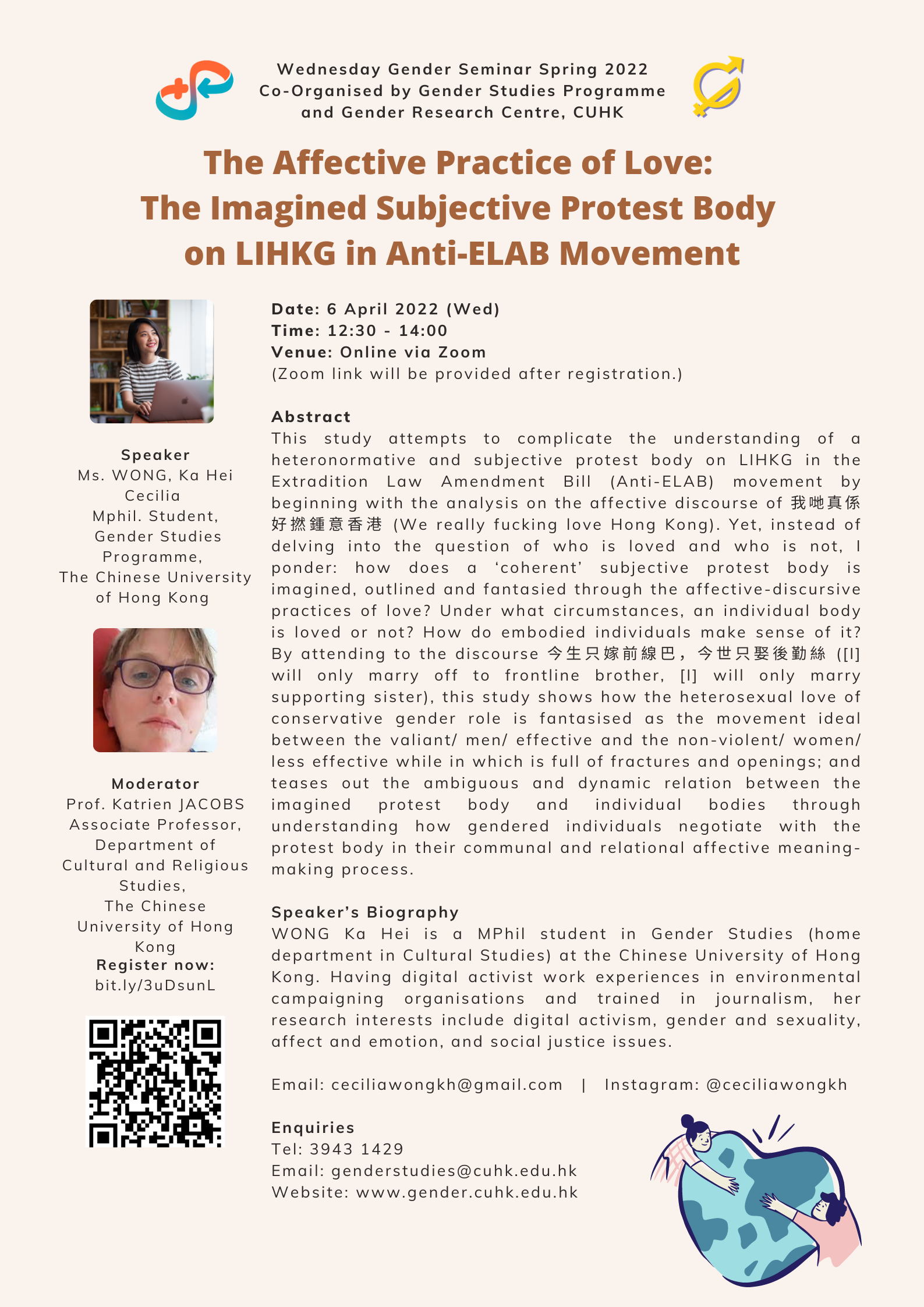 |
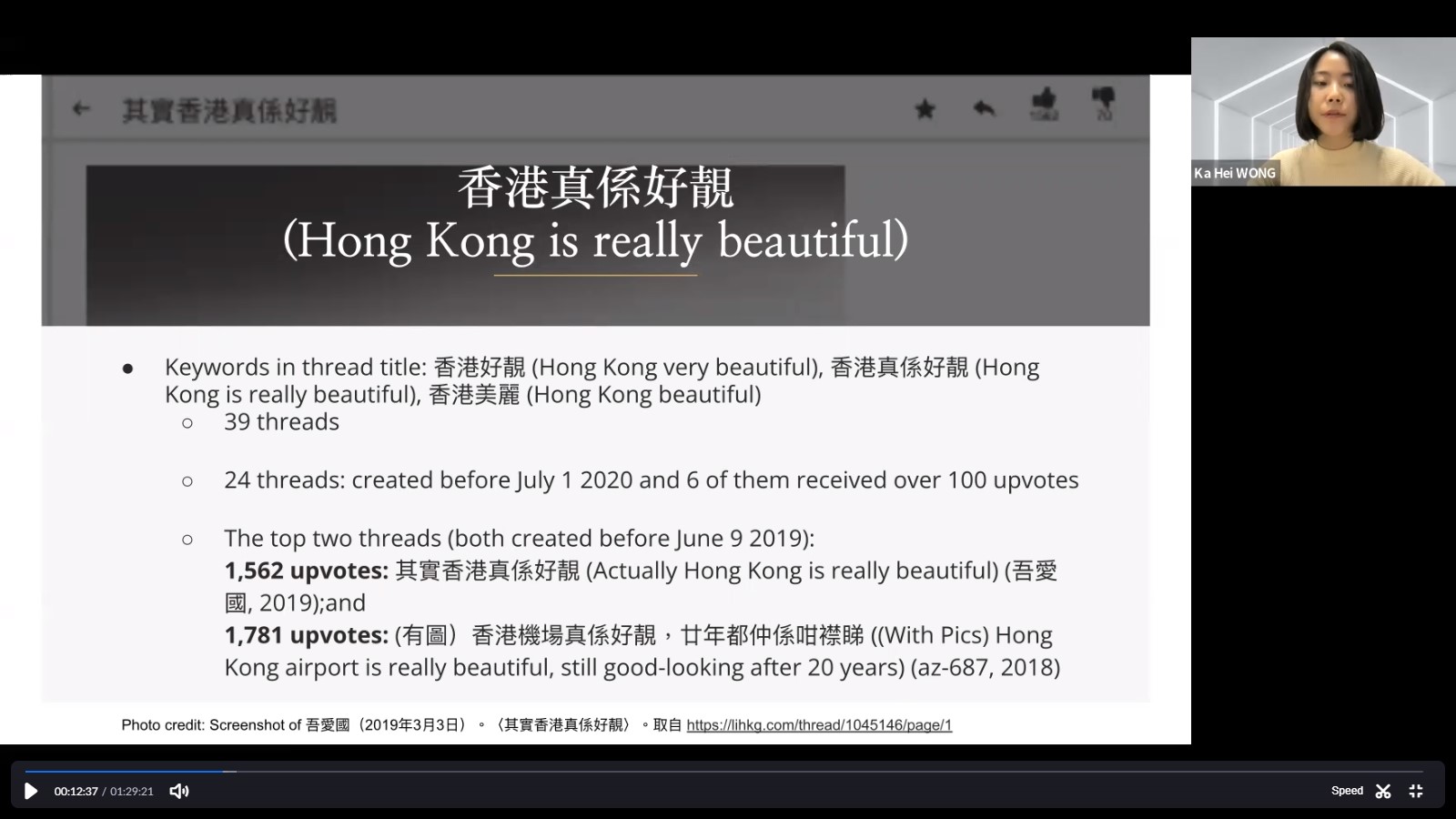 |
在4月6日的週三研討會上,來自香港中文大學性別研究課程的哲學碩士生黃嘉晞女士分享了她的有關LIHKG用戶在反對逃犯條例修訂草案運動期間的話語實踐與性別化協商的研究。
依託於多樣的跨學科方法,黃女士採用研究聚合的策略作為主要方法論,包括媒體與數位民族志,主題話語分析、4組半結構化訪談和3組後續跟進的個人訪談。由於LIHKG用戶性別化的情感實踐與情境體驗是多層次且多方面的,該講座挑戰了長期以來占主導地位的將抗爭的身體理解為異性戀的單薄想像,提出了有關個體如何在日常反抗中同正在生成變化的集體進行協商的另一種解讀。
儘管幻想中的異性戀情侶與異性戀本位的性別分工為抗爭主體的矛盾本質貢獻了情感的連貫性,該研究發現,每一個獨立的身體都是由異質性別體驗所組成的動態節點。黃女士的結論認為,將性別化具有主體性的抗爭身體視為一個斷裂開放,充滿可能性的場域,是理解協商所涉及的動態過程,進而理解這種有關愛的情緒實踐的核心。
撰文: Zhang Yuqi
30 Mar 2022 (Wed) Analyzing Female-Victim Intimate Partner Homicide in China via Hierarchical Models and Data Mining Methods
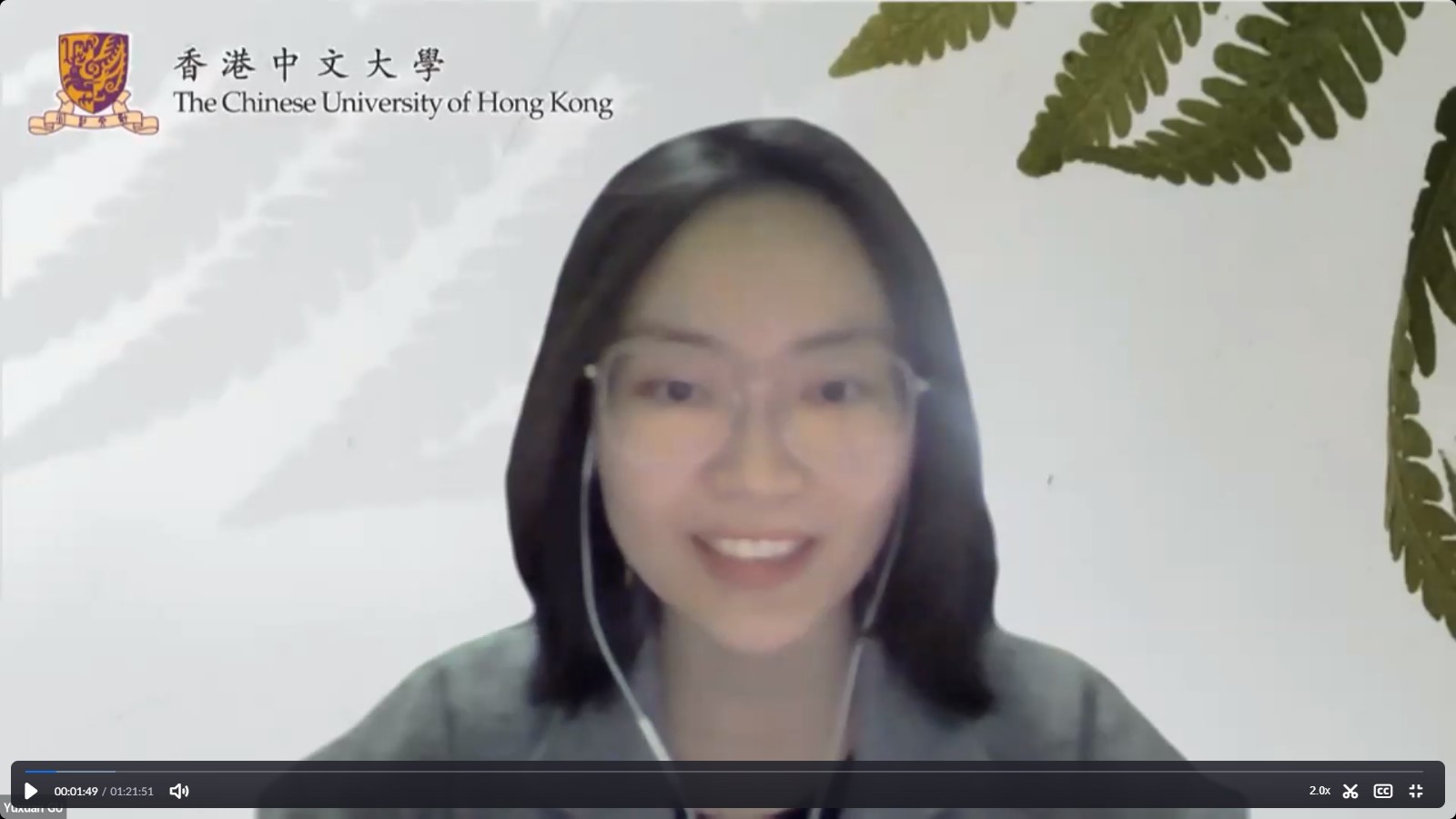 |
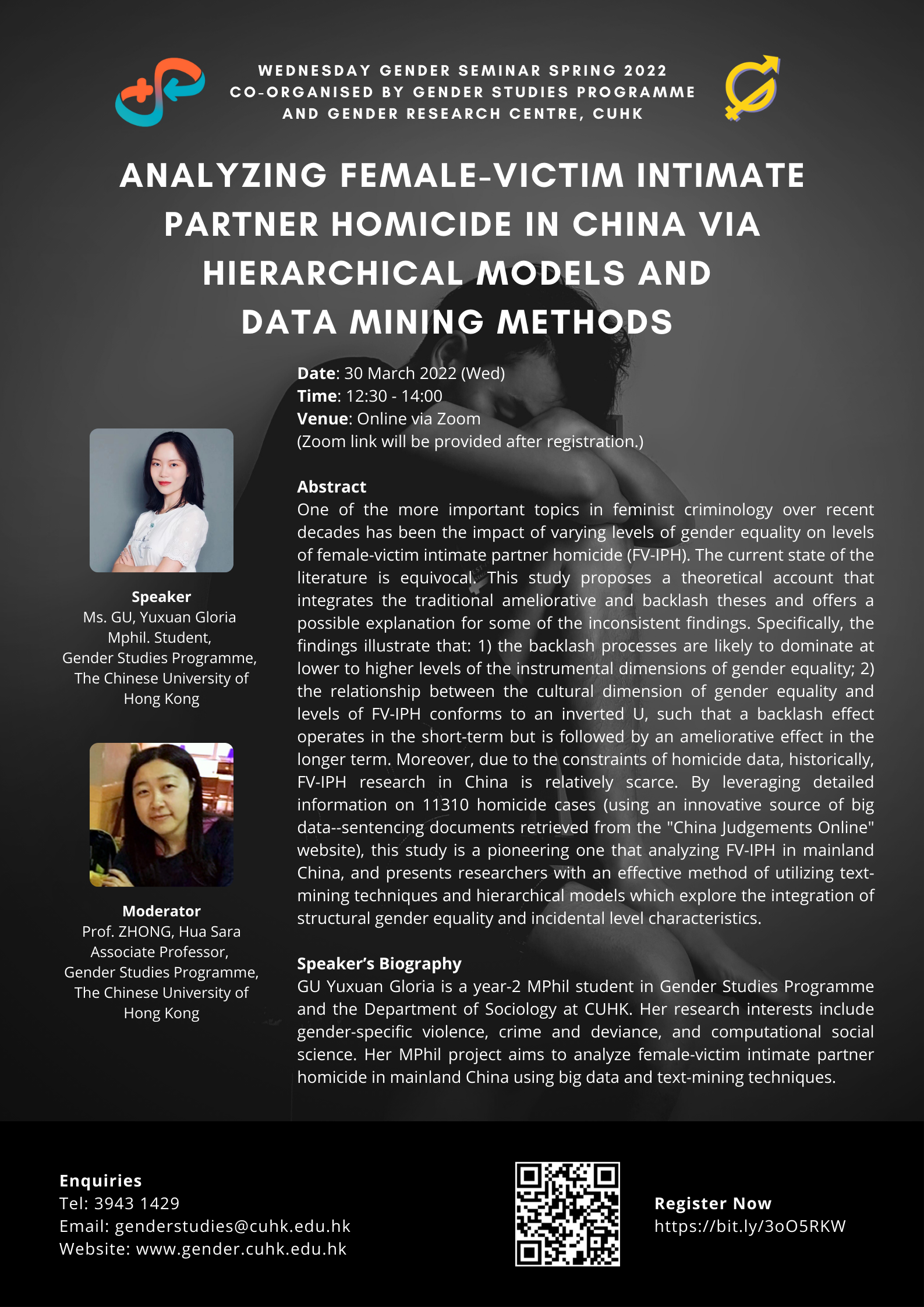 |
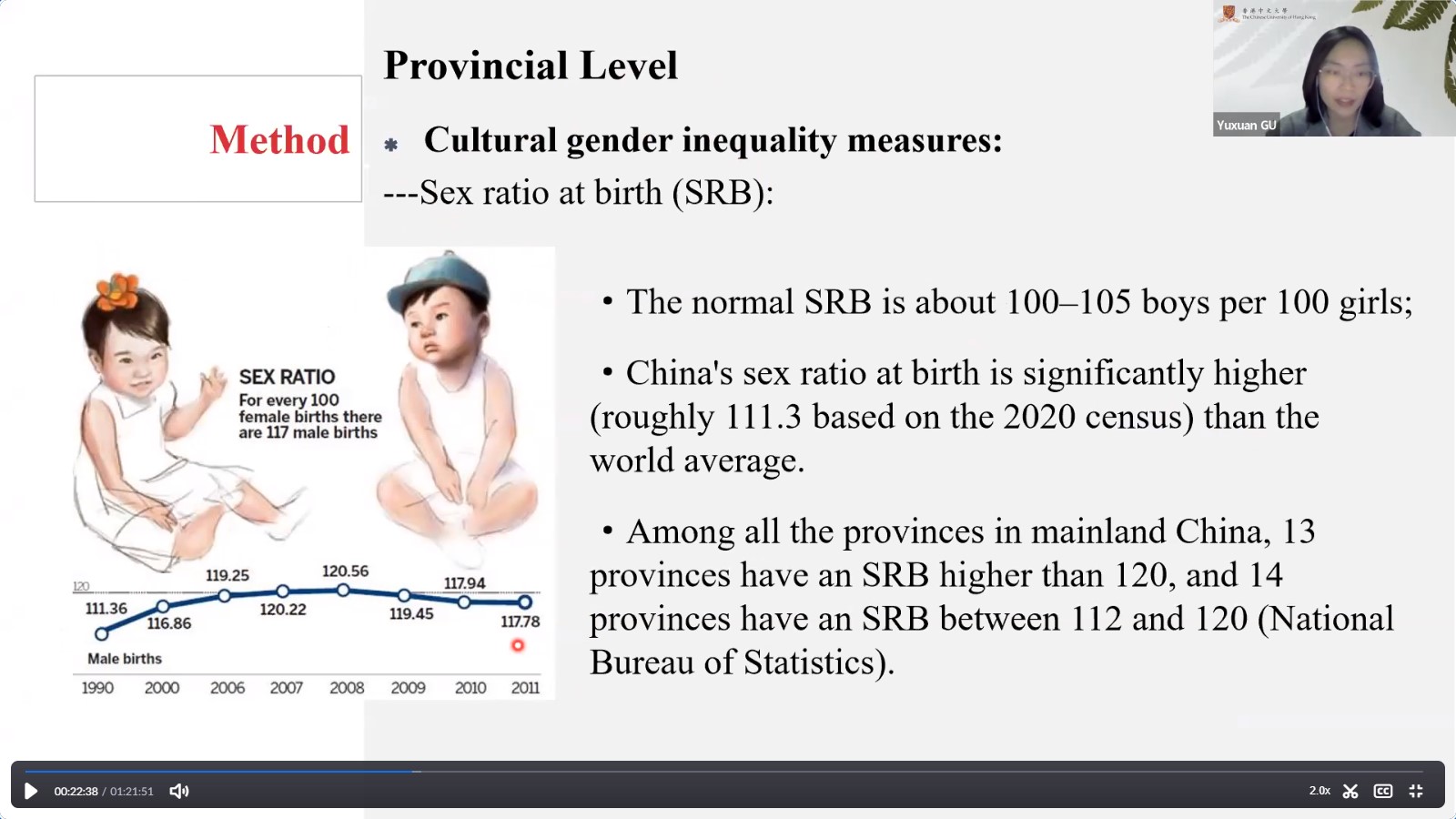 |
在3月30日的週三研討會上,來自香港中文大學性別研究項目及社會學系的碩士研究生顧雨璇女士分享了她的研究:“通過分層模型和數據挖掘方法分析中國的女性受害者親密伴侶殺人案”。
由總體數據而言,儘管全球範圍內謀殺犯罪率呈下降趨勢,但親密伴侶間的兇殺案,特別是受害者為女性的親密伴侶兇殺犯罪率較為穩定。尤其在中國,由家庭暴力致使的離婚申訴案件中,高達91.41%的施暴者是男性。基於這一背景,顧女士的研究提出了一個整合傳統的改善性(amelioration)和反彈性(backlash)的理論,為現存的不一致的結論提供了可能的解釋。並在中國大陸經濟與文化水準差異大的省份間進行了實證研究。
顧女士選取了來自中國裁判文書網的11310個故意殺人案件,並使用分層模型和數據挖掘方法進行分析。研究結果表明:(1)就性別平等的工具性維度而言,在婦女賦權水準從低到高的過程中,反擊過程可能占主導地位;(2)性別平等的文化維度與FV-IPH案件數量之間的關系符合倒U型的假設,即在短期內有反彈效應,但在長期內會有改善效應。通過利用11310起兇殺案的詳細資訊,本研究開創性地分析了中國大陸地區的FV-IPH,並為研究者提供了一種利用文本挖掘技術和層次模型,整合結構性性別不平等和個案特徵的有效範式。
撰文: SUN Yining, SHI Xinyu
23 Mar 2022 (Wed) Gendered Market Activities among Female Entrepreneurs in China: Case Study from Two Inland Provinces
 |
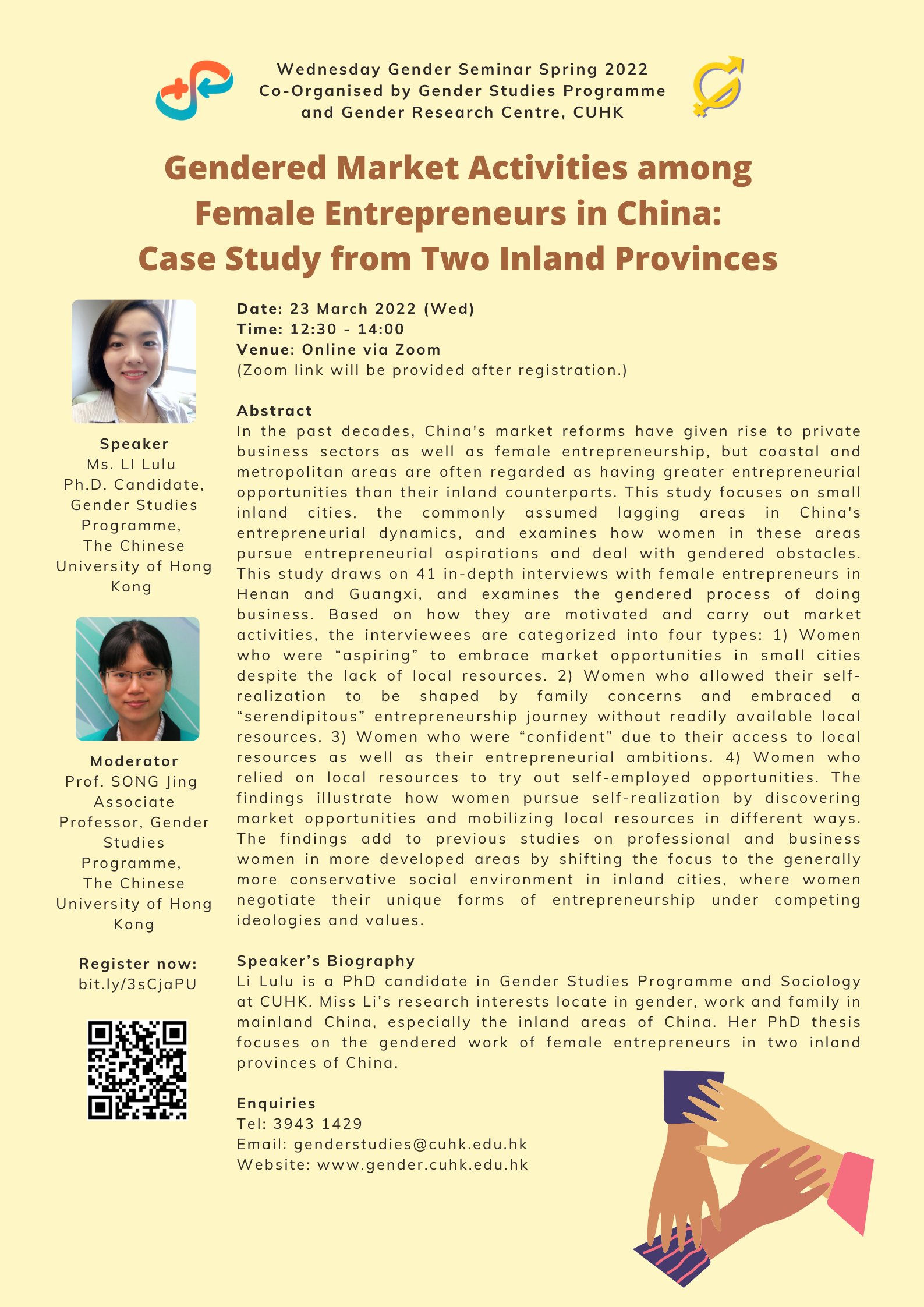 |
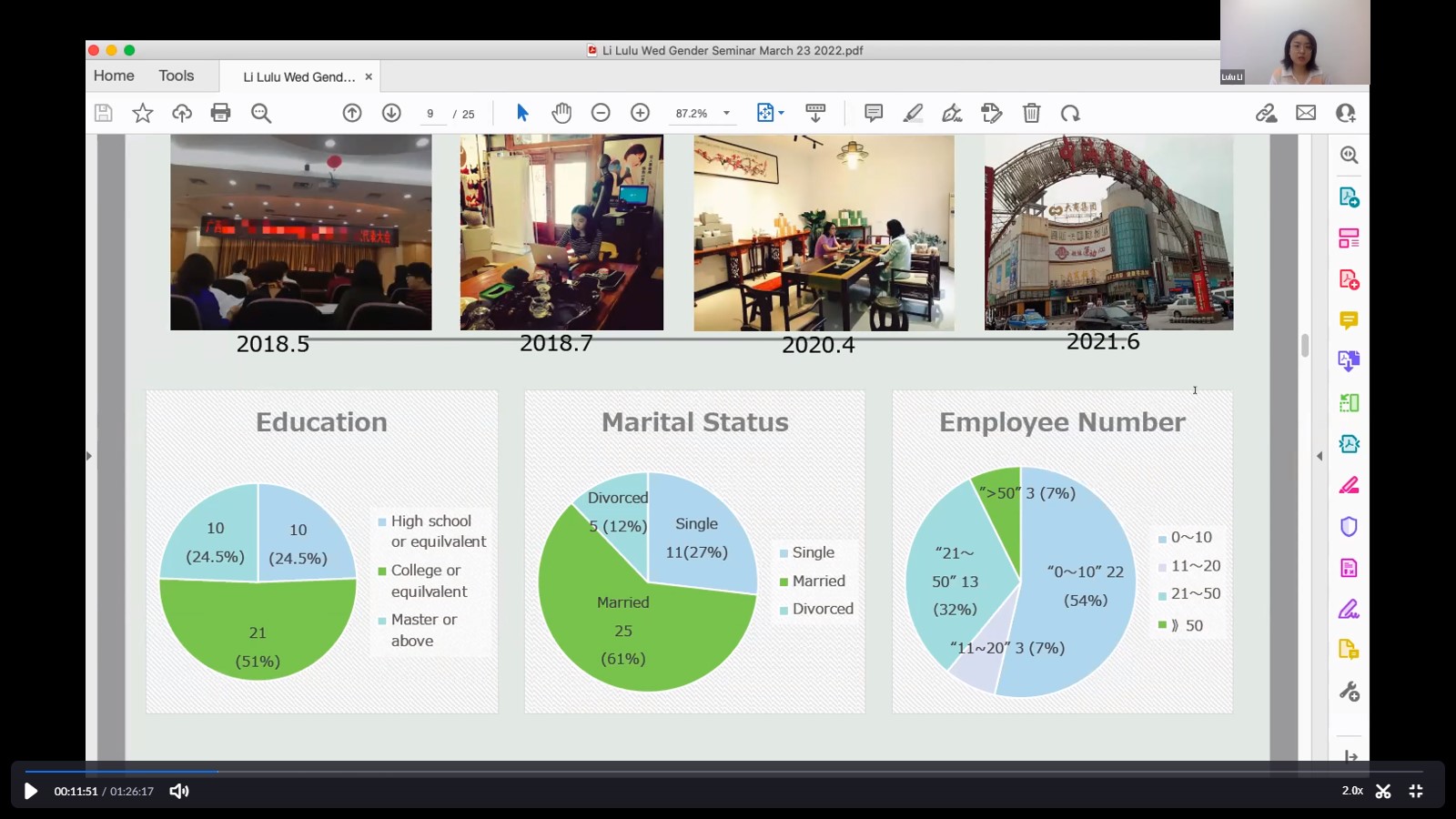 |
在2022年3月23日的週三性別座談會上,香港中文大學性別研究課程及社會學系的博士候選人李露露分享了她的研究——“中國女性創業者的性別化商業行為:對兩個內陸省份的案例研究”。中國自2016年推行了“大眾創業,萬眾創新”的政策,為女性創業帶來了前所未有的機遇。然而,創業通常被認為是以男性為中心的活動,並且主要集中於經濟發達的沿海地區,內陸地區的女性創業經驗在過往研究中僅獲得較少的關注。基於這一背景,李露露對41位內陸地區中小城市的女性創業者進行了深度訪談,探究了她們的創業動機,並分析了她們在創業過程中遇到的性別化機遇與挑戰。研究將女性創業者歸為四類:在以經濟原因為創業主要動機的女性中,“有信心”的女性創業者們獲得了來自家庭的支持和當地資源的扶持,而與之相比,另一些“有理想”的女性則需面臨著缺少本土社會網路和婚戀壓力的困境。在以家庭因素為主要創業動機的女性中,一部分人從家庭中獲得了充分的情感和經濟支持,使得她們“順理成章”地嘗試新的商業機會;而另一些人,則是在“機緣巧合”下開始了自主創業,她們希望通過創業尋求自我價值的同時履行傳統的家庭性別角色。研究結果表明,女性對個人職業理想的追求和家庭原因的考量是影響她們創業決定的關鍵。相較於沿海發達地區,這些內陸地區的女性創業者們在更為保守的社會環境下積極地探索商業機會,調動本土資源,塑造了性別、階層和地緣相互交織的獨特創業經歷。
撰文:ZHOU Siyuan, GU Yuxuan
16 Mar 2022 (Wed) Becoming Insurance Agents in Hong Kong Career Choice and Social Mobility among Highly Educated Women from Mainland China
 |
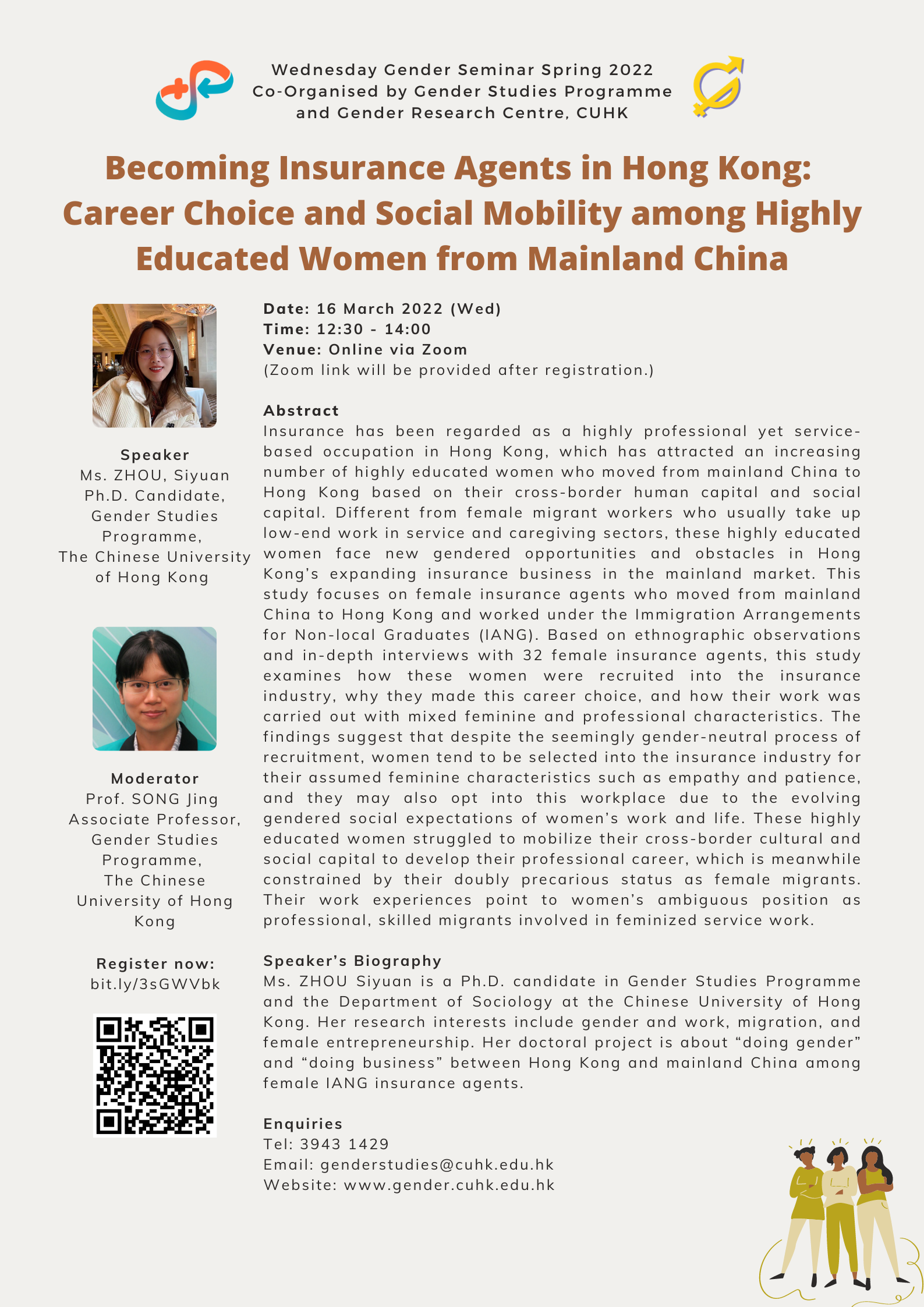 |
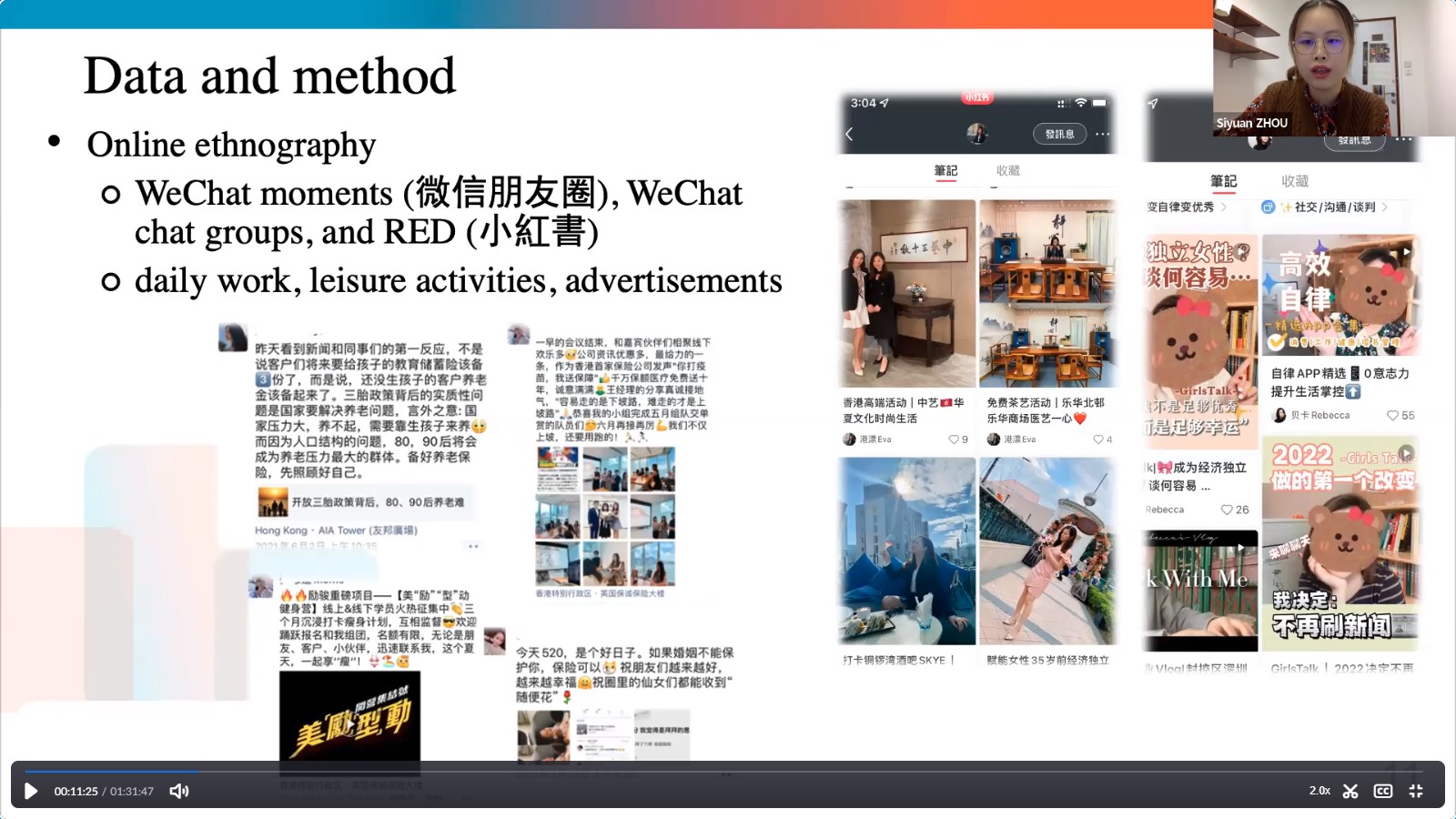 |
在2022年3月16日的週三性別座談會上,香港中文大學性別研究課程及社會學系的博士候選人周思媛分享了她的研究——“成為香港的保險代理人:中國內地高學歷女性的職業選擇和社會流動”。近十年來,香港保險行業重視內地市場的業務拓展,這一趨勢吸引了大批高學歷的內地女性持IANG簽證到香港開展保險代理人的工作。通過與32位元女性代理保險人的深度訪談,周思媛探究了她們進入保險行業的招聘過程,以及為選擇成為保險代理人的原因。她從結構與個人層面分析了其中的性別因素,發現女性保險代理人常因為被認為具有仔細、耐心等傳統的女性特質而被錄用。保險行業的性別優勢能夠幫助她們更好地成為獨立職業女性,回應不斷發展的社會性別期待。但是,在運用跨境資源實現個人職業理想的過程中,她們面臨著來自“女性”及“移民”身份的雙重困境,這揭示了女性的職業選擇依然受到父權社會性別分工的影響,並伴隨著職場和家庭層面中的結構性不平等。
撰文:YANG Zhiyu
9 Mar 2022 (Wed) Single-Sex Schooling and Students’ Interpersonal Development
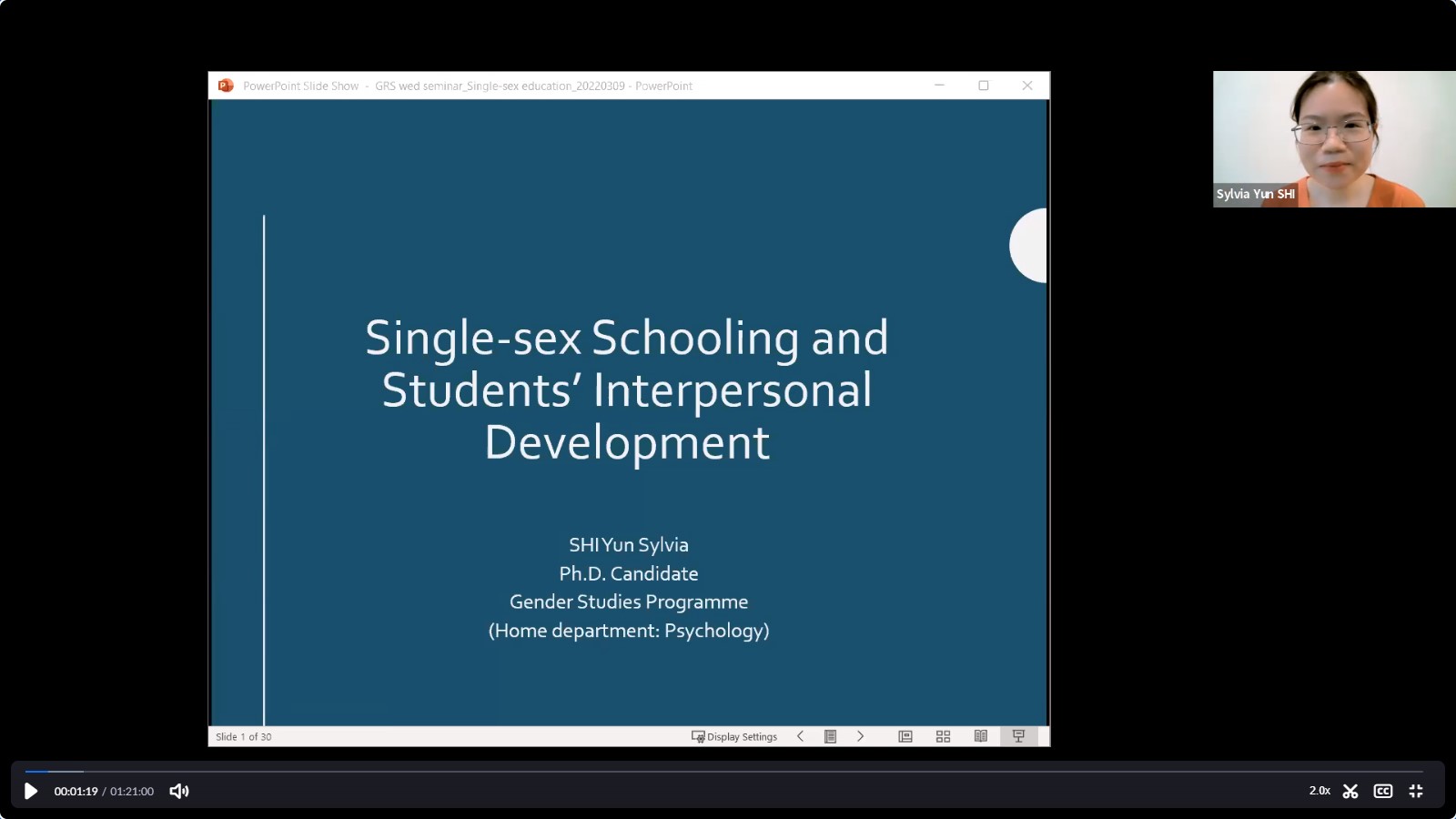 |
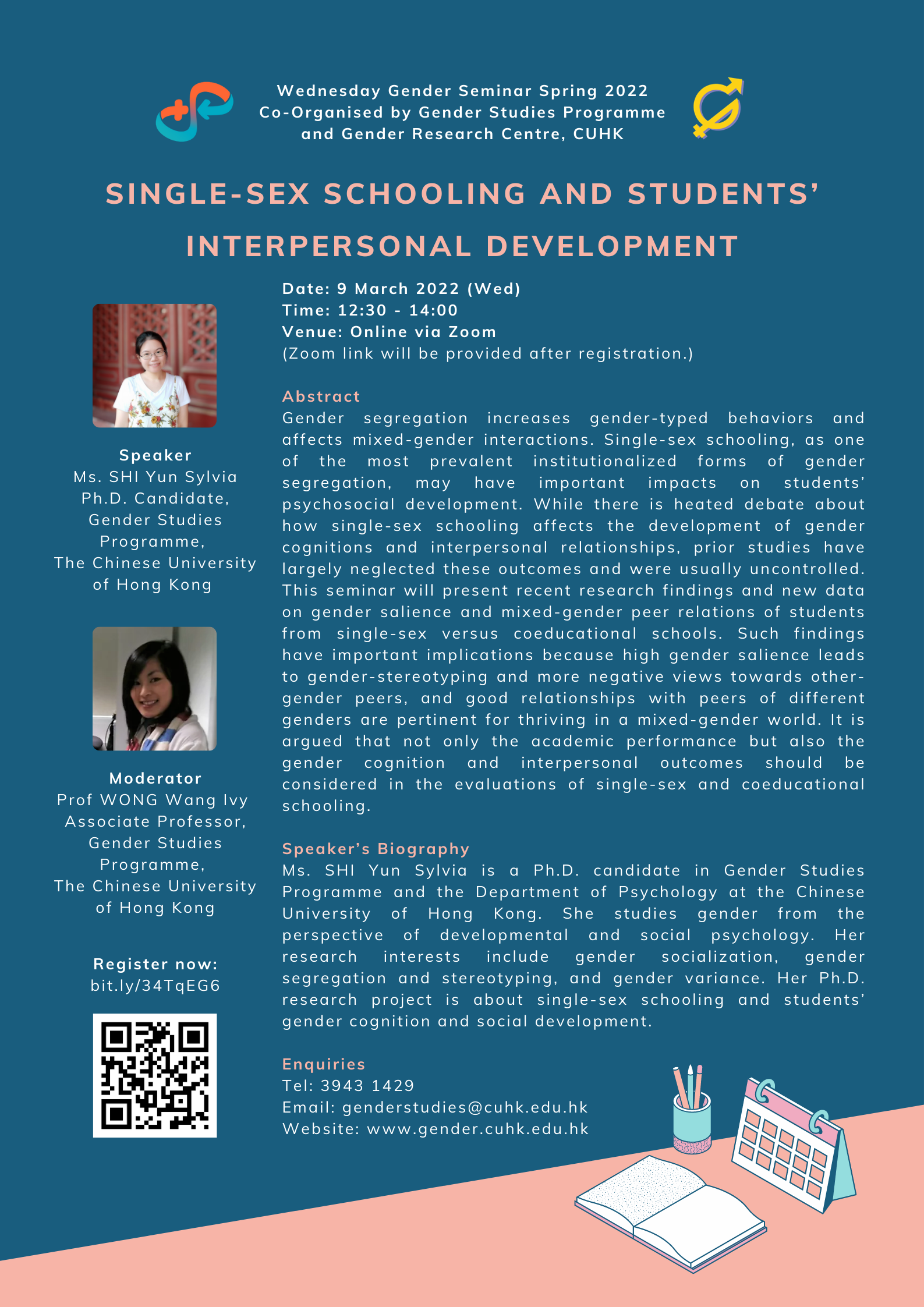 |
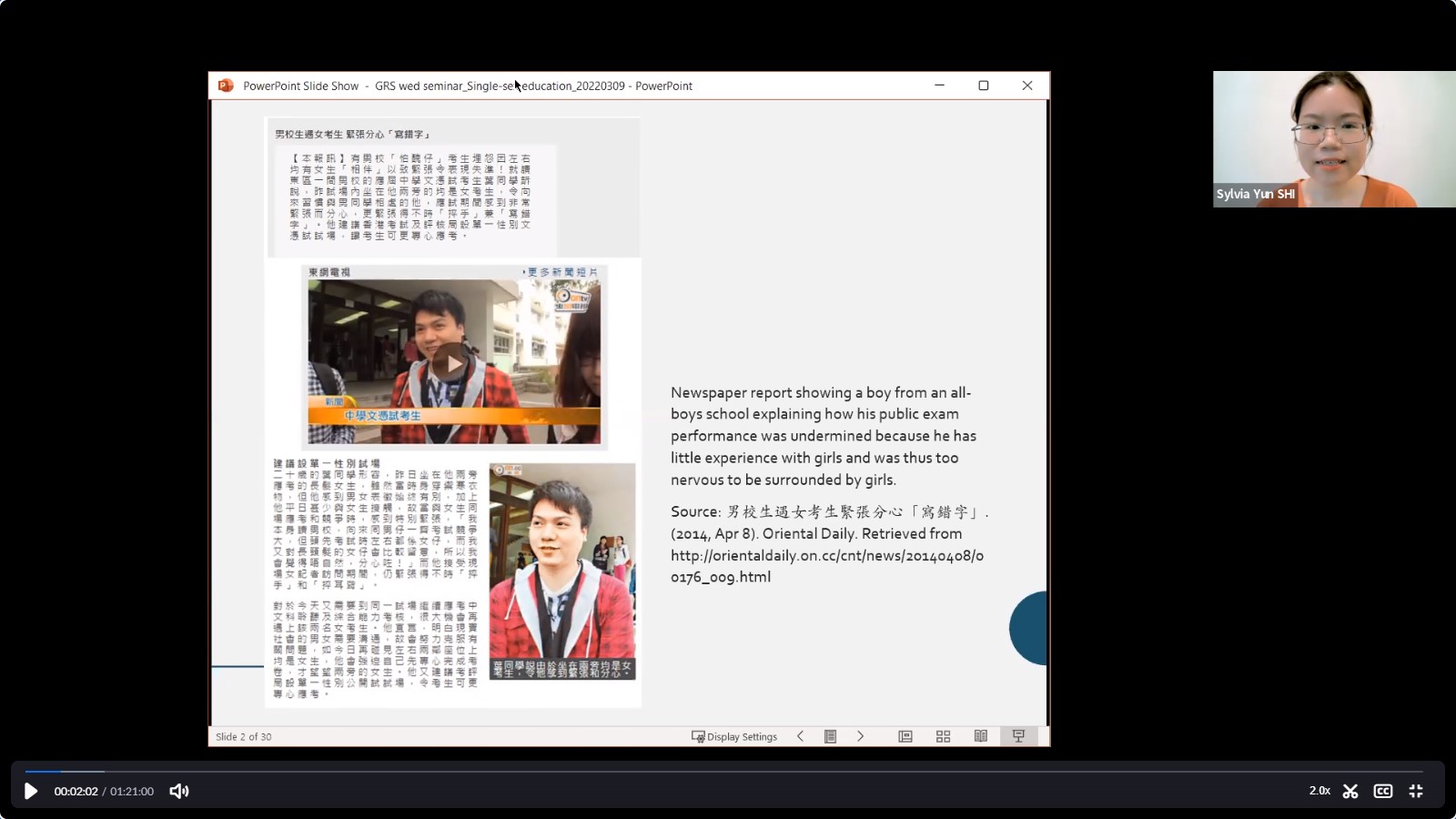 |
在3月9日的周三性别研討會上,香港中文大學性別研究專業的博士研究生施韻Sylvia分享了她關於單一性別教育與學生個人發展的研究。
作為一種制度化的性別隔離模式,單一性別教育最初是為了彌補女孩缺乏教育及其他世俗原因所建立的。如今,這種模式的教育仍然很普遍,並在近幾年中再次流行。
然而,單一性別教育是一種有爭議的教育形式。一些人認為它對男孩和女孩的教育都有不同程度、不同方面的好處,另一些人則反對以上觀點。
通過回顧群體發展理論與同伴社會化理論,施女士的研究致力於回答以下研究問題:單一性別教育和混合性別教育下的學生是否在性別相關認知層面有差異?單一性別教育和混合性別教育的學生在與同性和異性的相處中是否有差異?當單一性別教育的學生畢業並進入混合性別的環境後,這種差異(如有)會不會改變?
在橫向研究中,兩組參與者樣本包含香港單性別學校和男女同校的男女生。第一組樣本包括2059名高中生,第二組是456名大學生。前一組在教室完成調查問卷,而後一組在實驗室完成。關於評估量表,在單性別高中裡,性別更為顯著。此外,單性別高中的學生擁有異性及親近朋友的比例較男女同校高中的學生更低。並且,單性別高中和大學中的學生更易在混合性別環境中感到焦慮,但這在大學生中並不顯著。
在縱向研究中,施女士設置了兩條時間線,兩段時間對應的分別是高中的最後一年,以及畢業後。兩條時間線的時間間隔為16.62個月。研究所抽取的樣本涵蓋了超過100所香港本地高中,研究變量則是包含了人口特徵、性別顯著性、性別刻板印象等。本研究表明,學校裡的性別隔離會影響學生的性別認知和社會成就,包括性別刻板印象、友誼、性取向等。儘管這些影響會隨著時間逐漸消失,但單一性別學校的學生在畢業後,在混合性別的生活中的社交技巧較為缺乏。關於單一性別教育所帶來的影響,還有許多問題等待解答,尤其是對學生非學術成就方面的影響。
撰文: GAO Xinning, ZHOU Shanshan, ZHANG Kunyu
16 Feb 2022 (Wed) Politics of Dating Apps
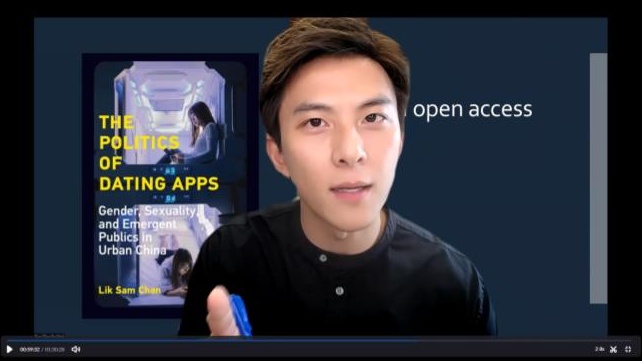 |
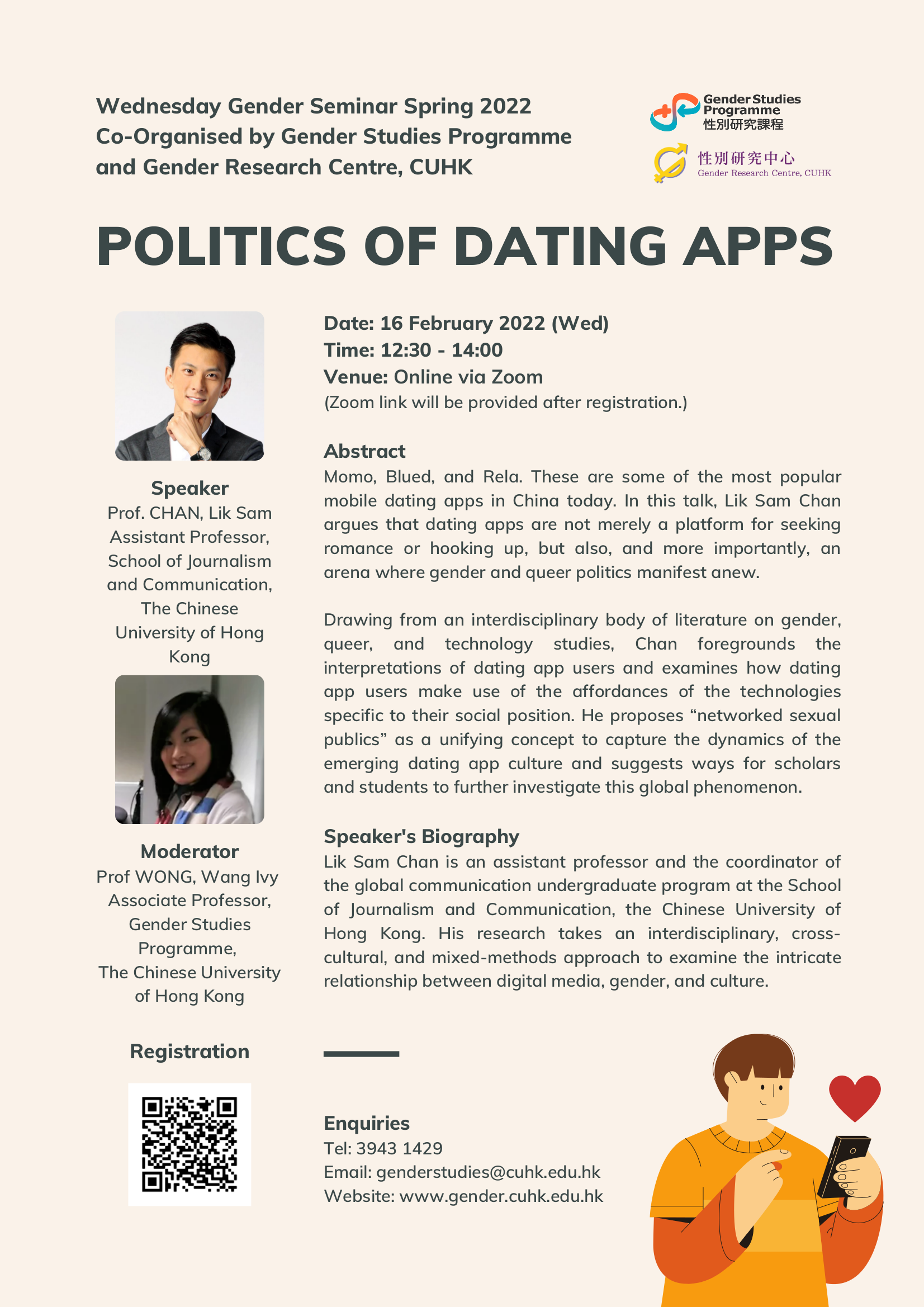 |
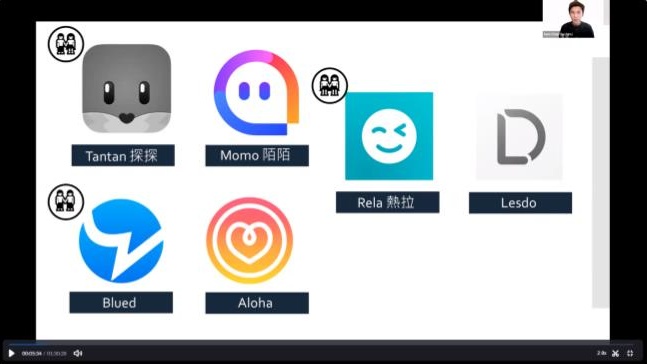 |
在2月16日的周三性別研討會上,香港中文大學新聞與傳播學院助理教授CHAN Lik Sam通過Zoom在線講座,為我們講解了他關於「約會應用中的政治學」的研究。
運用深入訪談和批判性的方法,Prof. CHAN, Lik Sam對其身邊使用約會應用的朋友進行深入交談,了解他們使用這些軟件的動機,分析他們使用軟件的經歷與體驗,將約會應用程序用戶的解釋作為重點,最後Prof. CHAN建立起了約會軟件與個體政治之間的聯繫。他認為約會軟件不僅僅是一個尋求浪漫或勾搭的平臺,更重要的是,它是一個重新體現性別和同性戀政治的舞臺。
同時,Prof. CHAN從性別、同性戀和技術研究的跨學科文獻中汲取營養,研究約會應用程序用戶如何利用其社會地位所特有的技術能力。他提出了 "網絡化的性公眾" 作為一個統一的概念來捕捉新興的約會應用程序文化的動態,並建議學者和學生在未來採用交叉性的思維進一步研究這一全球現象。
他指出,我們需要呼籲為維護社會權利而鬥爭。異性戀社會以外的空間已經通過約會應用得到了較大的關註,如果網絡性話題是潛在的,那麼通過約會軟件來建立我們的身份認同會帶來一個更加性別平等和同性戀友好的世界。比如,使用應用程序為女性尋找「性」,實際上是幫助她們了解自己的一種方式。
展望未來的研究,Prof. CHAN認為如果想要注意人們對於約會應用或行為的不同解釋,就應該採取交叉思考,事實上,每個網絡上的性公眾至少擁有兩種身份——男性和女性,同時我們還需要考慮年齡、城鄉地區等因素,這些尚未討論的交叉點也許會影響到用戶對應用的使用,需要我們進一步的研究與探討。
撰文:LUO Xilu, GAO Yuting, XIA Mohan
19 Jan 2022 (Wed) Queering Chinese Kinship: Queer Public Culture in Globalizing China
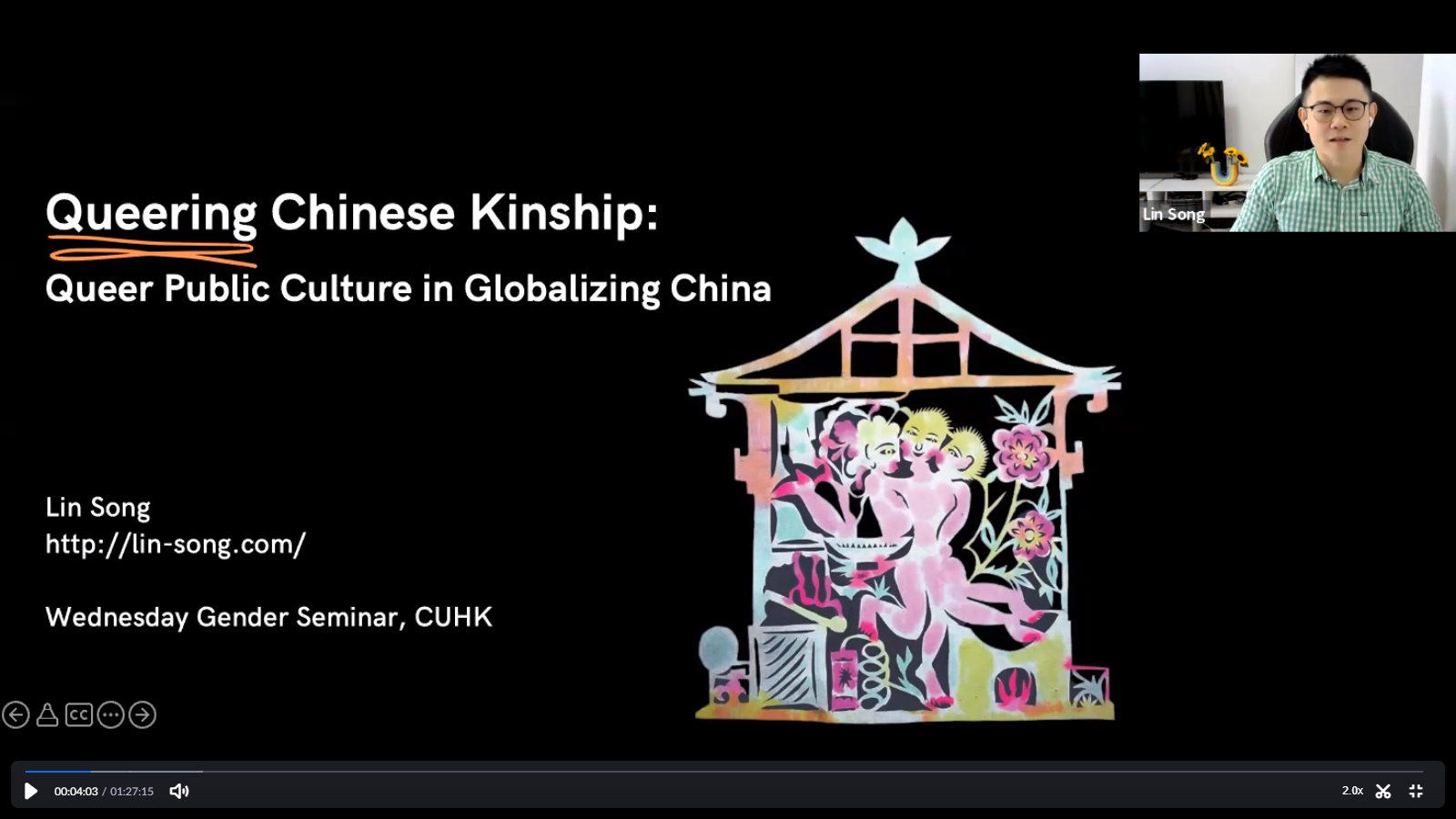 |
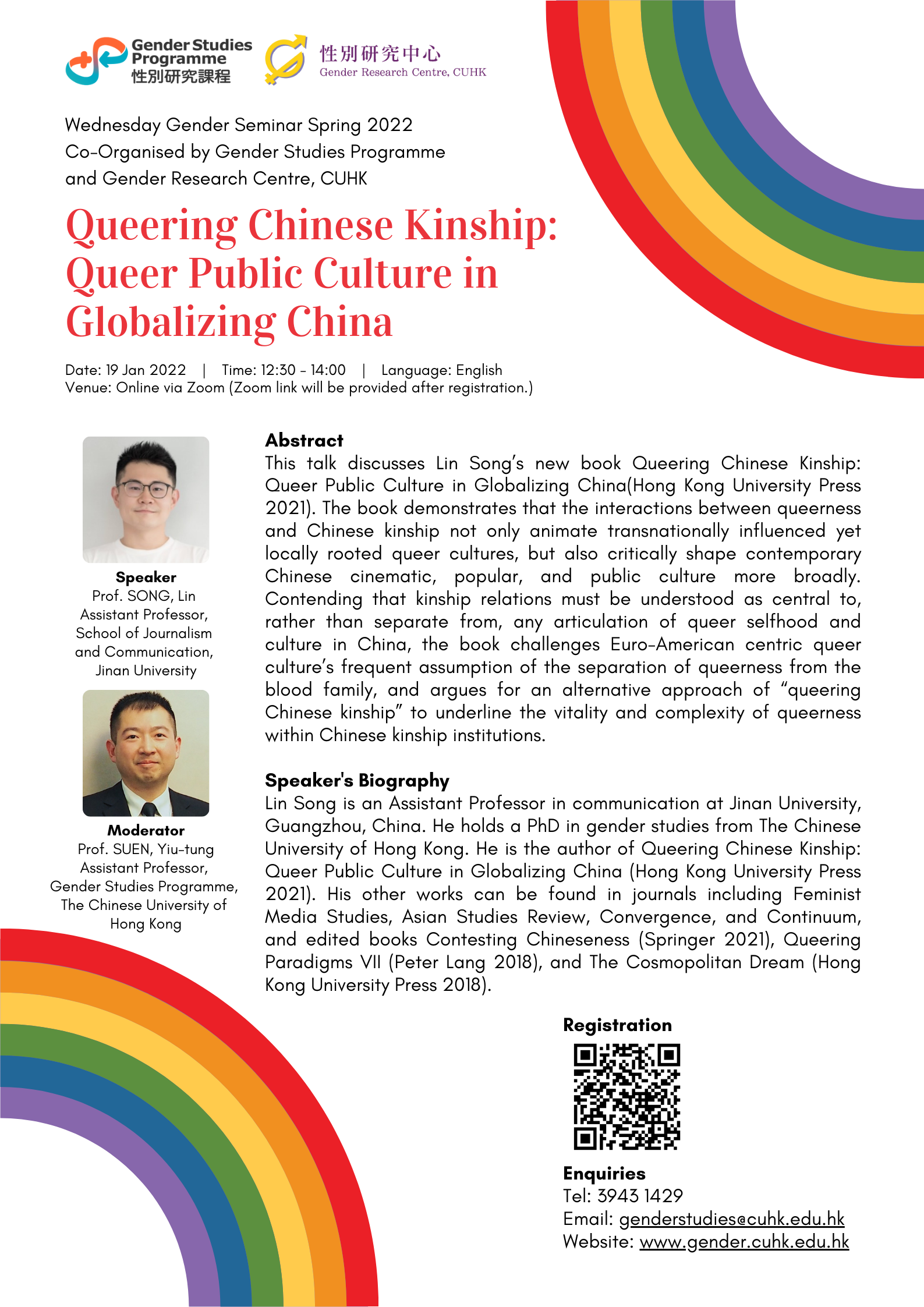 |
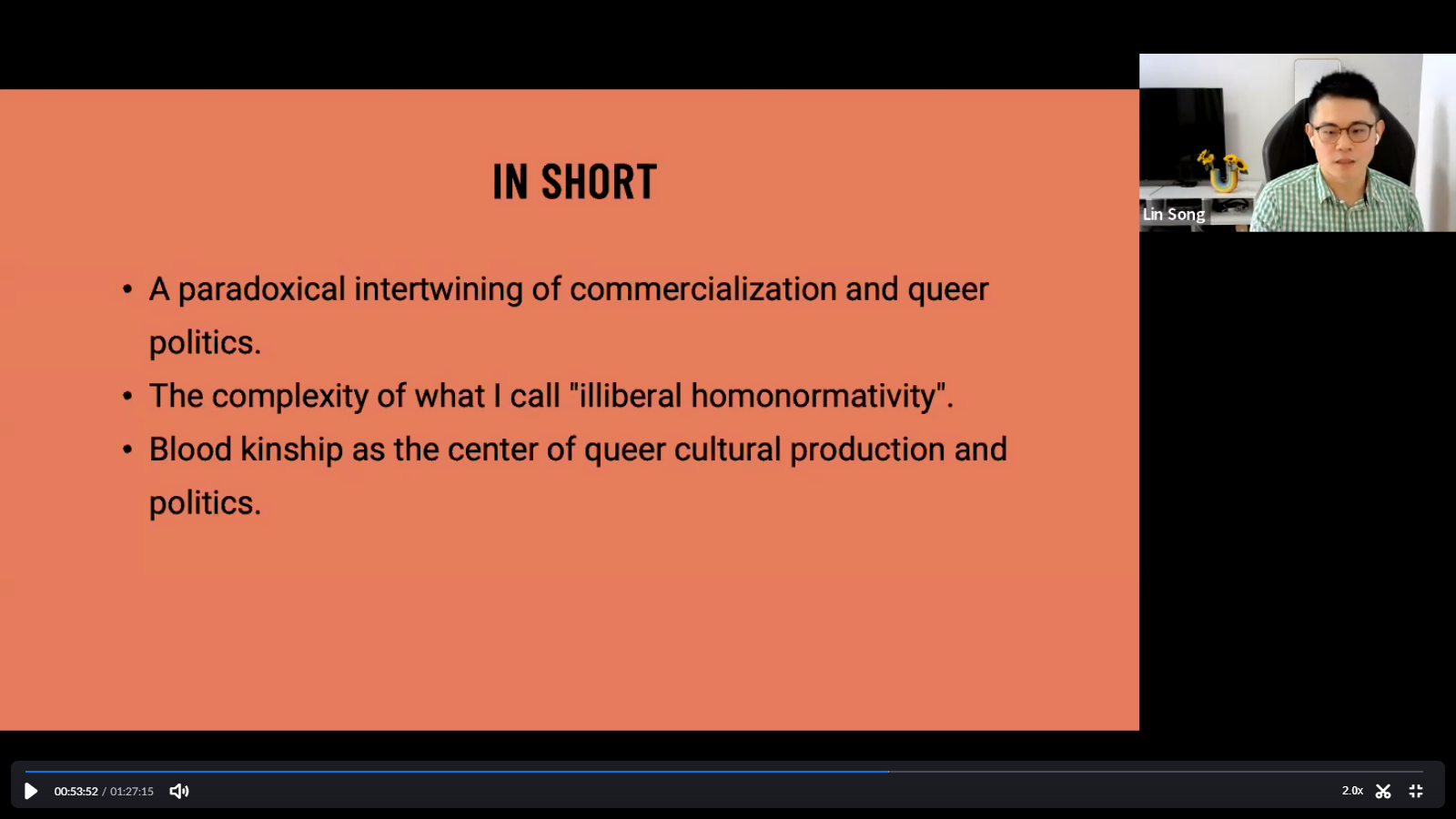 |
有感於西方酷兒理論所強調的出櫃及自由主義等概念不盡反映其自身及中國同志的經歷,宋教授(Prof. SONG Jin)著眼於中國大陸同志、其經歷(situated reality)及相關網上公共文化,以建立解拆並理解華語地區酷兒親屬關係的理論,並提出以酷兒批評的視角(Queer criticality)取代單純的批評常態(critiquing normality)以考慮現實生活中人們的爭扎和真實狀況,從而重新思考當下的現實並提供具建設性的分析。
宋教授透過分析在Bilibili上同志影片博客的「一起向家人出櫃」(Coming out together to the family)的策略,提出有別於YouTube上的同志影片博客單獨向其支持者出櫃,中國大陸的博客較常以與其同性伴侶一起見家長的模式作為其出櫃影片,反映其酷兒自我(Queer Selfhood)的建構並非完全取決於個人意志(自己向觀眾出櫃),當中更常牽涉到與血緣家庭的談判和角力(家人接納其性取向或不接納)。
他指出Bilibili的商業同志影片生產及消費是矛盾的文化政治(Ambivalent cultural politics):既使同志得以呈現,亦限制了酷兒身份的想象。他分析了觀眾在跳幕上的反應並指出,「一起向家人出櫃」影片大受觀眾歡迎,許多同志影片博客亦因而更使用類似的模式拍片以確立其同志/酷兒定位。作為商業化的自我製作(self-making)和自我品牌(self-branding)的過程,這類影片呈現了既有的陽光同志形象/公式,鞏固了單偶制、一/零、公/婆的二元結構,大大限制了其他酷兒身份或實踐的想像。
宋教授總結中指出,於中國大陸商業化和酷兒政治存在著矛盾的交織。他認為在公共空間有限的情況下,更需要認真看待商業中的酷兒文化和政治,稱之為「非自由同性戀正典」(illiberal homonormativity)。
撰文:WONG Ka Hei
2021年春季
香港中文大學性別研究課程、性別研究中心合辦
03 Mar 2021 (Wed) 剖析中國西南地區宮頸癌預防實踐中的風險概念
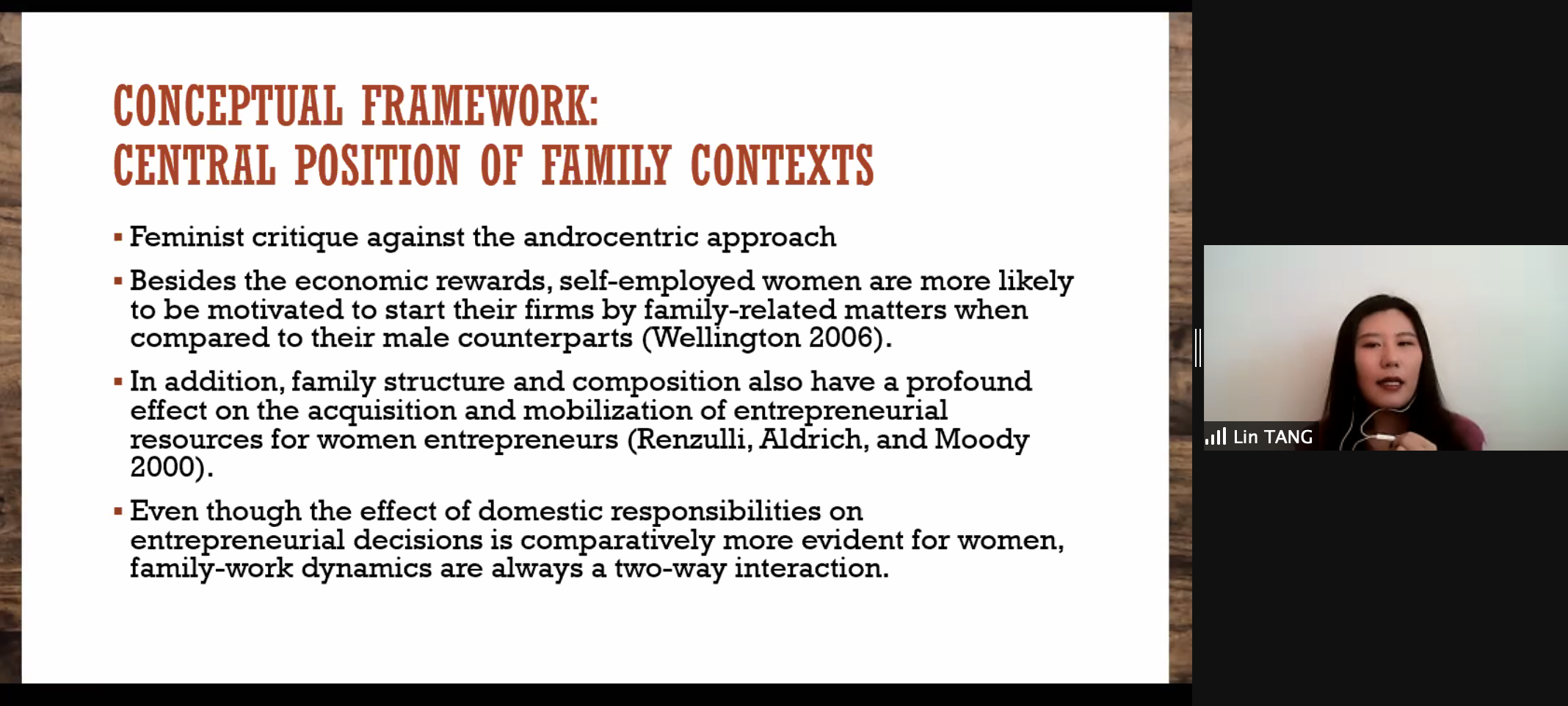 |
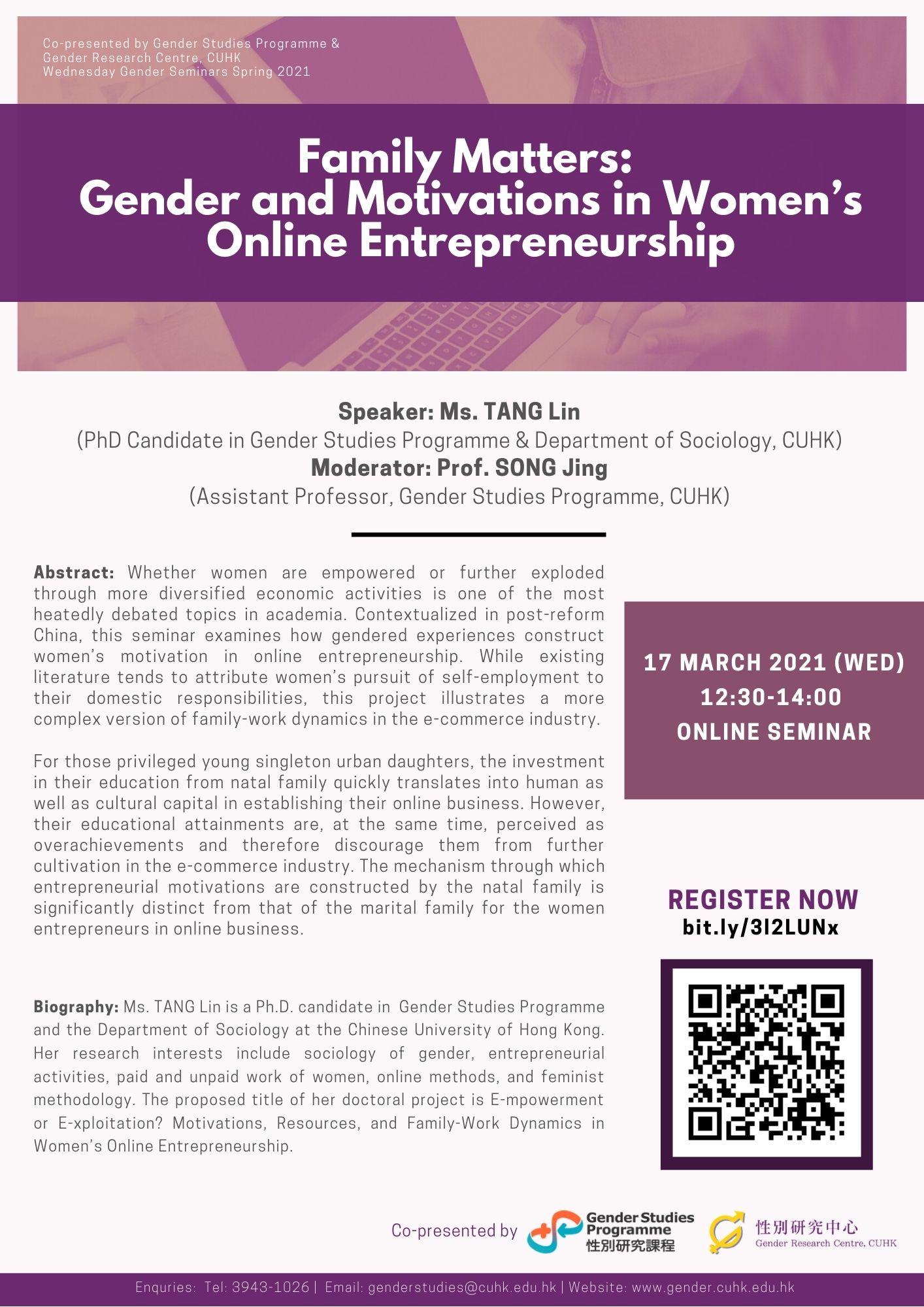 |
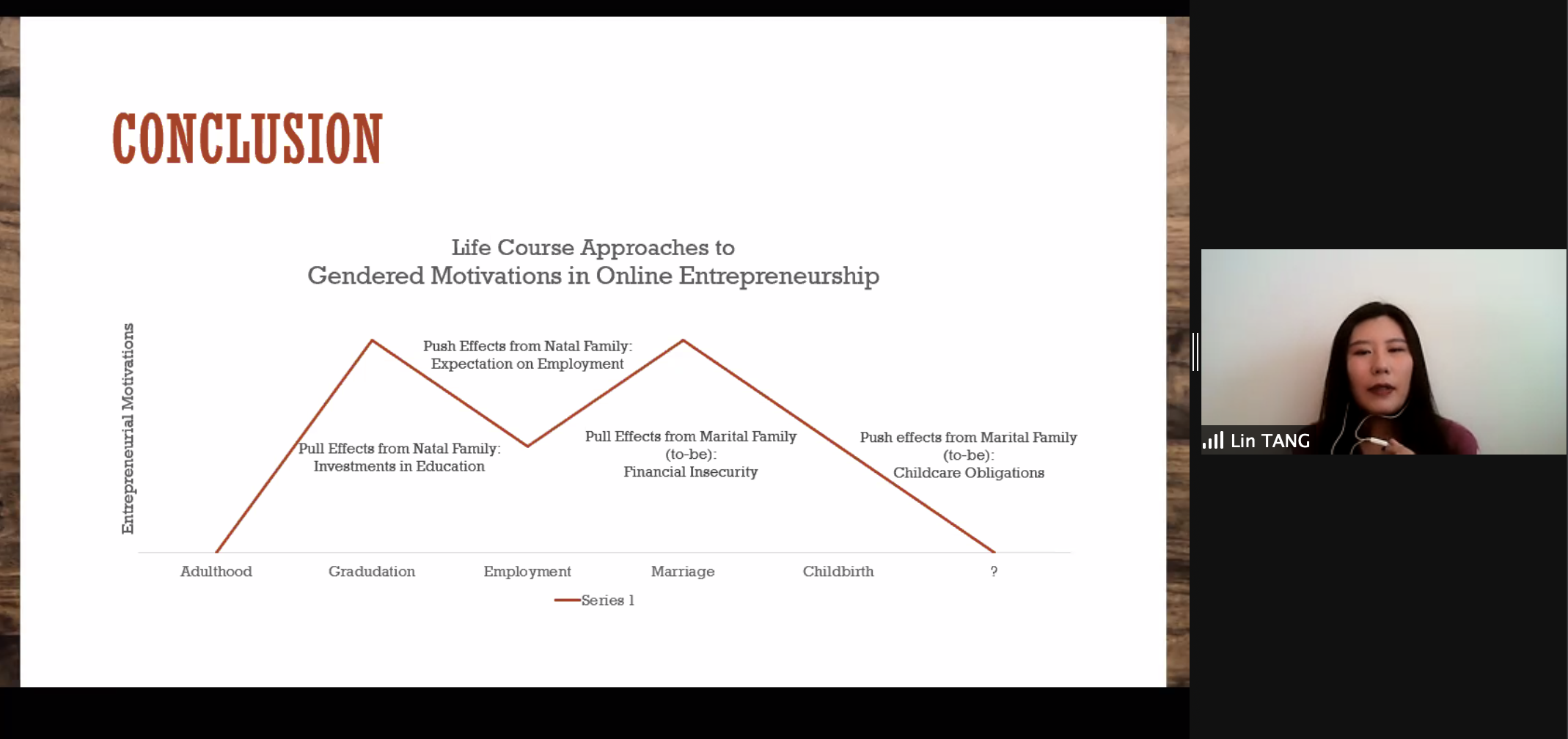 |
在2021年3月17日的週三性別座談會上,香港中文大學性別研究課程及社會學系的博士生候選人唐琳女士,分享了她正在進行的博士研究:性別經歷與家庭機構的關係如何影響與構建中國女性線上創業的動機。
在過去十年裡,互聯網的快速發展見證了中國女性比男性更多地參與電子商務一事。不僅淘寶50%以上的賣家是女性(阿裡研究,2015),微信個人賣家也有70%以上是女性(新民晚報,2017)。關於創業動機,以前的研究表明,男子更注重經濟,而婦女更注重成就和家庭。因此,婦女更有可能涉足與家庭有關的企業領域。此外,家庭工作的動態一直是影響婦女創業的重要因素。家庭的組成與結構,對婦女企業家獲得和調動創業資源也起到了深遠的影響。
通過深度訪談和網上民族志的調查,唐琳女士在她的研究中同時考察了婦女在其出生家庭和婚姻家庭方面的創業經驗,并重點關注一個更特殊的群體:那些受過良好教育的年輕女性,她們是其出生家庭的獨生女,且生活在較富裕的東部和南部沿海地區。採取生命過程視角,研究大學畢業、正式就業、同居或婚姻、生育及育儿等四項人生重要事件,唐琳女士對婦女參與網上創業的比例相對較高的問題,進行了更具動態敏感性和多層面的分析。
通過使用「拉入」和「推出」來構建她的分析,唐琳女士在以上這些年輕女性的地位轉變過程中,發現了兩組「拉推效應」,即將她們「拉入」網上創業的領域,或將她們「推出」此領域。作為都市中的獨生女,她們最初在研究生課程畢業阶段被「拉入」網上創業領域。成為“代購”,被認為是一種自發的行為,以彌補她們父母對其海外高等教育的投資。然而,在她們畢業回到家鄉後,由於社會對女性从事穩定、理想職業 — 如公務員、教師、行政人員— 的期望,她們開始離開網上創業的領域。正如她們及其父母所認為的那樣,網上創業只能是一種暫時性和過渡性的選擇。
如果第一組「拉推效應」發生在她們的出生家庭,第二組效應則出現在她們(現有或未來)的婚姻家庭。當她們開始與婚姻伴侶同居時,她們可能會被「拉入」網上創業以賺取額外的錢,特別是當她們伴侶的經濟情況不穩定時。然而,網上創業的動機無法提高婦女的權力地位。雖然部分女性的伴侶會提供言語鼓勵或實際行動支援,以幫助她們經營線上業務,但這些目標終歸是物質主義的。一旦她們懷孕並有了自己的孩子,育兒上的義務就會把她們從網上創業中再「推」出來。正如唐琳女士所觀察到的,在這一生命阶段,女性的線上創業動機急劇下降。對於那些仍然在堅持的女性來說,她們必須在家庭中的有償工作和線上經濟活動之間進行權衡。
撰文:香港中文大學性別研究課程博士候選人彭依伊、吳玥涵
及香港浸會大學語言學博士生王騰
03 Mar 2021 (Wed) 剖析中國西南地區宮頸癌預防實踐中的風險概念
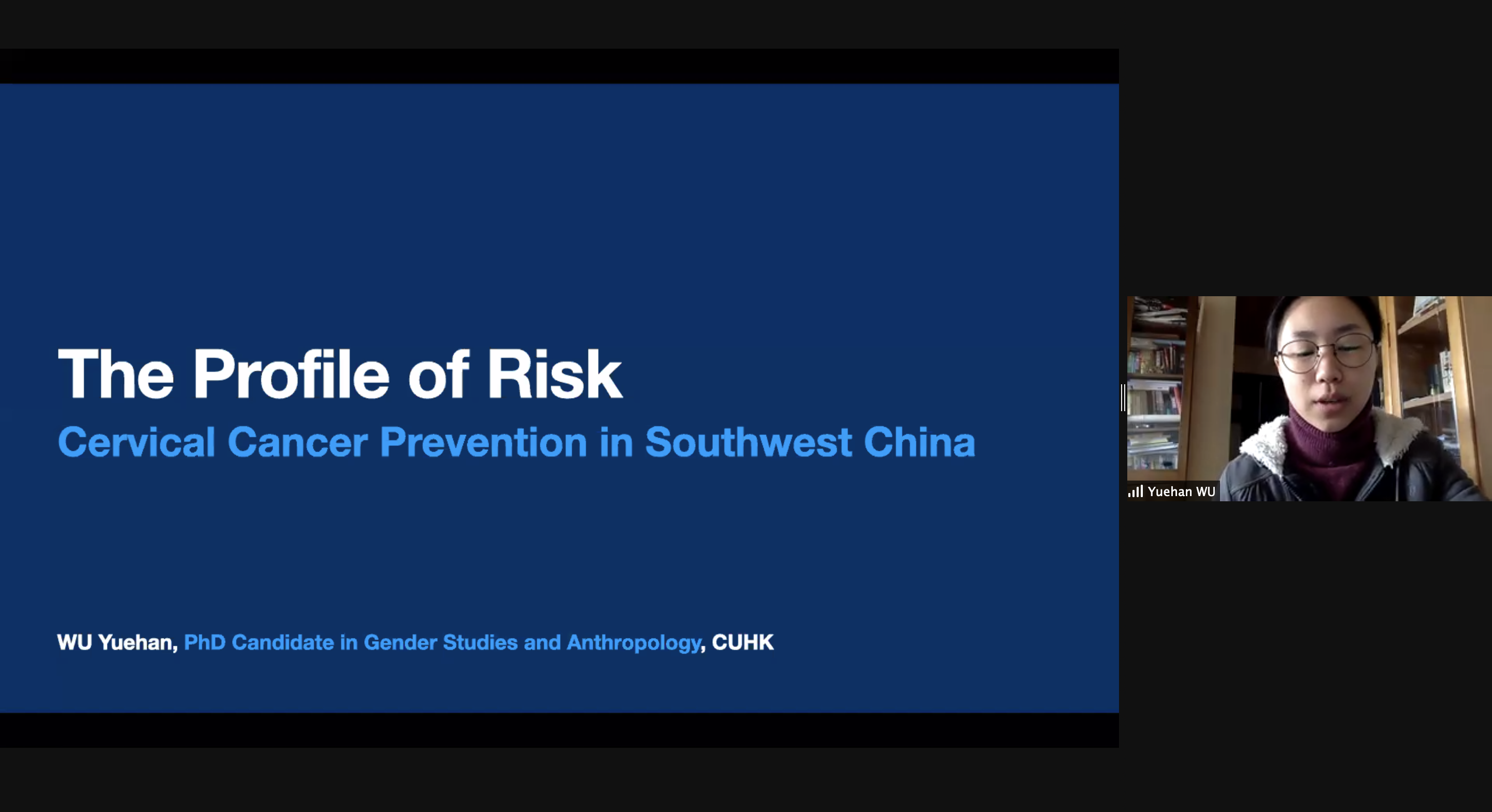 |
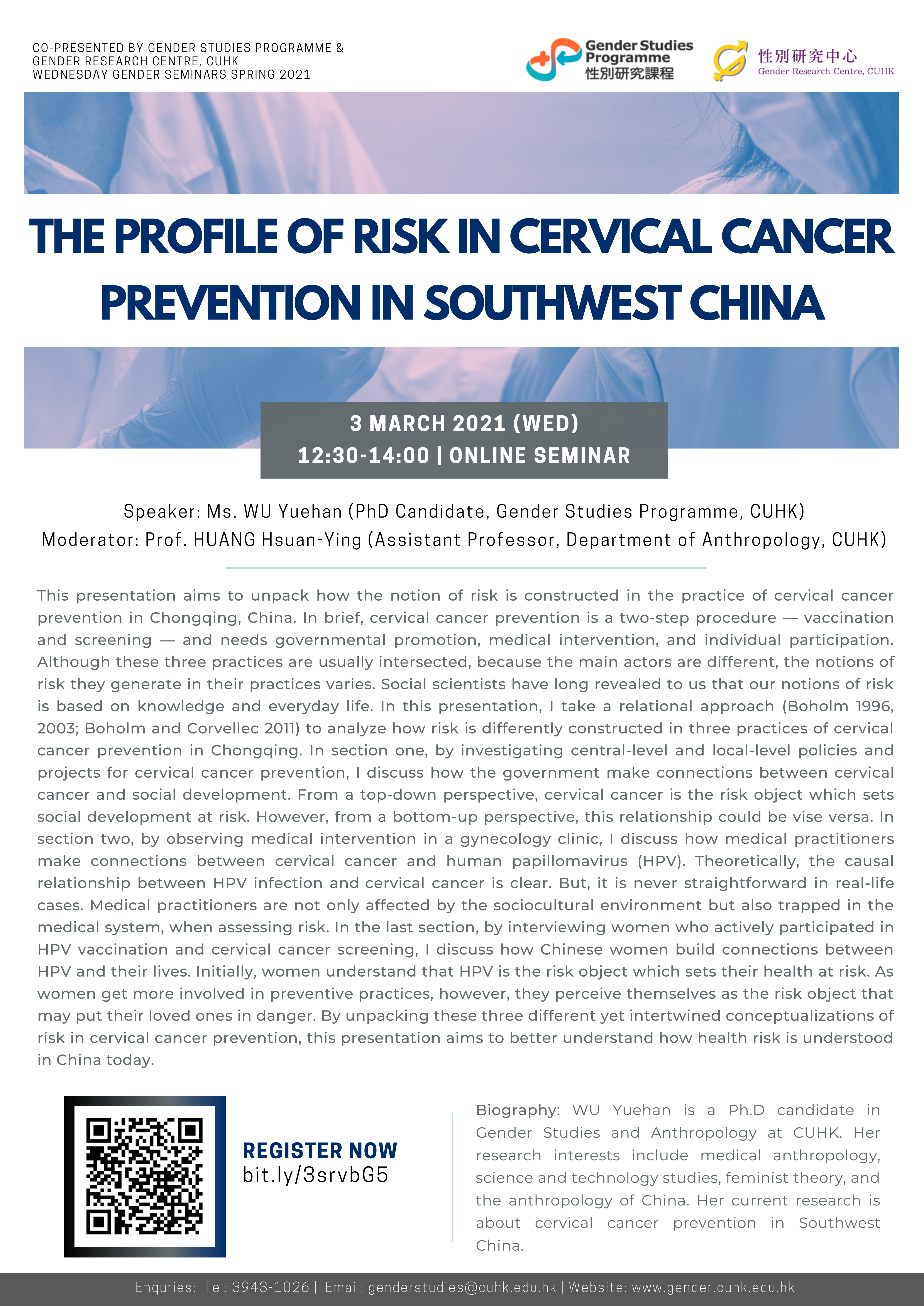 |
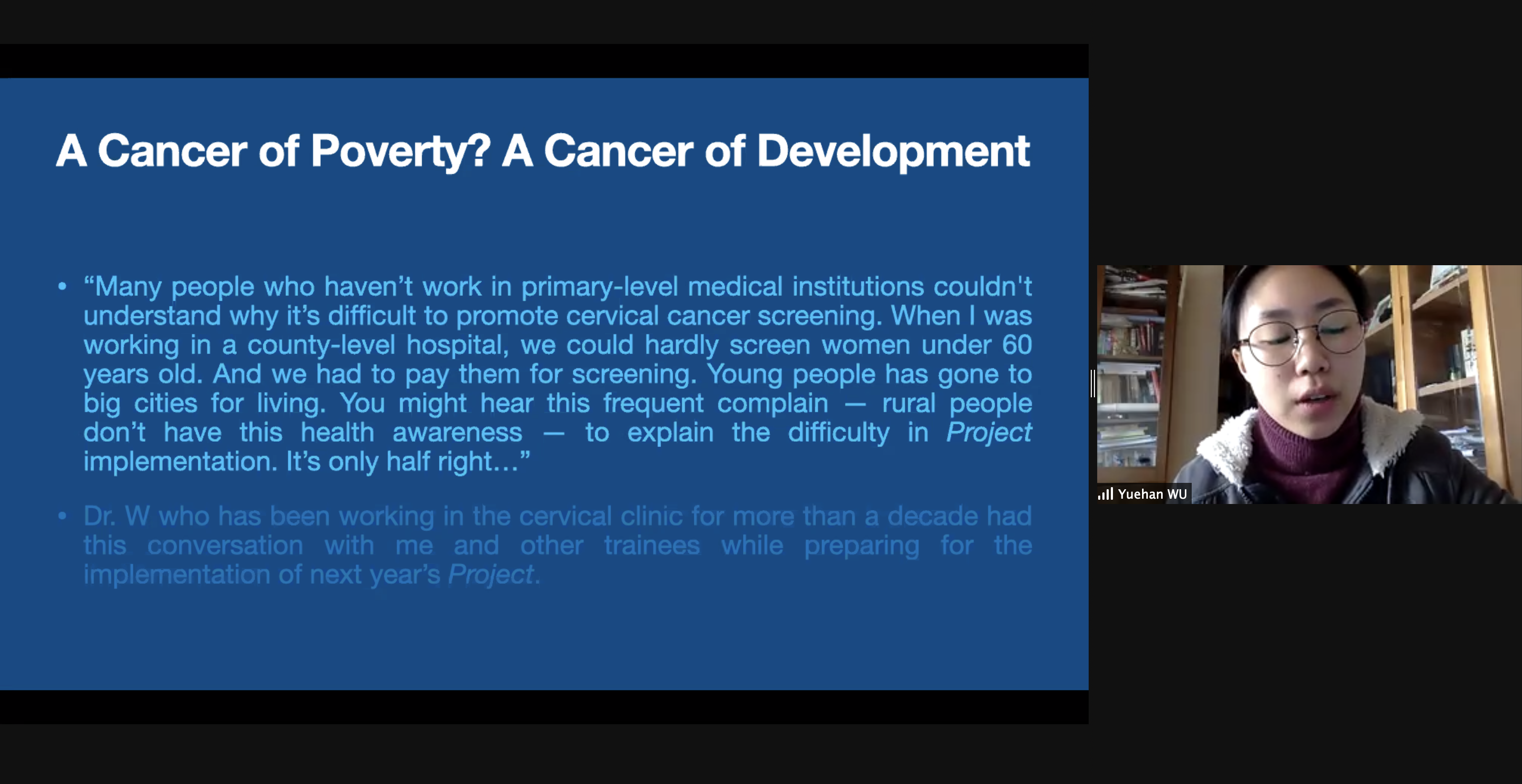 |
在3月3日的週三性別座談會上,來自香港中文大學性別研究課程和人類學的博士生吳玥涵從“風險是對當下環境認知的產物”的角度出發,從關係入手,為我們剖析了“風險”作為一種概念是如何在中國西南地區針對宮頸癌預防的實踐中被構建的。
她首先介紹了注射HPV疫苗作為一種在一定範圍內能夠預防宮頸癌的手段在中國的特殊情況:一方面,中國許多尋求注射疫苗的女性已經同時具備了女性-病人-消費者的三重身份,她們甚至願意也有能力為此去到香港等地,在承受高昂的時間和金錢成本的前提下完成HPV疫苗的注射。另一方面,儘管如此,中國仍然缺乏足夠的醫藥基礎設施和針對健康保障的投入。由於宮頸癌導致死亡的案例有將近百分之九十發生在發展中國家,而其中有五分之一就發生在中國。
吳玥涵分析,在中國,癌症預防在政府-醫院-個人三方的互動之下進行。政府一方面推動公共健康建設的發展,一方面卻又將責任置於個人之上。在醫院的層面而言,在醫學技術不斷發展、相關專家不斷增多的同時,醫患之間的信任危機卻難以解決。除此之外,擁有更高技術和更好設備的專家對更底層的醫生也缺乏信任,甚至由於長期高負荷地工作,醫生對自己本身的工作狀態都充滿懷疑。從參與宮頸癌預防的中國女性個人來說,她們作為風險的中心,既要承擔對社會的責任,又要扮演家庭中屬於她的角色,而她個人需求的重要性則往往被放在前兩份重擔之後。
通過在重慶一家醫院所進行的長達12個月的田野調查,吳玥涵發現,與其說宮頸癌是屬於貧窮的癌症,不如說它揭示了中國社會正在發生的社會變化和人們在社會發展中對更美好未來的嚮往。免費的癌症篩查只能在特定的時間段、在戶口所在地獲得,而農村女性作為宮頸癌的高發人群,她們之中的許多人往往在城市工作,只有在特定的假期才能回到家鄉進行篩查。中國宮頸癌篩查這樣的獨特困境應該在中國社會現今的發展變化中得到解釋。在觀察醫院是如何應對和HPV有關的宮頸癌患者時,演講者發現,生育作為核心的概念影響著醫生如何對病人的案例進行處理。如果病人年紀較輕且尚未生育,醫生往往傾向于選用更保守的治療方式。
吳玥涵從關係入手,認為可以從風險的主體、主體處在風險中和風險的關係三個元素來探討中國女性在這樣特定的環境中是如何應對風險的。她總結道,女性在處理她們和HPV的關係時,總是在同其中的不確定性打交道。在中國,針對HPV感染的汙名化仍然存在,社會輿論往往將其同私生活混亂關聯起來。而雖然男女都有可能感染HPV,但被汙名化指責的物件卻只是女性——在現在的中國,只有女性能夠接受HPV檢測。即便有女性懷疑是她們的異性伴侶將病毒傳染給了她們,對此她們也無從驗證。另外一種不確定性還在於感染HPV和宮頸癌本身複雜的關係中:並不是每個感染HPV的患者都會發展至癌症的階段,而每當遇到壞的結果,病人則往往會懷疑是自己的錯。由此,女性從遭受風險的主體變成了風險所在的中心,因為她們承受著對自己給家人帶來風險的恐懼。
-由性別研究課程文學碩士生張喻撰寫
20 Jan 2021 (Wed) 浴火重生:中国同妻、婚姻欺诈和抵抗
 |
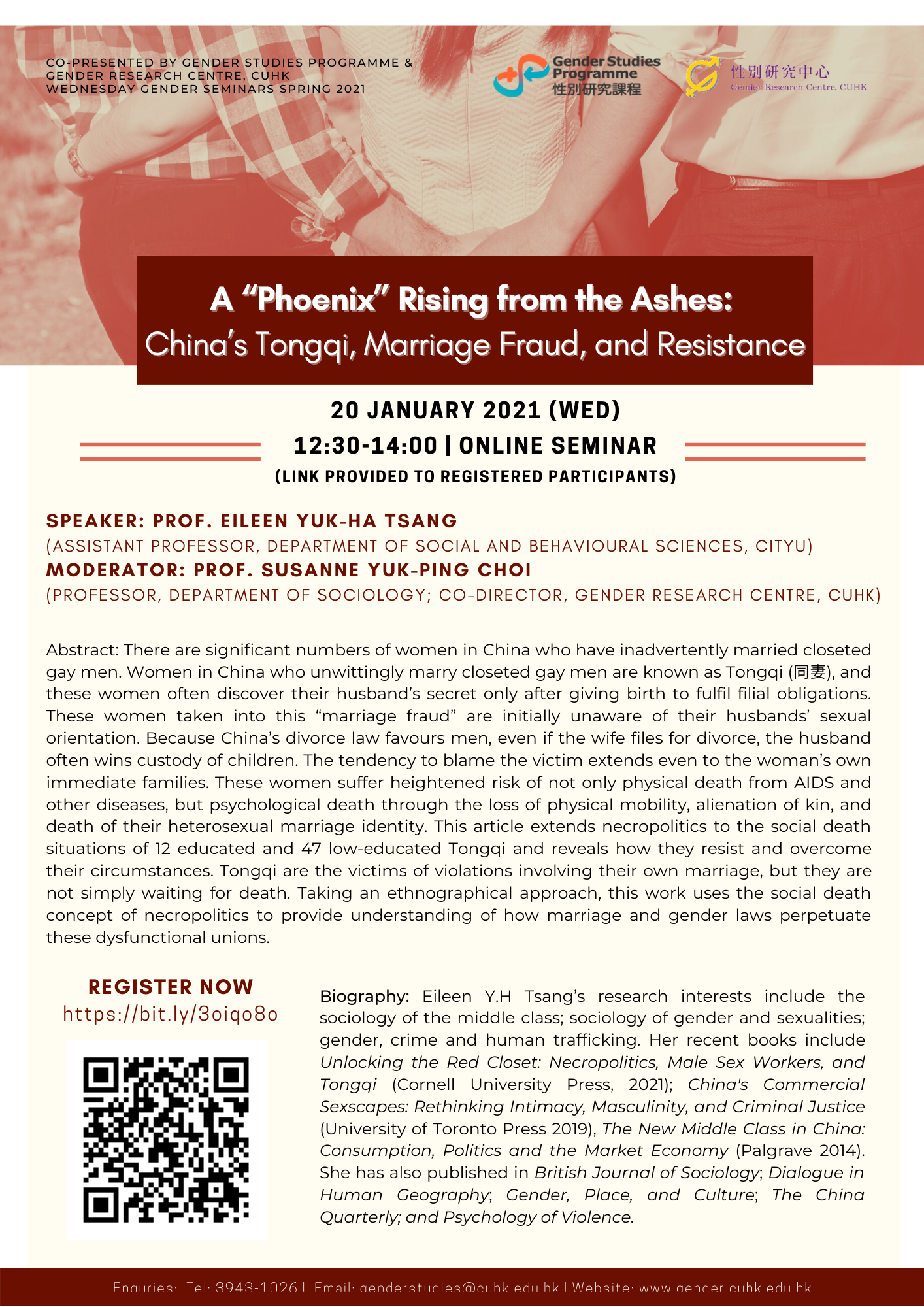 |
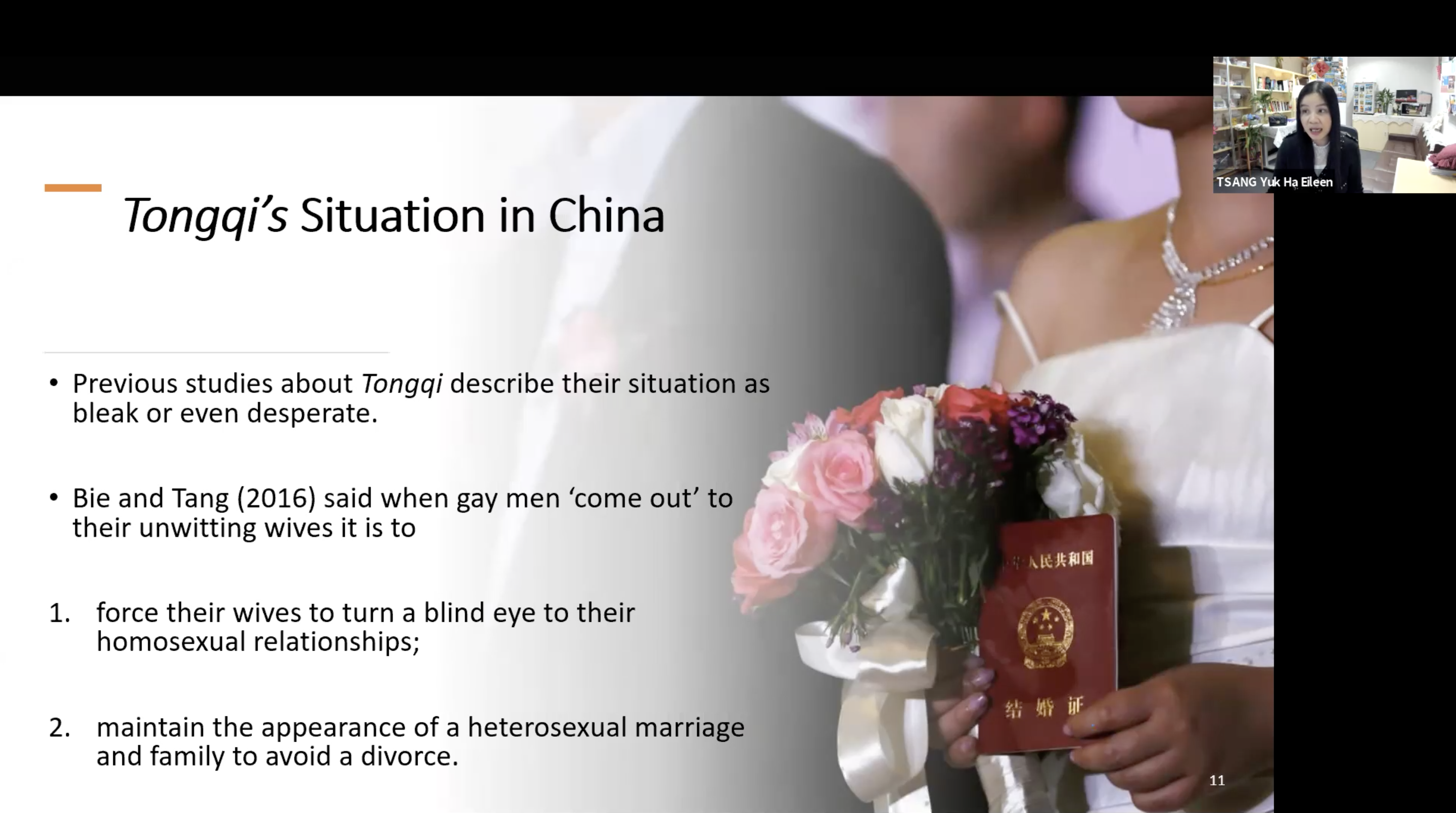 |
在1月20日的週三性別座談會上,香港城市大學社會及行為科學系助理教授——曾玉霞教授分享了在2015年至2019年期間所進行的關於中國社會「同妻」的研究。「同妻」指在不知情情況下與同性戀男性步入婚姻的異性戀女性,她們通常生育後才發現丈夫的性取向秘密。曾教授應用死亡政治學理論,並採用民族誌方法,調研了59位來自中國天津與東北部、受過不同程度教育的「同妻」,闡述了「同妻」於社會性死亡窘境中的機動性。
曾教授先簡述由哲學家Achille Mbembe的死亡政治學理論(necropolitics)所發展出的概念框架,概括了「同妻」面對的社會困境。她指出,弱勢群體由於被主流體制排外,得不到法律保障、文化認同或基本人權等等,從而步入社會性死亡。然而,曾教授也強調,「同妻」在選擇離婚、尋求愛滋病治療及在網絡與非政府組織的協助下,依然可見其能動性的空間。
曾教授指出,教育程度不高的「同妻」會基於家庭、經濟甚至社會污名的考量,而選擇繼續維繫婚姻。另一方面,受過更高等教育程度的「同妻」則會分別在法庭外或法庭內處理離婚。選擇庭外處理離婚的「同妻」,面對社會地位與權力薄弱的挑戰。提出離婚訴訟的「同妻」也遭遇困難,中國婚姻法不但不承認同性戀的存在,男性在獲孩子撫養權與共同財產的分配上更有優勢。然而,離婚成為她們得到尊嚴、伸張正義的出路,以此掙脫名存實亡的婚姻,開始新生活。
曾教授也提及,不幸經由丈夫而感染愛滋病的「同妻」,儘管疾病使她們有輕生的想法,但在家人與孩子的關心與支持下,則會主動尋求醫療協助及積極治療。「同妻」也會主動接觸非政府組織,以獲專業法律意見;在社交媒體網絡上也能瞥見「同妻」群組的蹤影,互相提供資訊,協助彼此。
曾教授的研究旨在為政策制定者、非政府組織在協助「同妻」方面提供新見解,提升對現行婚姻法律缺陷的關注,也期望能為負著「同妻」身份的女性,及為孝順義務而組織異性戀家庭的男同性戀者去污名化.
-由性別研究課程文學碩士生李敏婷及徐然撰寫
2020年秋季
香港中文大學性別研究課程、性別研究中心合辦
18 Nov 2020 (Wed) 小蜜蜂不要停:中國城市地產銷售中的臨時工作、性別化技能和過度流動
 |
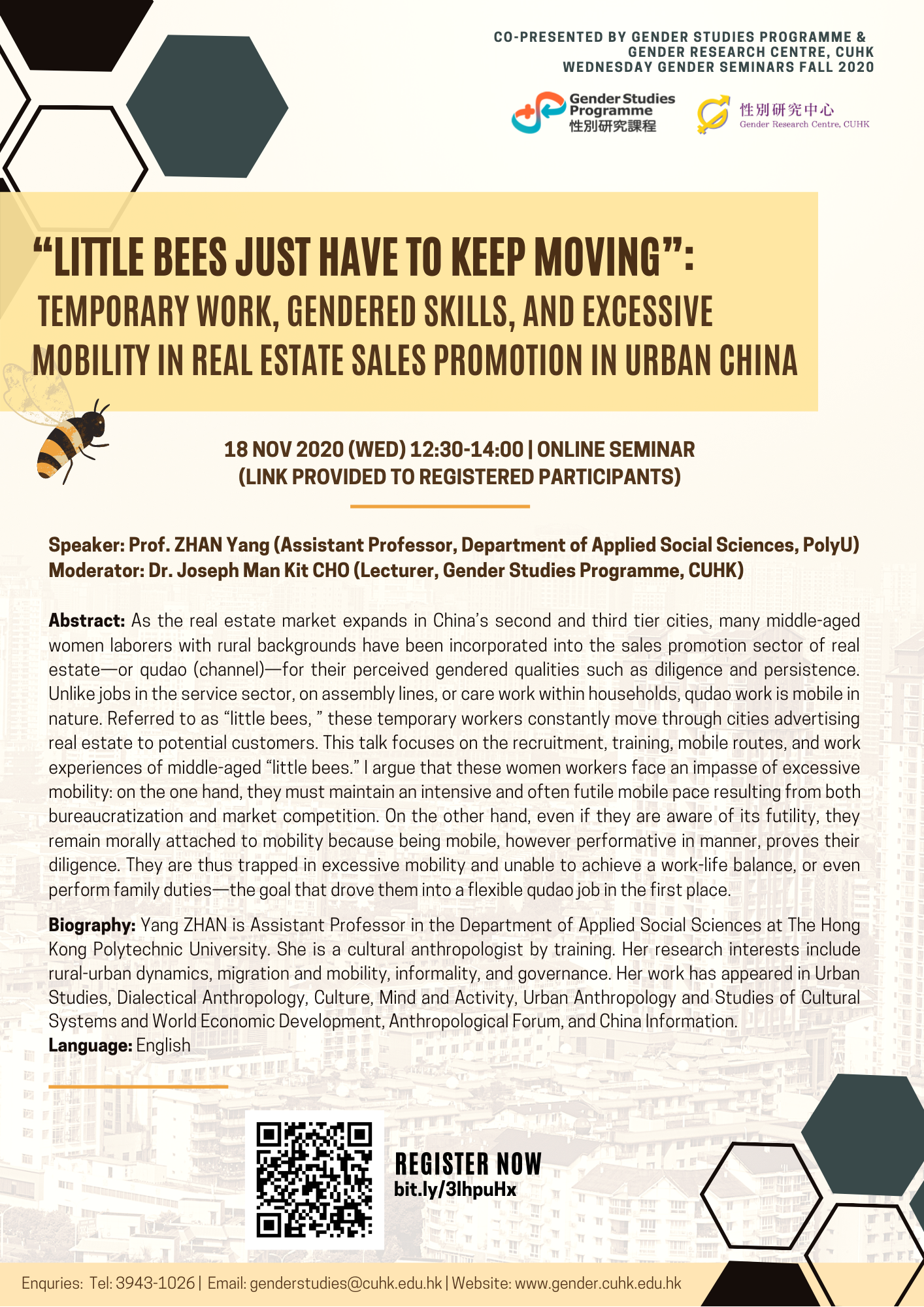 |
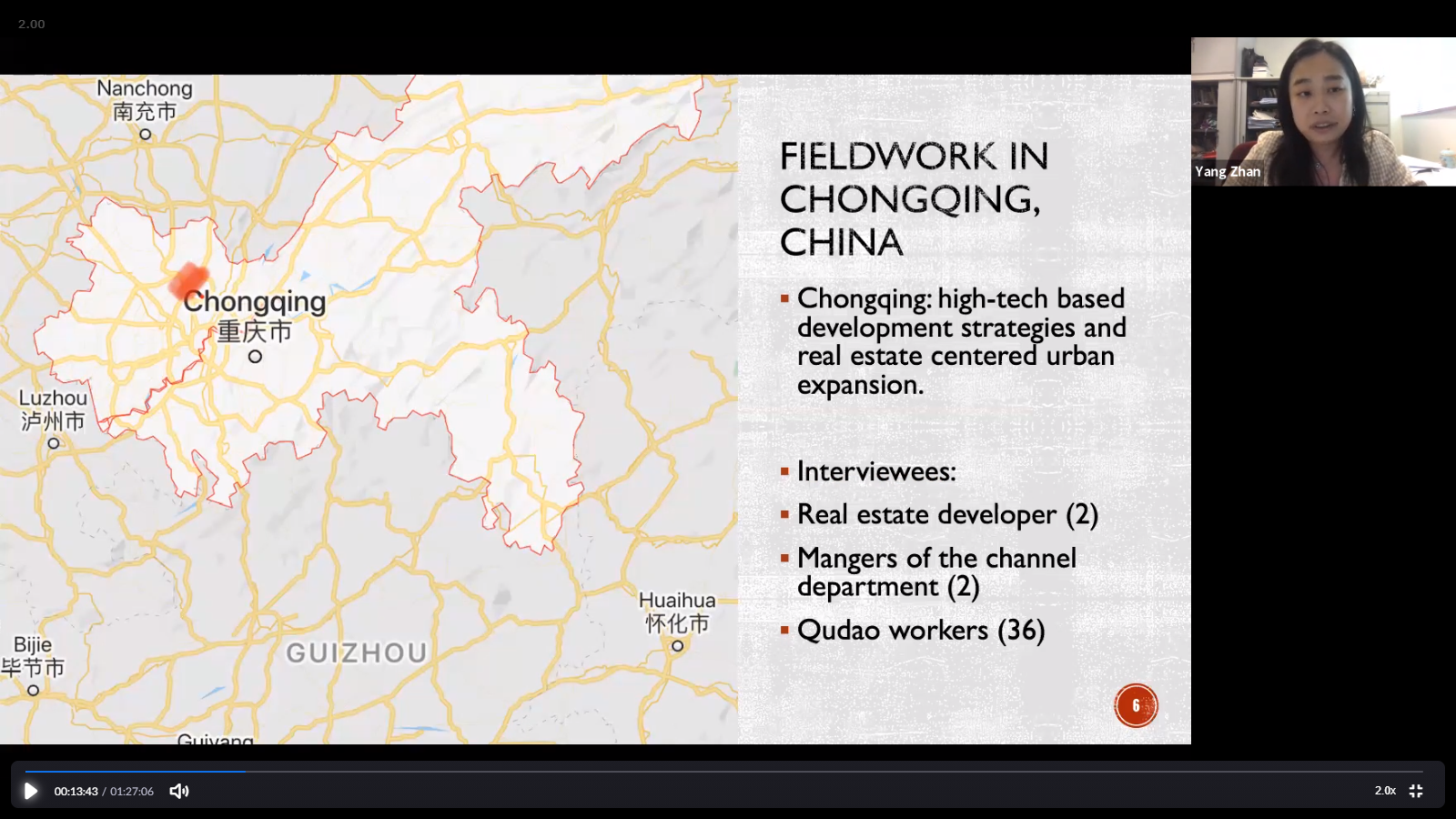 |
2020年11月18日週三,來自香港理工大學應用社會科學系的助理教授戰洋,在香港中文大學性別研究課程講師曹文傑博士的主持下,開展了名為“小蜜蜂不要停:中國城市地產銷售中的臨時工作、性別化技能和過度流動”的zoom網路講座。戰洋教授運用社會科學的研究方法,分享了她對於這些“小蜜蜂”在工作時遇到、面對的各種不同情形的看法。
隨著中國二、三線城市房地產市場的擴大,許多具有農村背景的中年女工因具備刻苦耐勞等性別化特質進入到房地產銷售行業中,承擔“渠道”工作。與工廠、服務業或家政行業工作不同,渠道工作本質上是流動的。這些臨時工被稱為“小蜜蜂”,她們不斷在城市中向潛在客戶宣傳地產。本講座的重點是這些中年“小蜜蜂”的招募、培訓、流動路徑和工作經驗。
戰洋教授首先從“小蜜蜂”又被稱為“渠道工”、“拓客”等名字開始解釋她們的工作性質,她們在房地產行業的營銷中,以派發傳單、拉客戶等類似于硬性廣告的推廣方式為她們的雇傭者(即房地產方)推薦房產。
隨後,戰洋教授解釋了從女性主義的角度,為何會關注“小蜜蜂”這類女性勞動群體,涉及到工作中的酬勞支付問題、職業道德與倫理問題及一些基本設想,從而引申到“小蜜蜂”群體在工作時遇到的一些女性進退兩難的困境。戰洋教授曾在重慶進行過實地考察與研究,因為重慶具備了一定的發展戰略,並且出現了以房地產為中心的城市擴張情況。在這個研究中,她訪談了兩位房地產發展商、兩位“拓客”部門的經理和三十六位“小蜜蜂”,並分析了近年來紙媒、自營商以及跨媒介在拓客發展上的推動作用;同時,她也關注到拓客們出現的原因與房地產市場的競爭手段息息相關。
除此之外,戰洋教授在關於“小蜜蜂”們的人員組成中,探討了她們的招聘問題,年齡分層問題和城市/農村戶口情況等。在經過招募和培訓後,“小蜜蜂”們會以“兵團戰”的方式從電銷、地推、守盤和團購等路徑開展工作。她非常關注重慶“小蜜蜂”中的中年婦女們,在工作中所面對的性別化技巧與經驗,與她們的活動區域地圖相結合,形成“第一密集區”、“第二密集區”和“輻射區域”。地圖中的這些圈層和點位(加油站、商超等),非常形象地體現了她們工作的圖景與大概流動路徑,這種流動性也具有一定的反身意義。
最後,戰洋教授分析了在市場競爭日益官僚化的情形下,“小蜜蜂”們的行業壓力、長時間工作負擔以及人事變動(解雇率、辭職率)等數據。並且,在流行病疫情改變了社會運轉模式的環境中,“小蜜蜂”們不僅工作受到一定的影響,還承受著來自社會、家庭等不同地方的負面情緒。戰洋教授希望在當代中國,如何理解“小蜜蜂”這種“非必要”工作的存在,是十分需要成為人們去關注和研究的議題。
撰寫者:香港中文大學性別研究課程博士生彭依伊 Yiyi Peng
28 Oct 2020 (Wed) 婚姻是盡孝,個人選擇還是社會期待?探索上海、香港和東京女性的單身經歷差異
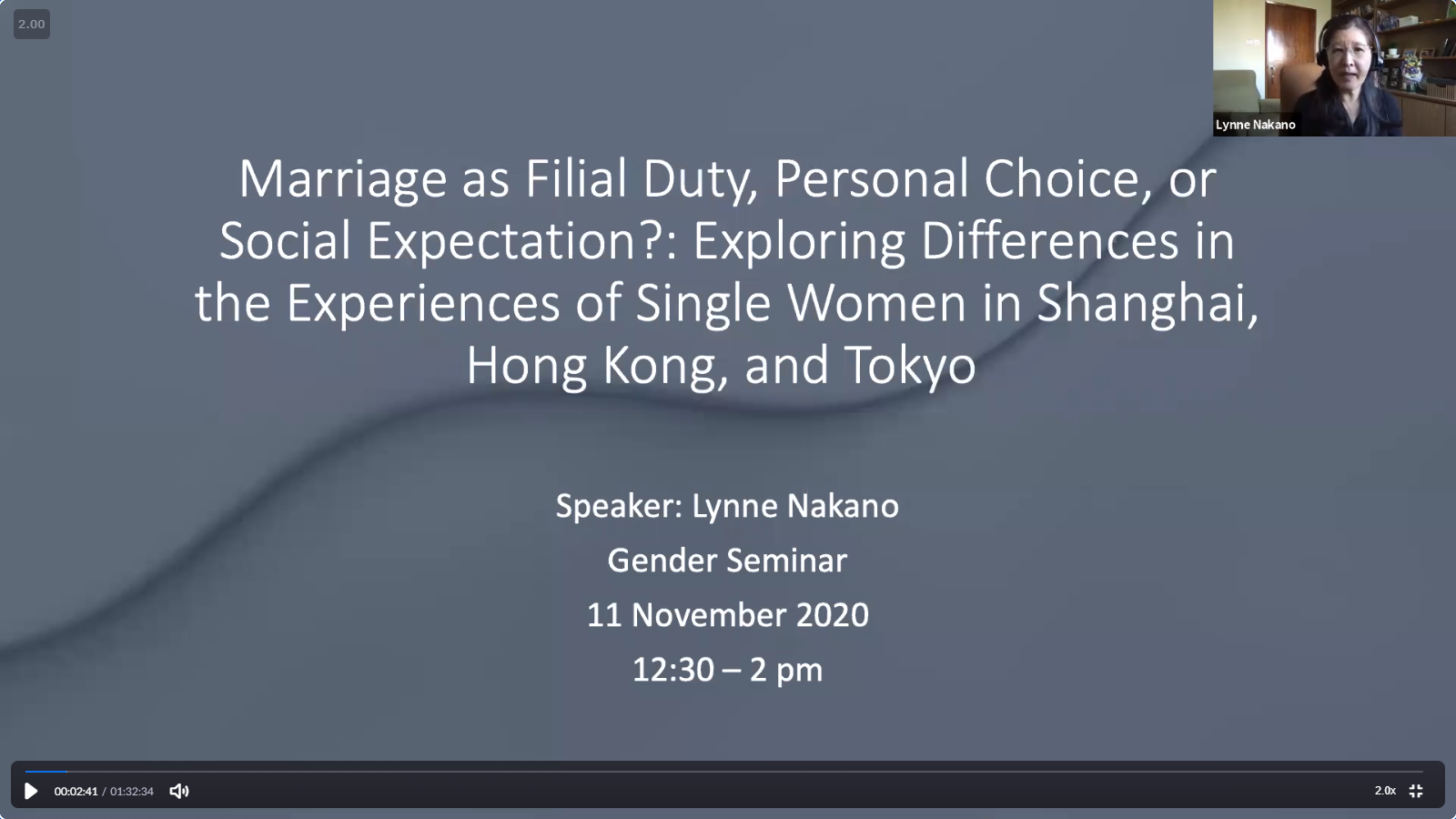 |
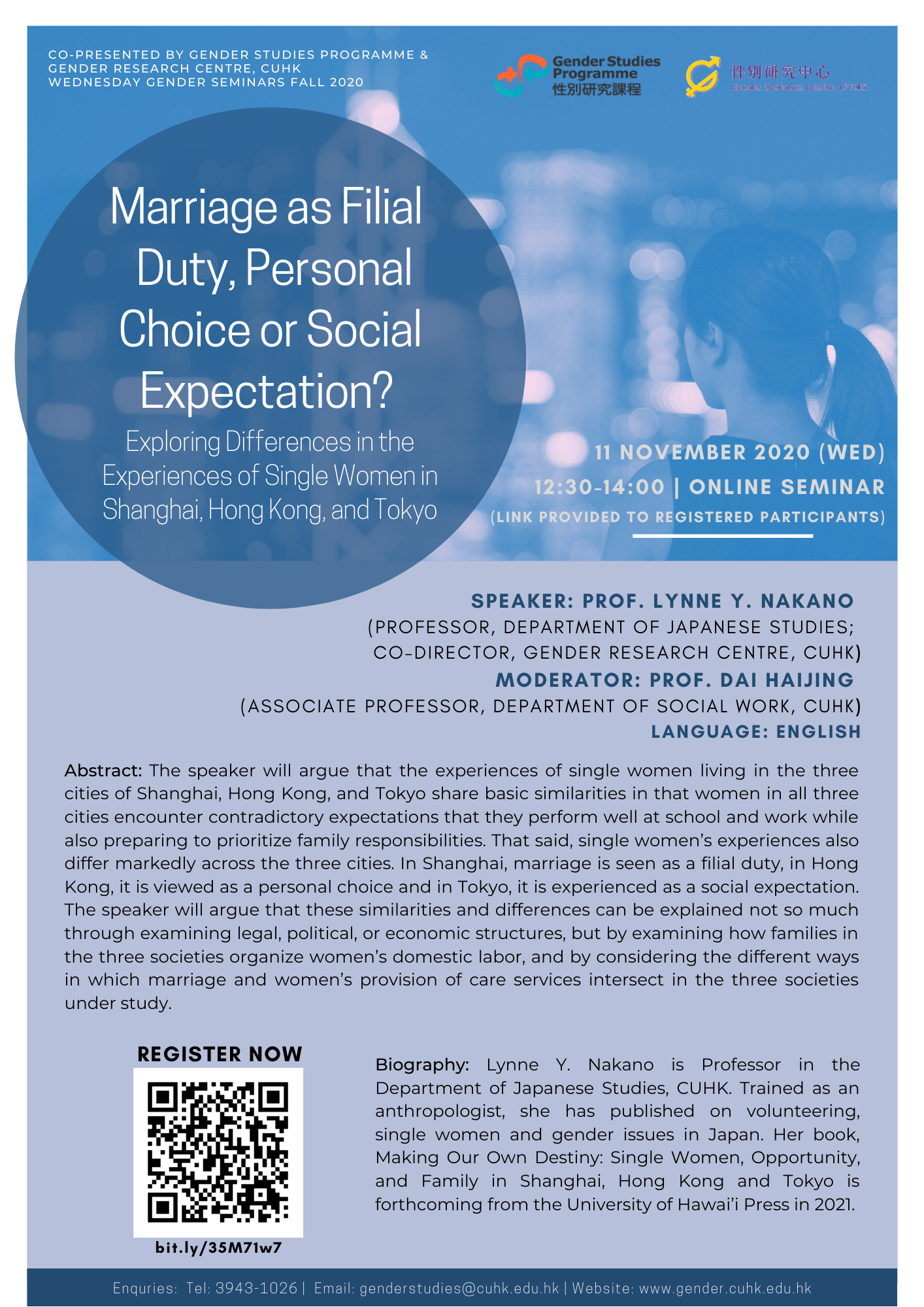 |
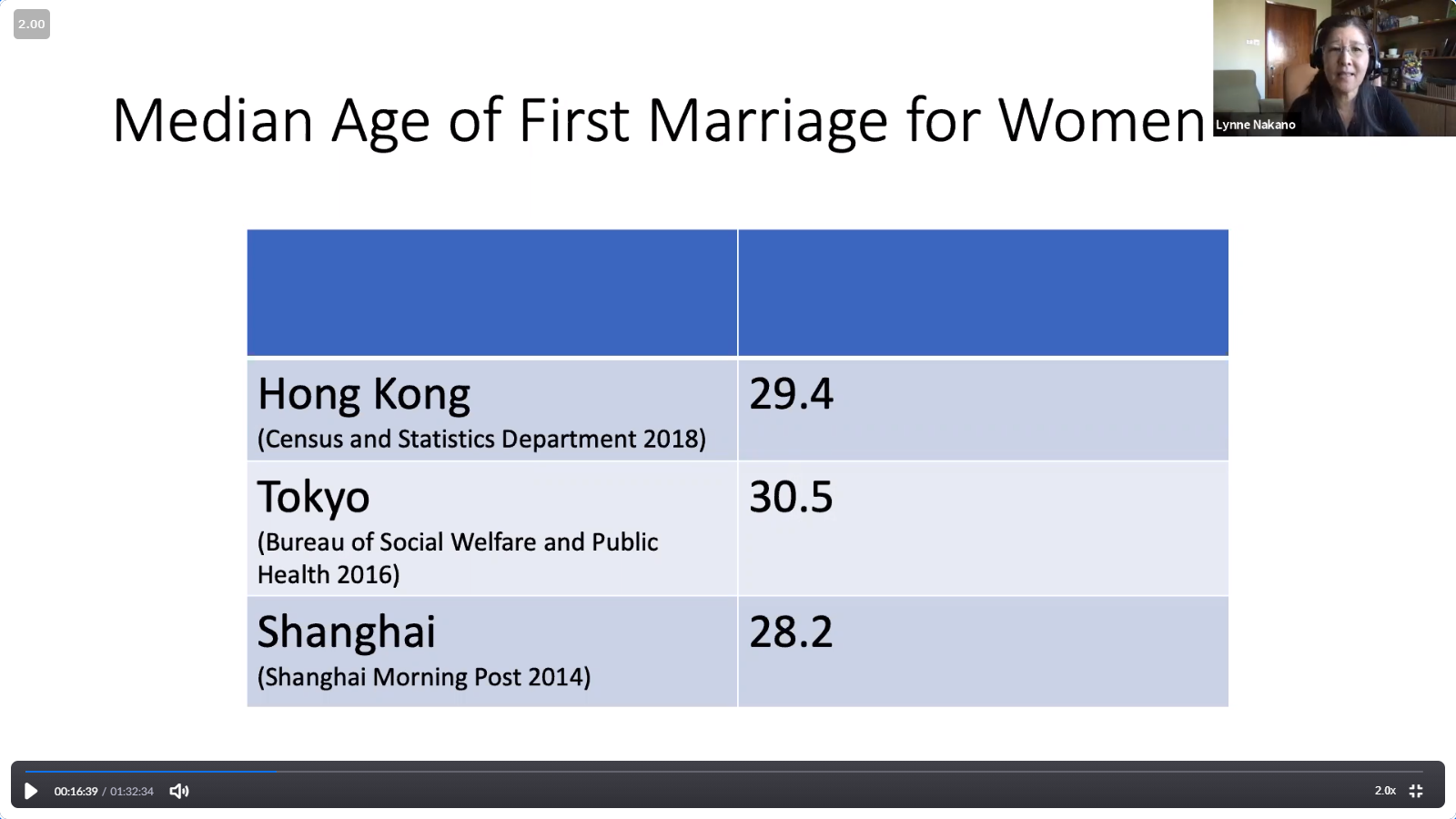 |
在11月11日的性別研討會上,來自香港中文大學日本研究學系的教授Lynne Y. Nakano分享了她對於上海、香港和東京三個城市中單身女性的研究。Nakano教授使用人類學的研究方法,採訪了三個城市中的單身女性,並分析整合了這些經歷的相似之處:一方面她們被期望在學校和社會工作中表現良好,另一方面,又被期望以家庭為重。但三個城市的單身女性在不同社會背景下,面臨的情況又各不相同。
Nakano教授首先介紹了東亞城市中單身的基本特點,以及女性結婚年齡普遍上升的原因。在上海、香港和東京這三個城市中,未婚者同居率低,戀愛率低,擁有性經驗的人數比例低,婚外生育率低,且通常同性關係被高度污名化。與此同時,隨著市場就業機會擴大,女性傾向於發展事業,婚姻往往使得女性在職場面臨歧視和壓力,因此生育率也隨之下降。
Nakano教授隨後展示了兩種婚姻的社會模型,責任模型(Duty Model)以及同伴模型(Companionate Model)。她研究發現,中國社會偏向於責任模型,香港社會為同伴模型,而日本為二者的混合模式。因此在上海,適齡結婚是一種普遍現象,女性認為婚姻代表孝道,是代際照料關係的切入點;香港在同伴模型下,認為婚姻代表著個人的選擇,家庭環境也允許她們保持單身;東京女性通常會選擇在社會期望的年齡段中完成婚姻,她們認為婚姻代表著一種社會責任。
在婚姻之外,女性還必須承擔家庭照顧者的角色。單身女性往往不會因國家言論或政策改變婚姻選擇,但她們會通過參與家庭事務的方式來彌補這一缺憾,履行更多的家庭照顧責任。上海女性會積極強調自己對家庭和國家做出的貢獻,使單身更具合理性;在香港社會單身並不會引起道德譴責,但女性在具有收入的情況下必須看顧家庭;東京女性以經濟獨立為榮,她們認為養育年邁的父母是自己應盡的道德義務,但生育卻不是必須的。
Nakano教授還指出了一些現存的問題,單身女性的家庭成員往往認為單身是暫時的,所以並未為她們做長久的準備。此外,東亞女性保持單身並非個人主義的表達,而是為了增強整個家庭的經濟,完成家人的社會期望,她們承擔了大部分家務勞動卻並未得到應有的經濟支持,加劇了財富分配不均。最後,社會對大齡單身女性仍保持著負面的刻板印象,她們不得不通過強化個人的貢獻,發明新的方式來實現女性的家庭責任。
-由性別研究課程博士生李露露及文學碩士生成思穎撰寫
28 Oct 2020 (Wed) 構想城市:與家政工、尋求庇護者和少數族裔進行的基於藝術的研究
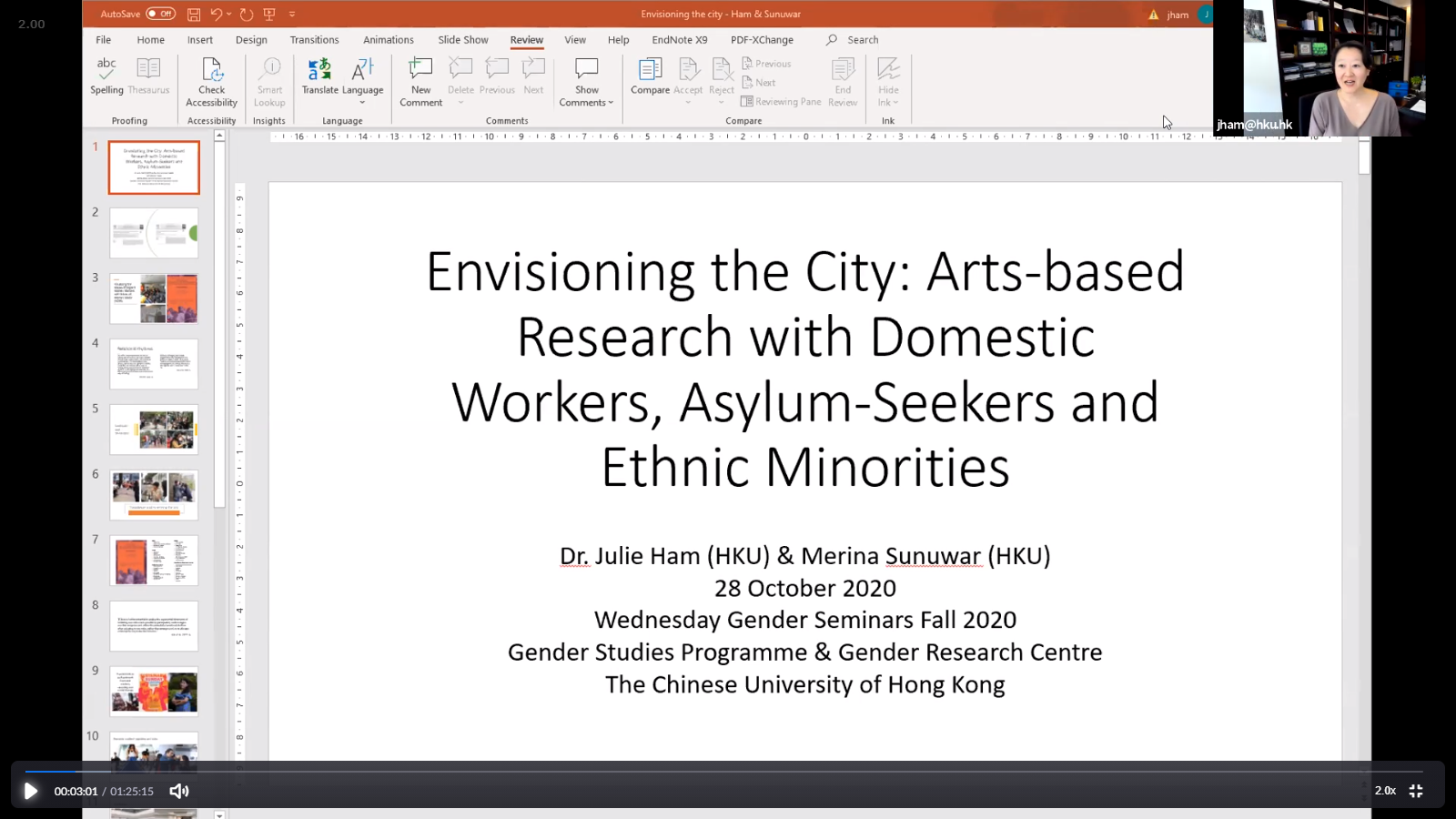 |
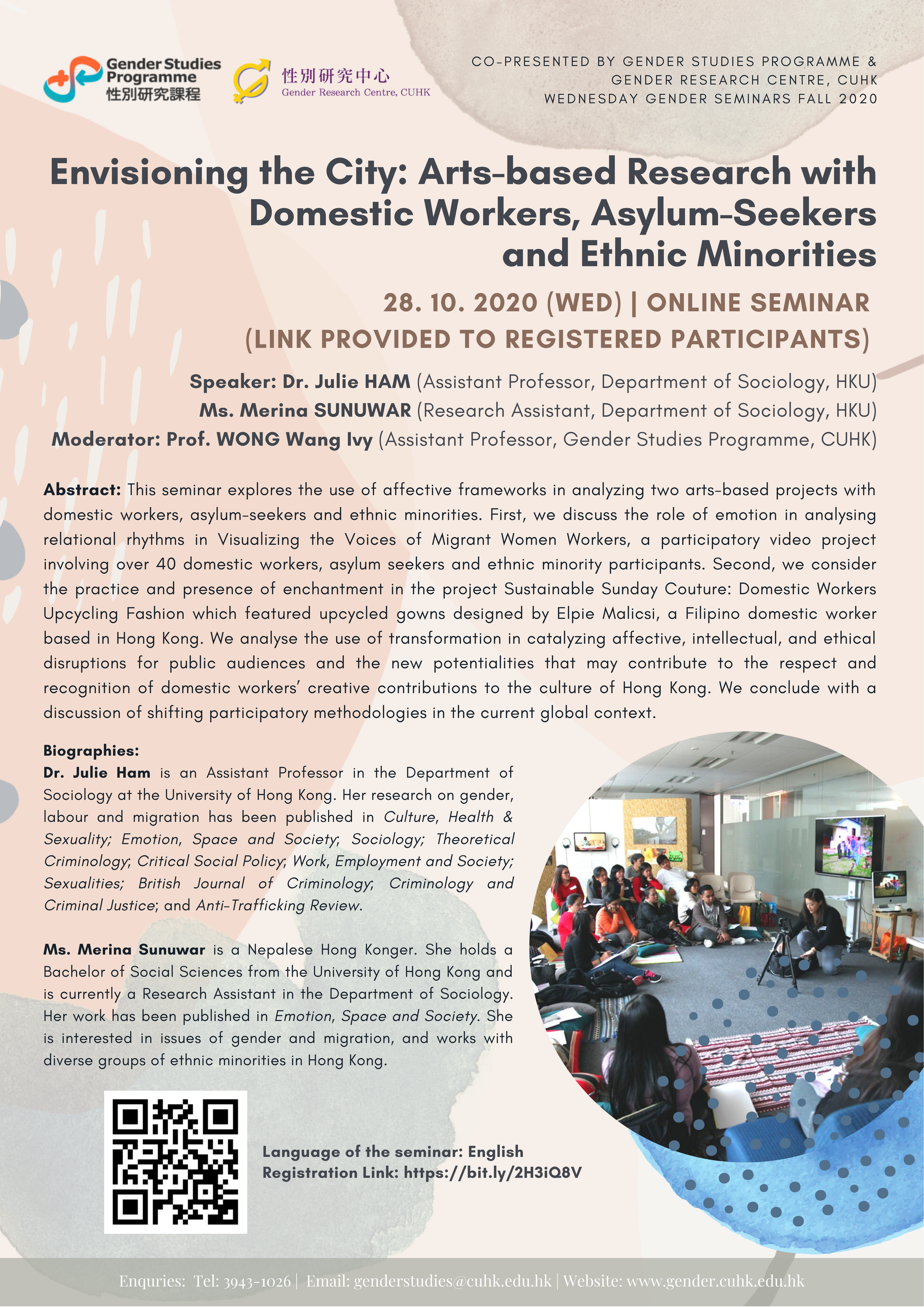 |
 |
在10月28日的周三性別座談會上,香港大學社會學系助理教授Prof. Julie HAM和香港大學社會學系研究助理Ms. Merina SUNUWAR通過Zoom在線講座,分享了“構想城市:與家政工、尋求庇護者和少數族裔進行的基於藝術的研究”。
通過製作並分析參與性視頻,兩位講者圍繞兩個與家政工、尋求庇護者和少數族裔進行的藝術項目:“把女性移工的聲音視覺化”(Visualizing the Voices of Migrant Women Workers)和“可持續的星期日時裝:家政工升級再造潮流”(Sustainable Sunday Couture: Domestic Workers Upcycling Fashion)展開討論,並探究其中情感框架的作用。
參與性視頻是指由社區而不是專業製作人製作的視頻,打破了原有的參與者與研究者之間的權力關係,取而代之的是“人際關係的節奏”(relational rhythms)。 Prof. Julie HAM著重講述了“把女性移工的聲音視覺化”項目中三種關鍵情緒中的兩個:感激之情與驚惶不安,將其分別與“參與者同組織者之間的化學反應”和“重新書寫城市”相聯結。 Ms. Merina SUNUWAR通過向我們詳細介紹家政工、少數族裔的參與式實驗,分析其中角色與場景的作用與變化,證實參與式試驗方法可進一步分析城市居民的新角色維度(experiential dimensions),其目的不在於減少或緩解有益的緊張關係,而是幫助城市居民在適應新角色時認識到並利用此種情感關係(emotional rhythms)。 Prof. Julie HAM最後指出,在參與性視頻中權力關係的轉變能夠促使新的聲音和故事出現在人們眼前,而這些可能繼續轉變成知識被生產出來。
由王亦鳴、鐘圩燕(性別研究課程碩士學生)撰寫
21 Oct 2020 (Wed) 婚前墮胎:後社會主義中國的生育政治
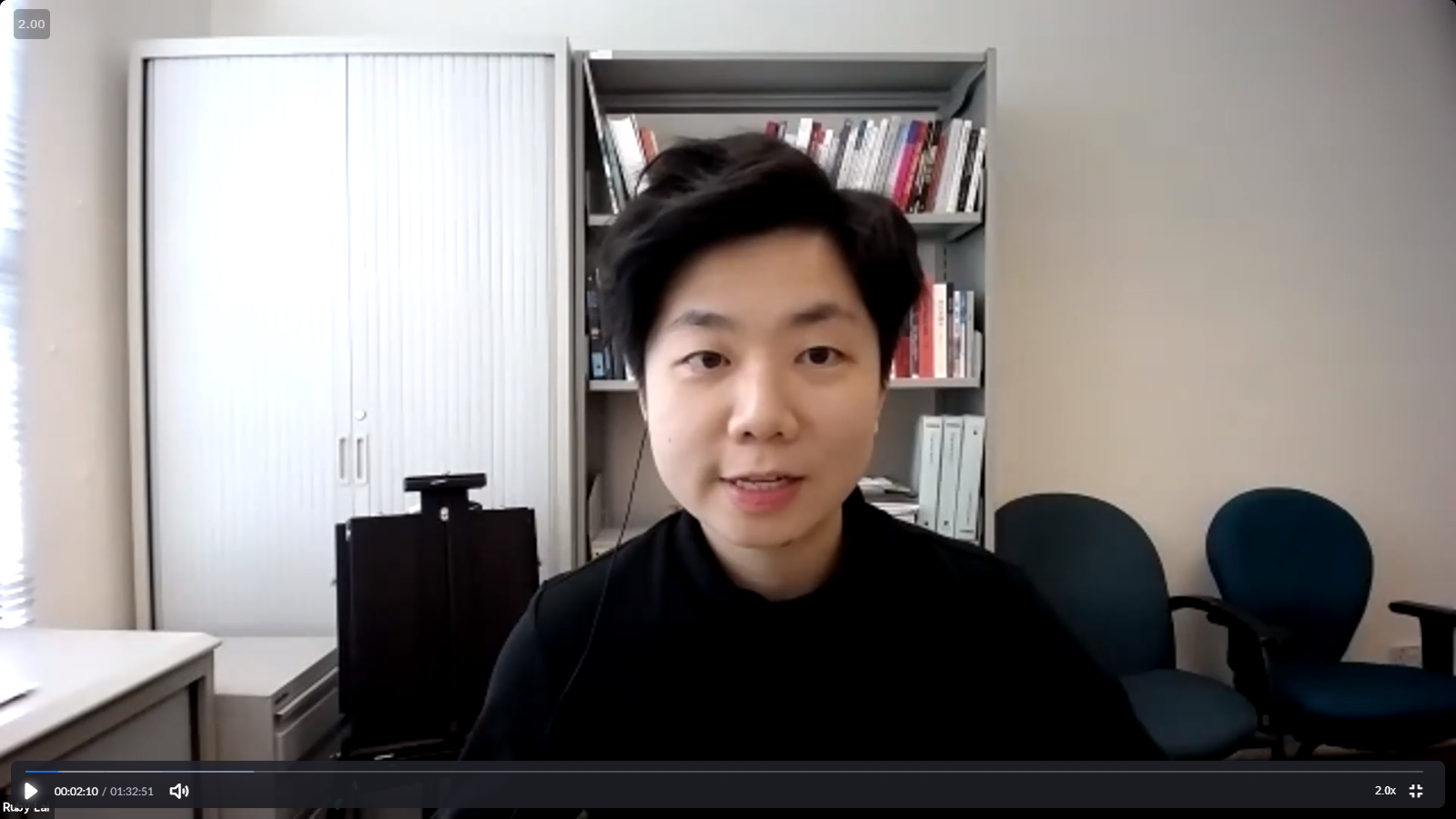 |
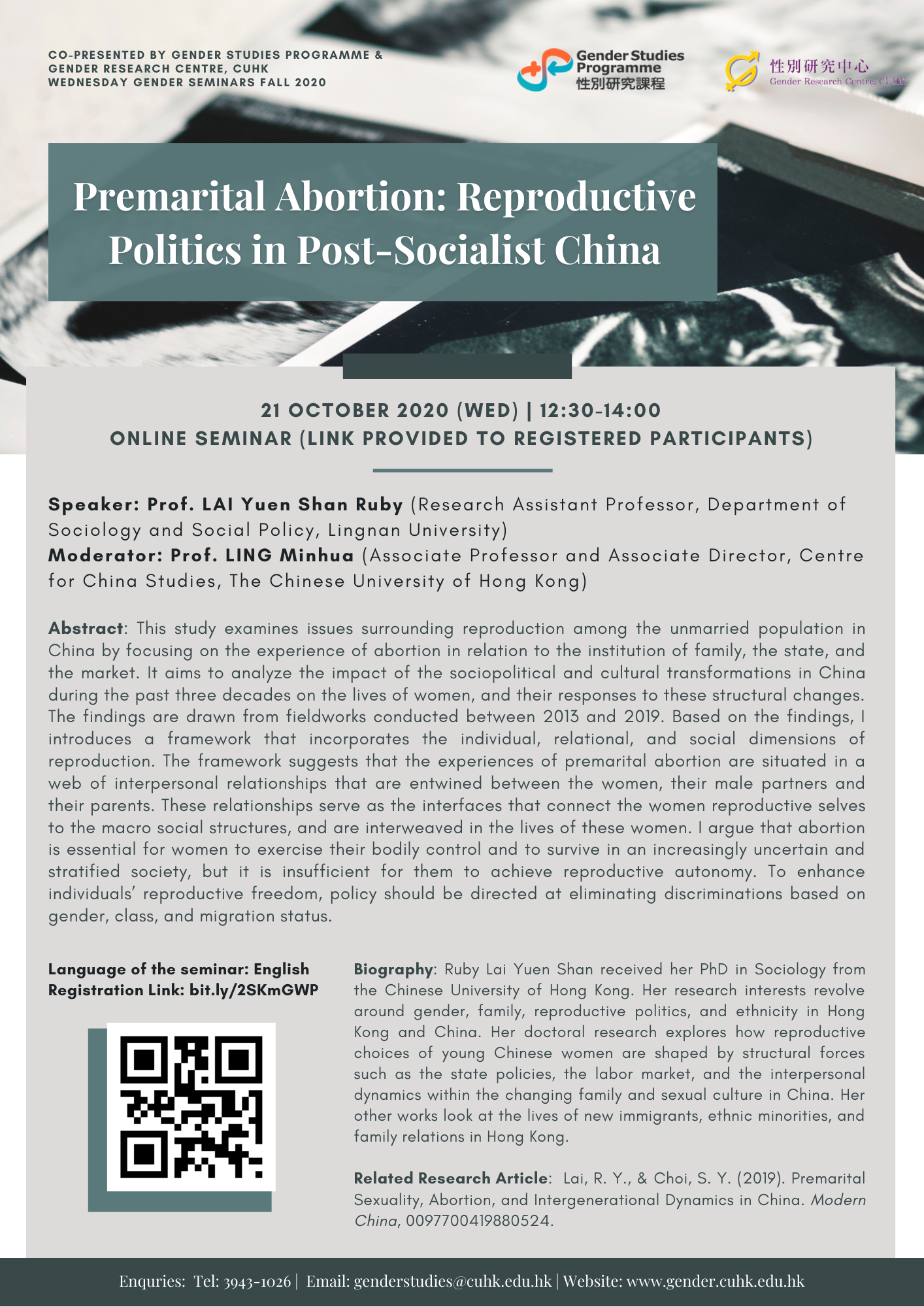 |
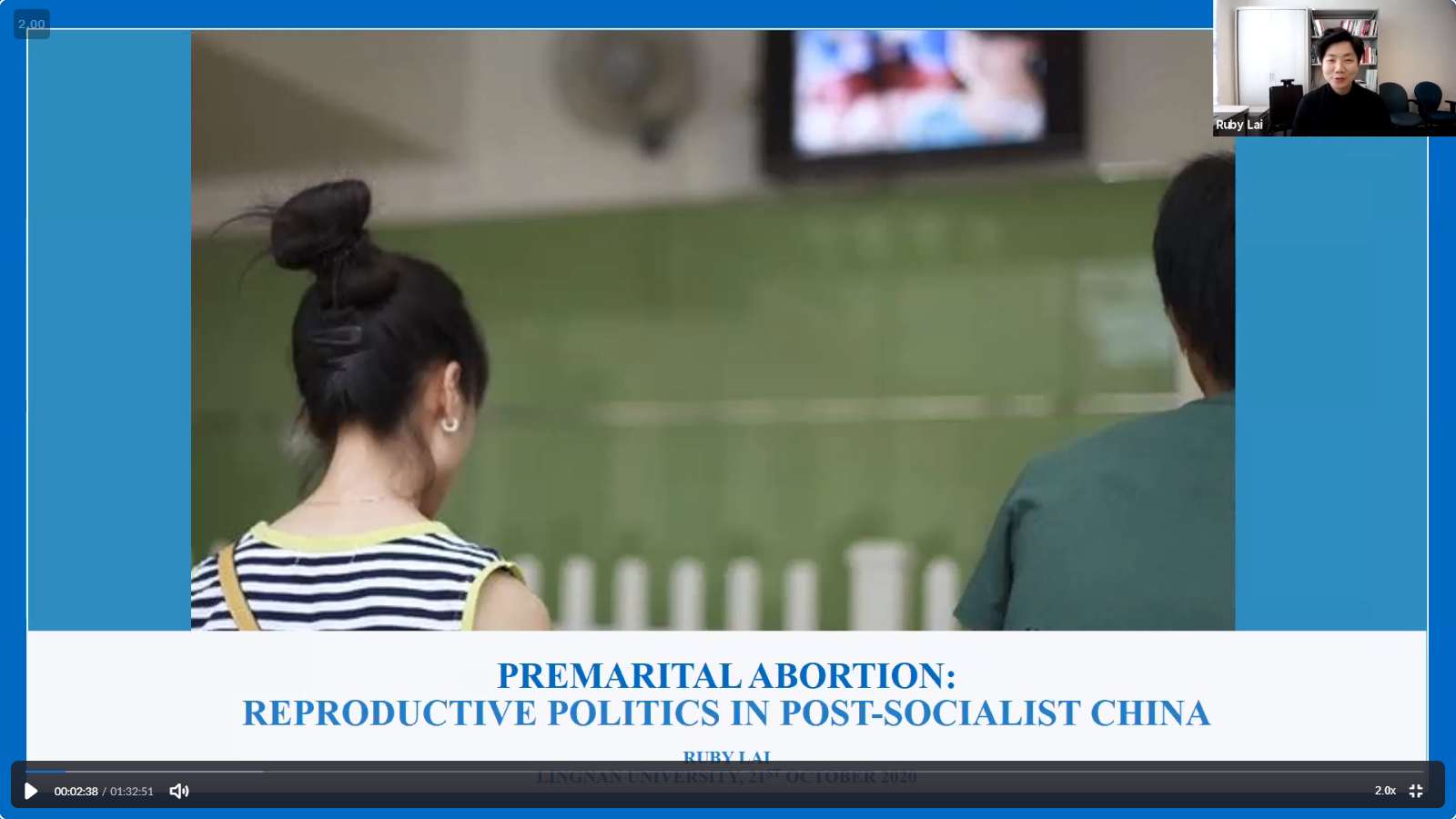 |
在10月21日的性別研討會上,來自嶺南大學社會學與社會政策學院的研究助理教授——黎苑姍博士分享了她從2013年至2019年進行的關於中國成人婚前墮胎問題的研究。黎苑姍博士主要聚焦於沿海工業城市中來自欠發達地區的人群,使用民族誌和深度訪談的方法揭示中國女性的非婚生殖經歷,並使用內容分析法考察中國的墮胎文化話語。
黎苑姍博士認為,研究成人婚前墮胎問題為研究後社會主義的中國社會中未婚女性及其親密關系伴侶、父母之間的關系提供了一扇窗。這些關系進而反映了女性作為生殖主體的自我如何與宏觀社會結構發生關聯,並交互作用於女性的日常生活中。
在“完整人生”規劃普遍存在的情況下,導致女性墮胎的個人因素包括女孩-婦女二元敘事之間的掙紮、對倉促婚姻的抗拒、對成為單身母親的恐懼、對安穩愛巢的向往、對優質嬰兒的期待。計劃生育時期“優生優育”的宣傳理念尚且深入人心,女性又背負著理想公民和賢妻良母的雙重社會期待,加之中產階級的生活圖景日益與有關和諧家庭的想象相捆綁,它們共同構成了女性墮胎決策時的現實考量。
黎苑姍博士的研究表明,許多女性會有意識地把婚前墮胎作為一次檢驗伴侶的機會,以視其對該段親密關系的態度,以及是否成熟可靠、有成為一個合格的丈夫與父親的能力。儘管男性伴侶的意見在妊娠中也至關重要,但女性自身的決策才是決定性的。一些男性伴侶在女方懷孕期間會主動承擔家務勞動,在做出墮胎決定的過程中也表現出脆弱的一面,體現了親密關系互動中性別角色的流動,傳統性別的界限並非不可僭越。
代際關系互動亦在墮胎的決策過程中呈現出復雜的態勢。黎苑姍博士界定出四種父母-女兒的互動模式:父母意見缺位的互動模式,參考父母意見的互動模式,咨詢父母意見的互動模式,以及聽任父母幹預的互動模式。研究同時表明,有部分女性認為,與父母的關系比與伴侶的關系更加牢靠,因此在決策中會優先考慮父母而不是伴侶的意見。
黎苑姍博士指出,在中國婚前性行為普遍化、城市約會文化成熟化的背景下,女性在性和親密關系的問題中已取得相當的決策權。然而,與其說這種墮胎自由是國家對女性權利的保護,不如說它是國家現代化過程中的一個意外收獲。墮胎是女性行使身體自主權的重要體現,但與此同時,墮胎也是目前女性在職場和社會中血拼出一席之地的重要手段。隨著中國社會分層和社會不確定性增多,女性生育自主的實現仍然道阻且長。
本次線上研討會隸屬於周三性別研討會系列,由香港中文大學性別研究項目與性別研究中心共同舉辦。
( 由王騰,及性别研究课程文学硕士学生易雪曼撰写)
14 Oct 2020 (Wed) 中國在全球崛起背景下的跨國婚姻
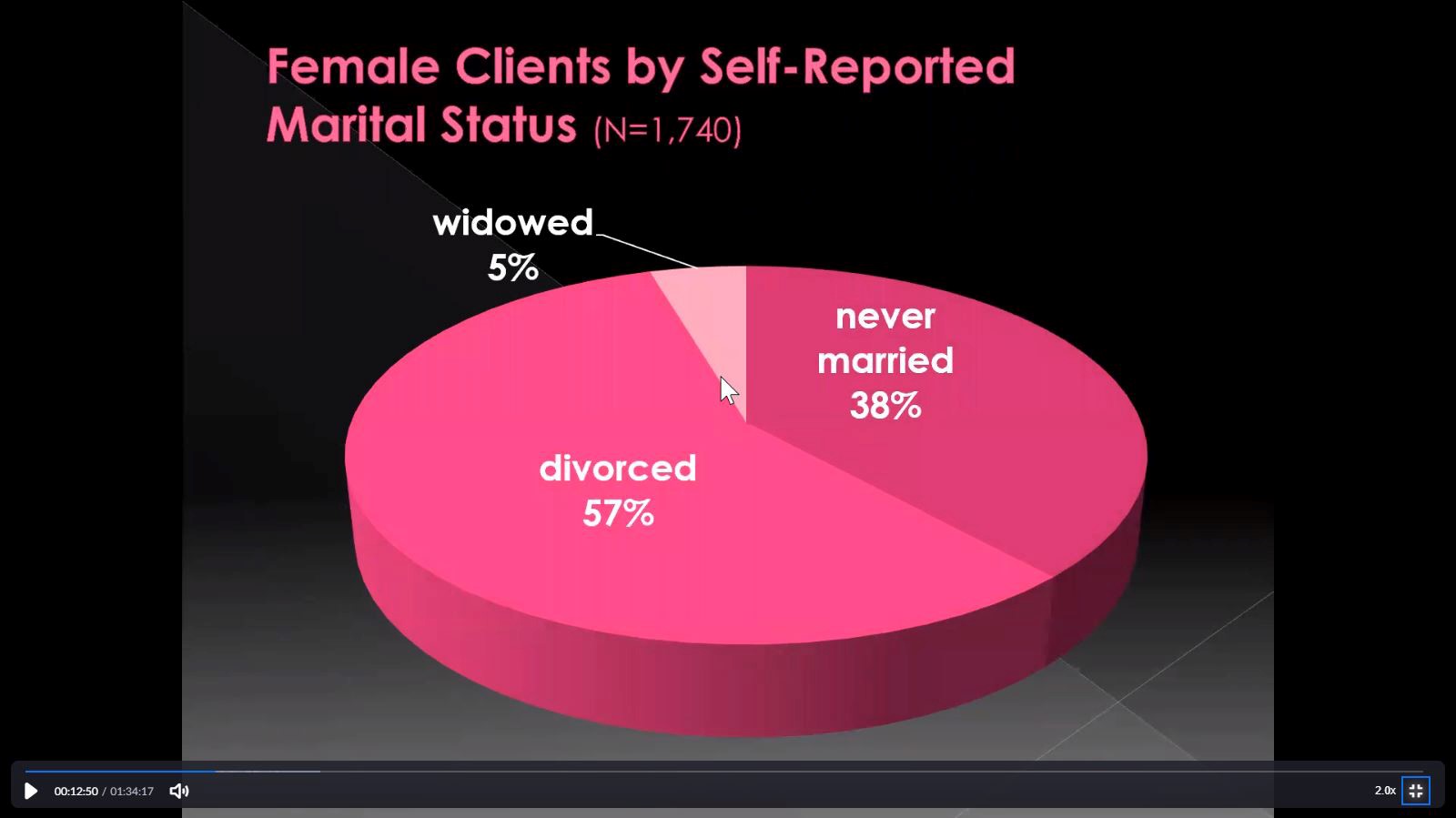 |
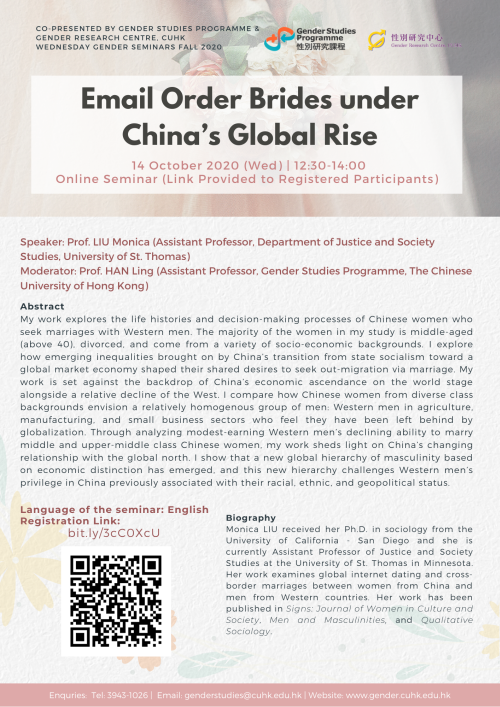 |
 |
在10月14日的周三性別座談會上,聖湯瑪斯大學正義與社會研究學系助理教授Prof. LIU Monica 透過Zoom在線講座,講解了她自2008年起開展的關於「中國全球崛起下的跨國婚姻」的研究。運用深入訪談和參與式觀察的研究方法,Prof. LIU 調研了61名使用網上跨國婚介服務的女性顧客。通過比較其中三個個案的人生軌跡和決策過程,Prof. LIU向我們剖析了在中國經濟崛起的背景下,不同社會經濟地位的中國女性對西方男性有著怎樣不同的想像,以及西方中等收入男性的優越地位如何被動搖。
Prof. LIU 指出,這些女性顧客大多曾經離婚,雖然同樣嚮往跨國移民婚姻,但背後的動機和最終的選擇與結局卻各自不同。她們當中有的自身經濟條件比較好,但因對中國男性缺乏信心而轉向外國婚姻市場以尋求 「真愛」,卻發現這些西方男性無法滿足她們對外貌或男性魅力的期望。有的則因背負經濟重擔,而希望通過移民婚姻改善生活質素, 但最終婚姻不幸福或者只能通過犧牲自主權來換取婚姻的成功。然而,「郵購新娘」的西方男性相對而言都有著同質性的背景。他們從事農業,製造業,或經營小生意,跟不上全球化的進程,往往在當地的婚姻市場上沒有競爭力,希望通過網上婚介尋找符合他們傳統性別觀念的女性對象,但漸漸失去對中上階層中國女性的吸引力。 Prof. LIU 認為,在全球資本佈局轉移和中國及其他亞洲國家崛起的背景下,西方男性的霸權和優越地位受到挑戰,運用交叉性的研究方法對進一步分析移民婚姻十分重要。
( 由性別研究課程博士生施韻,文學碩士學生李敏婷撰寫)
23 Sept 2020 (Wed) 發光還是消亡?:新自由主義日本下的女性經濟學與女性的經濟價值
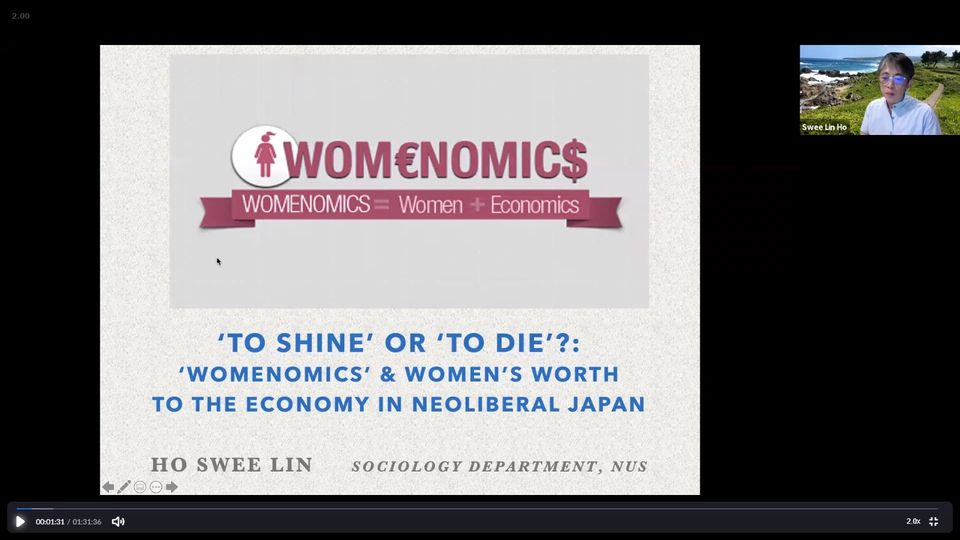 |
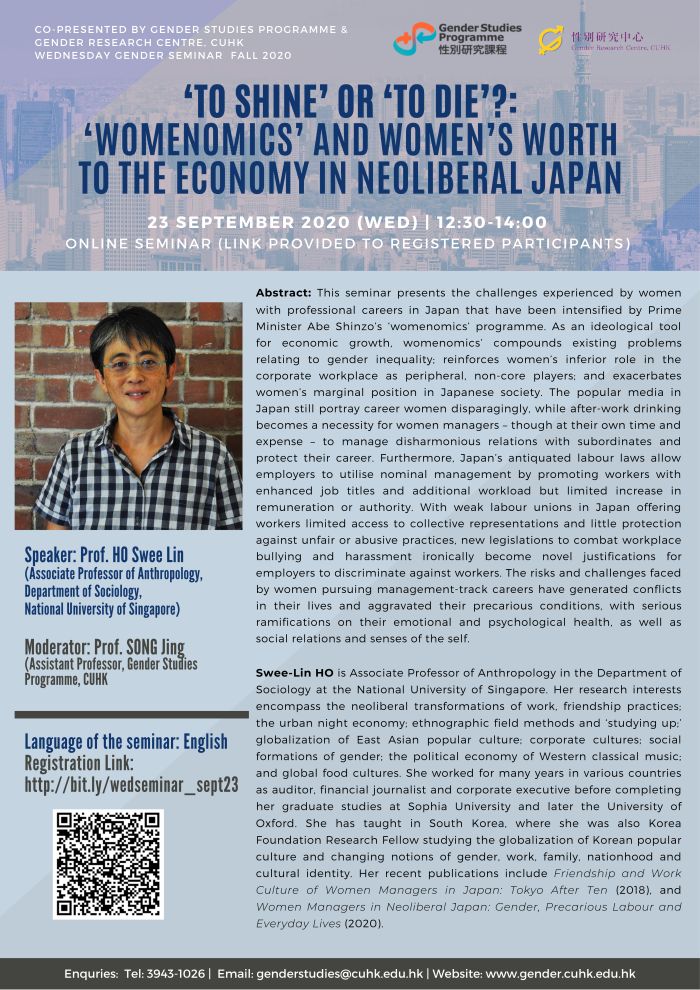 |
 |
在9月23日的周三性別座談會上,新加坡國立大學社會學系人類學何水霖副教授通過ZOOM在線講座分享了名為《發光還是消亡?:新自由主義日本下的女性經濟學與女性的經濟價值》的研究。通過訪談和參與式觀察,何教授對日本180多名從事管理崗位的工作女性進行了調研,探討安倍晉三首相提出的“女性經濟學”策略是否加劇了女性在日本職場中的弱勢地位以及如何造成這些影響。
何教授指出,日本職業女性的諸多困境並未隨著經濟改革得到改善。大眾媒體上呈現的日本職業女性形象依然十分刻板。公司中的女經理人需要花費大量的時間和金錢與下屬們“下班飲酒”來保住職位。然而在苛刻的晉升條件下,升遷只為她們帶來了更多的工作量和有限的權威。 在公司,女性在機構重組時最容易被犧牲,並且更可能從事兼職工作。在國家層面,針對職場霸凌和騷擾的法令實際成為了雇主歧視女性雇員的合法工具。簡而言之,“女性經濟學”指導下的新自由主義經濟政策變革和隨之而來的立法完善未能真正為日本女性帶來福祉,而是加重了她們受到的職場隱性歧視,一定程度上固化了她們在父權社會中的性別角色。
(由性別研究課程博士生周思媛,文學碩士學生耿思然、劉戀弦撰寫)
2020年春季
香港中文大學性別研究課程、性別研究中心合辦
4 Mar 2019 (Wed) 耽美真人CP與自我規訓式審查
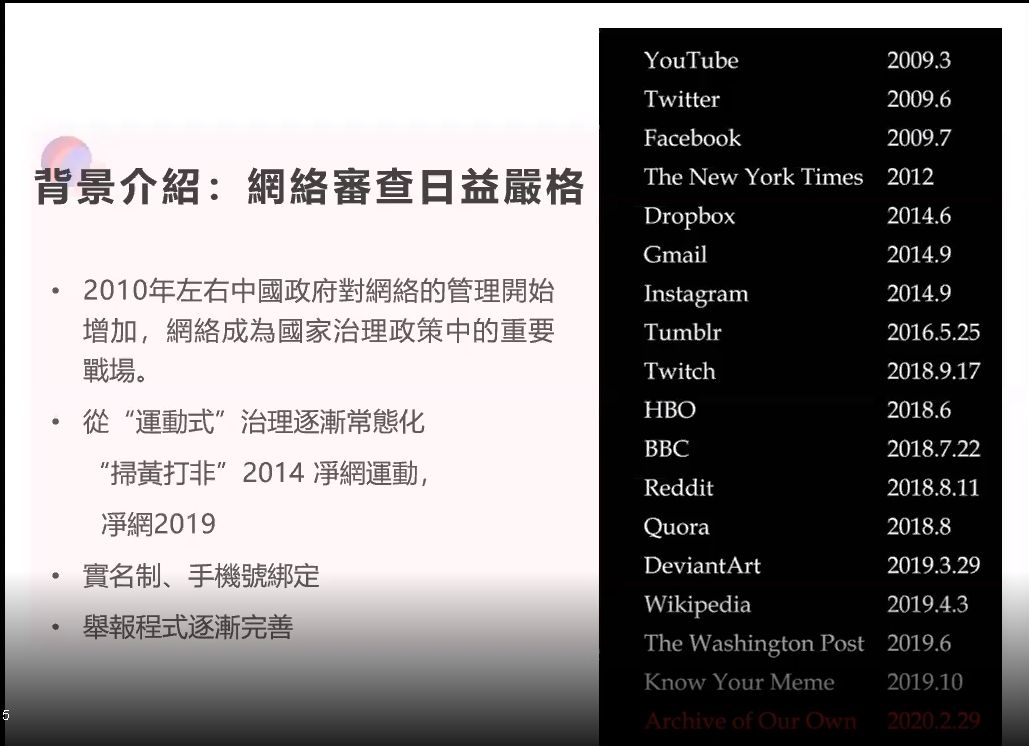 |
 |
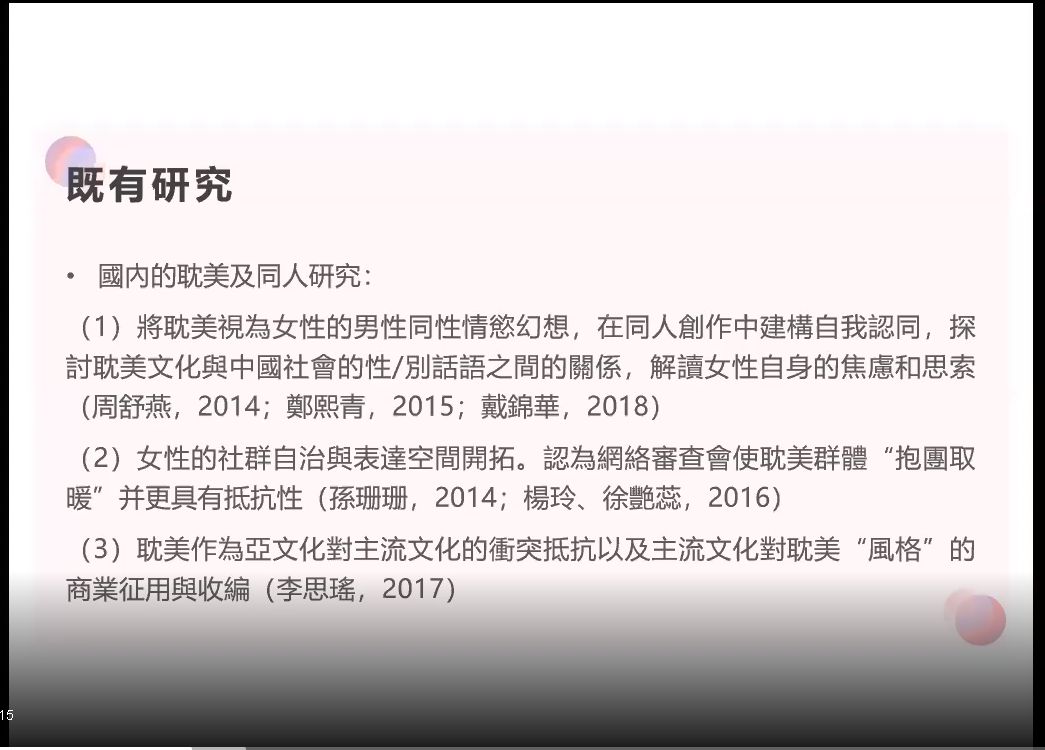 |
香港中文大學性別研究課程於本周三舉辦線上性別研討會,本課程哲學碩士研究生王亦鳴向觀眾分享了關於耽美真人CP與自我規訓式審查的研究。王同學通過研究新浪微博平台上被網絡審查壓抑並重新塑造的耽美群體,探討圍繞網絡亞文化之間的互動,網絡審查對其影響,以及新的創造性之所在。這一研究填補並梳理了對立的網絡群體之間的復雜關系與表征的空白,並反思了網絡審查對於耽美亞文化生態的影響,並試圖尋找出路。228名觀眾註冊並參與了研討會,是本課程周三性別研討會參與人數最多的一次。
26 Feb 2019 (Wed) Desire for Sale: Live-streaming and DIY Pornography among Chinese Gay Micro-celebrities
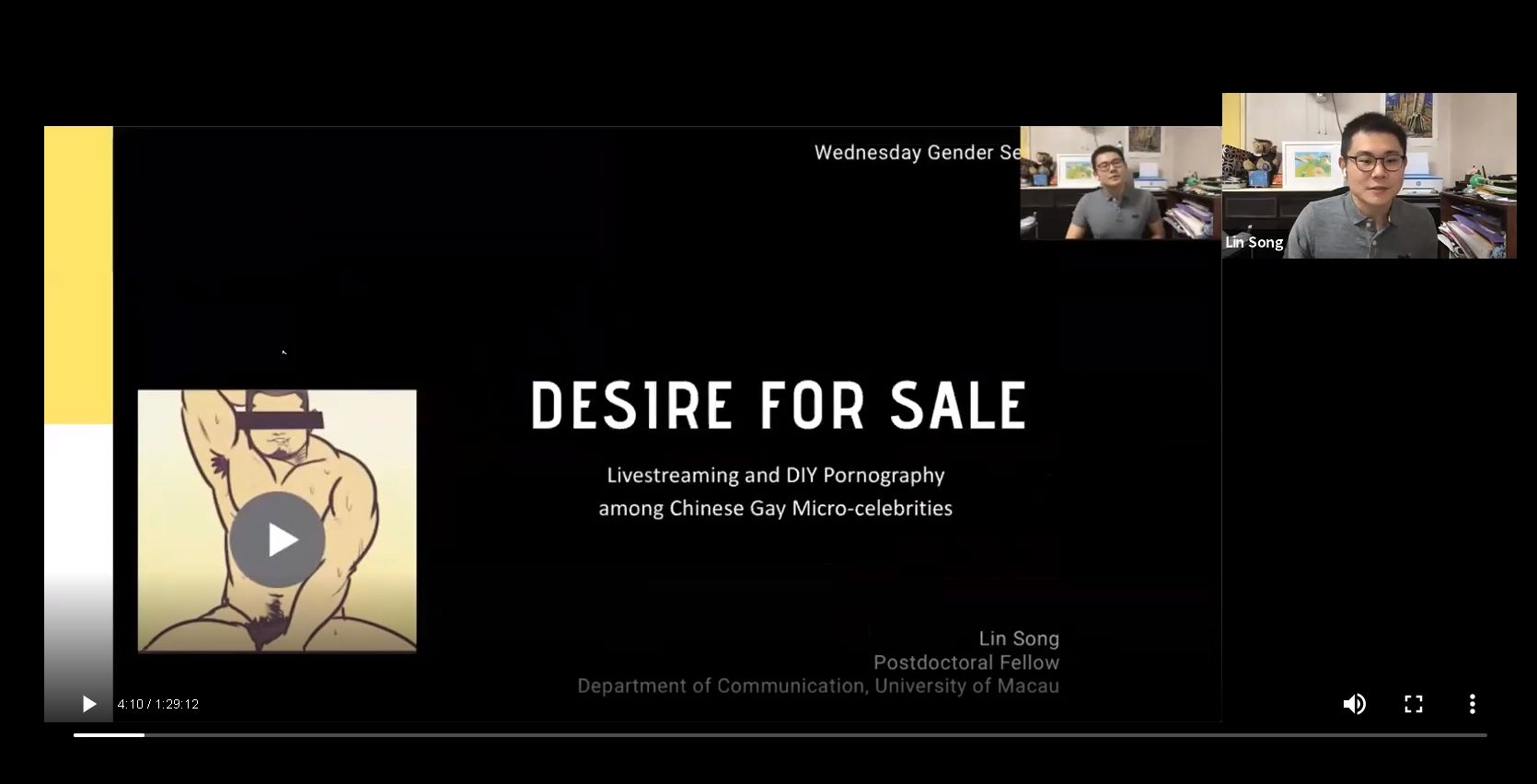 |
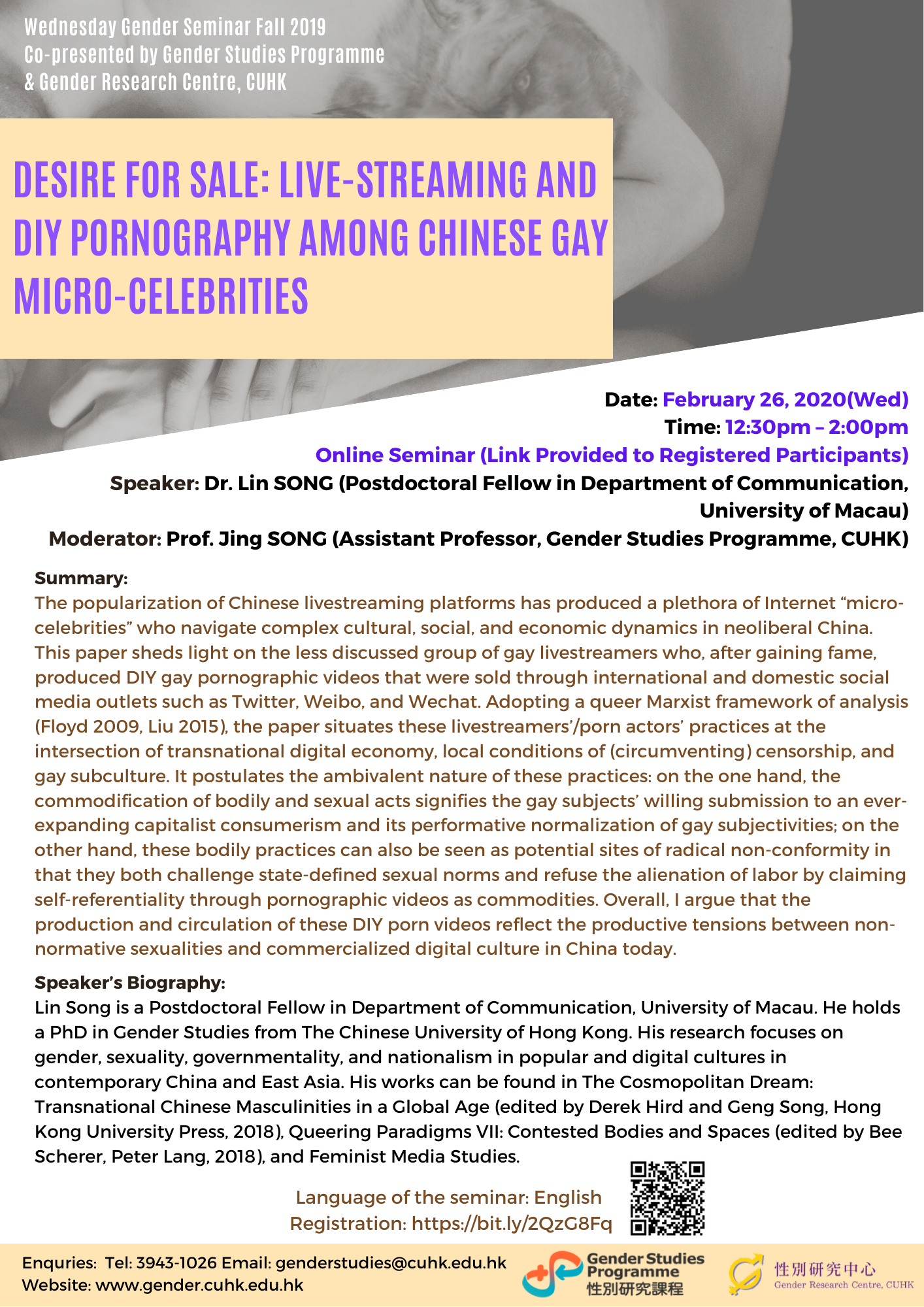 |
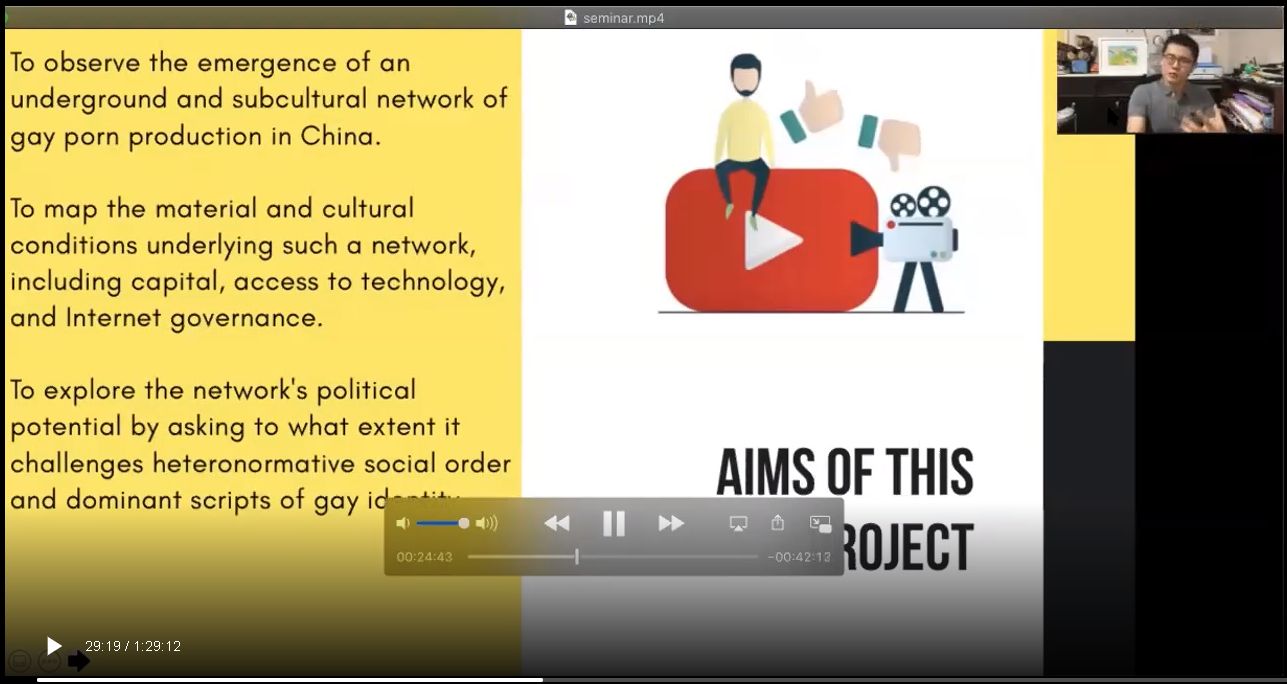 |
在2月26日的週三性別座談會上,來自澳門大學傳播系的博士後研究員——宋林博士通過ZOOM的在線講座,分享了他關於中國同志網紅直播及DIY色情影片的研究。藉由文化研究和媒體研究的路徑,宋林博士探討了中國地下同志色情“產業”的發展歷程、所處的特定社會政治環境、以及同志色情“產業”與中國網絡審查之間的複雜博弈。
據宋林博士介紹,中國的同志DIY色情影片產業發展很大程度上得益於社交媒體的發展,尤其是直播平台的流行。同時,互聯網傳播所特有的模糊性也幫助人們發展出各種各樣的迂迴策略,以躲避日漸嚴格的網絡審查。借用酷兒馬克思主義的分析框架,宋林博士將中國的同志DIY色情產業視作一種慾望經濟。儘管這是資本主義的產物,完全服從於市場邏輯,它卻在異性戀霸權、政府管制及公司資本主義的間隙之中野蠻生長,具備一定的顛覆現有秩序的潛力。
2019年秋季
香港中文大學性別研究課程、性別研究中心合辦
2 Oct 2019 (Wed) Refusing obliquely: On siren eun young jung and the three moments of performing in anomaly
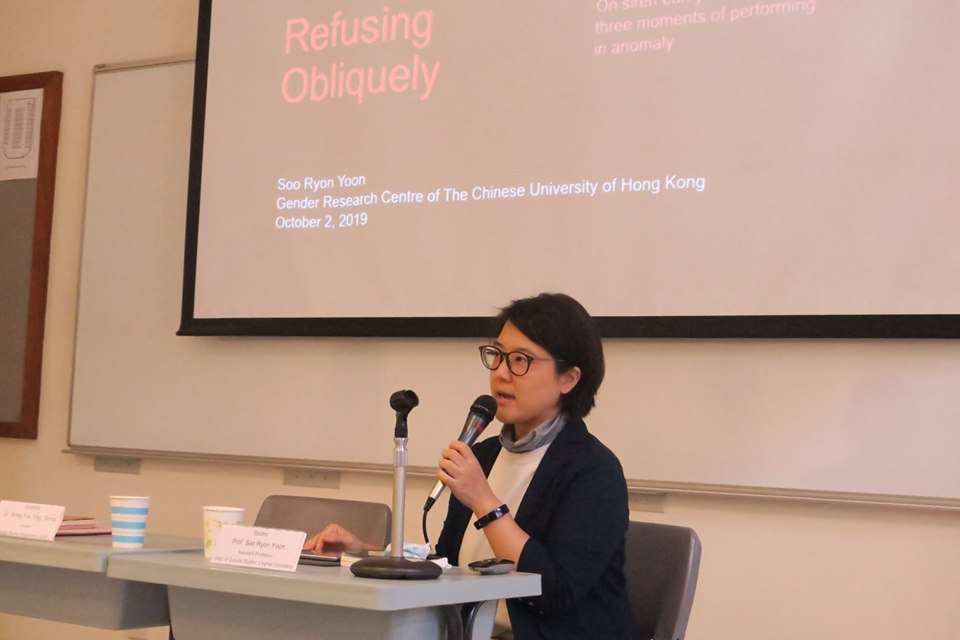 |
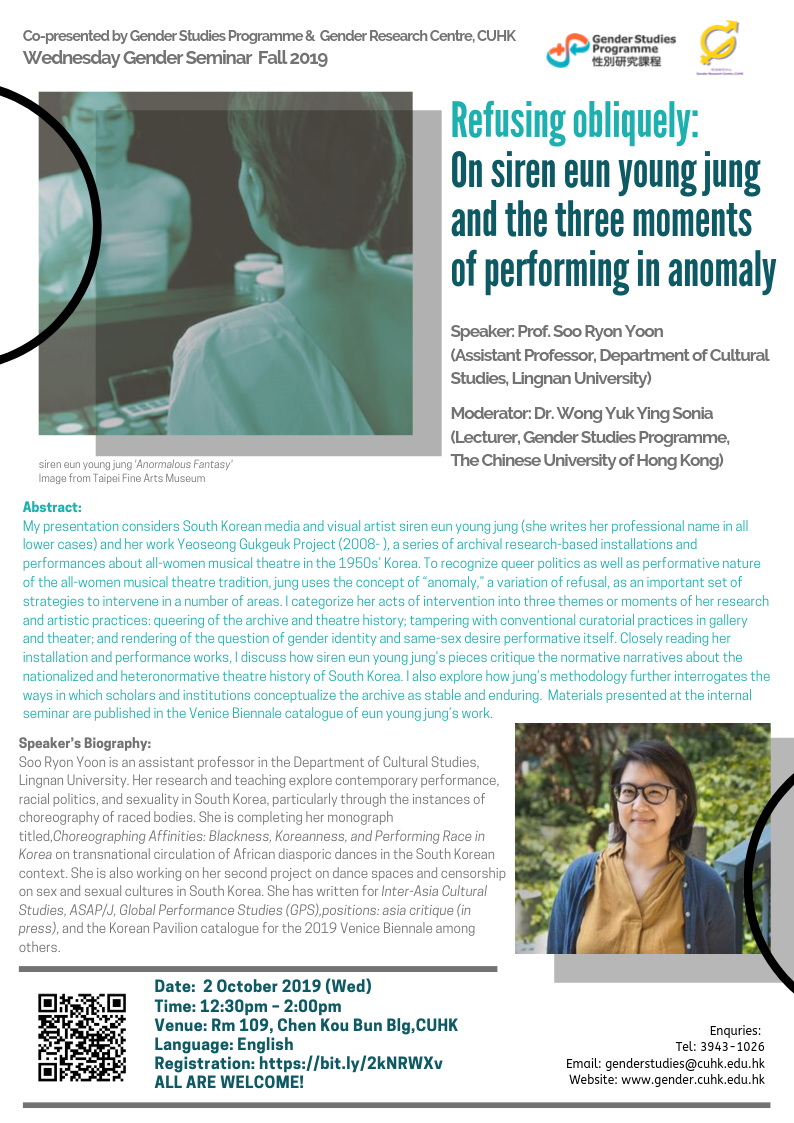 |
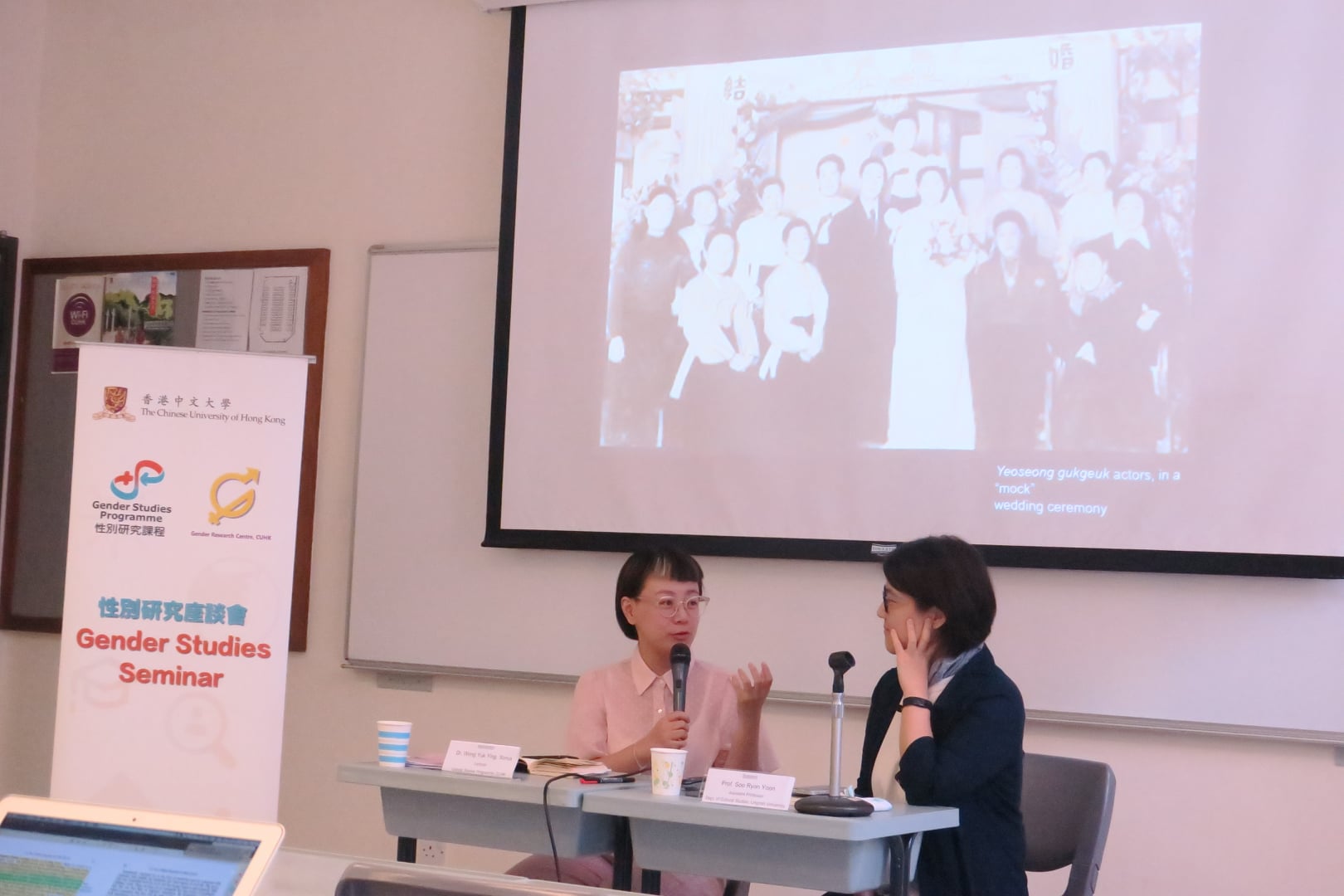 |
在10月2日的週三性別座談會上,來自嶺南大學文化研究系的尹水蓮教授(Prof. Soo Ryon Yoon)分享了其對南韓媒體與視覺藝術家鄭恩瑛siren及其「女性國劇」項目(2008-)的研究。「女性國劇」(Yeoseong Gukgeuk)的特點在於劇場中全部角色均由女性扮演,其在1950年代的南韓極盛一時,後來逐漸沒落。「女性國劇」的沒落與其全女班的特徵不無相關,因為異性戀正統的意識形態深深植根於韓國對於「真實的」國家文化遺產的想像之中,而「女性國劇」頗有顛覆意味的跨性別扮演則與這種國家主義下的主流話語相違背。
多年來,藝術家鄭恩瑛siren對「女性國劇」進行了一系列的研究、記錄、策展和創作。通過對這些作品的細讀,尹教授分析了「女性國劇」項目的酷兒策略:並非直接否認南韓現存的正統劇場體制,而是與其斡旋、從而在內部進行攪亂與反轉。尹教授從劇場歷史存檔、劇場傳統、及劇場的性別政治三個主題論述了鄭恩瑛的介入方式,討論其如何通過該項目質問了韓國劇場歷史的民族主義與異性戀正統邏輯,並為在劇場中復興酷兒的聲音打開了新的可能性。
11 Sep 2019 (Wed) The performative effects of diagnosis: thinking gender, sexuality, and intimacy through diagnostic logics and politics
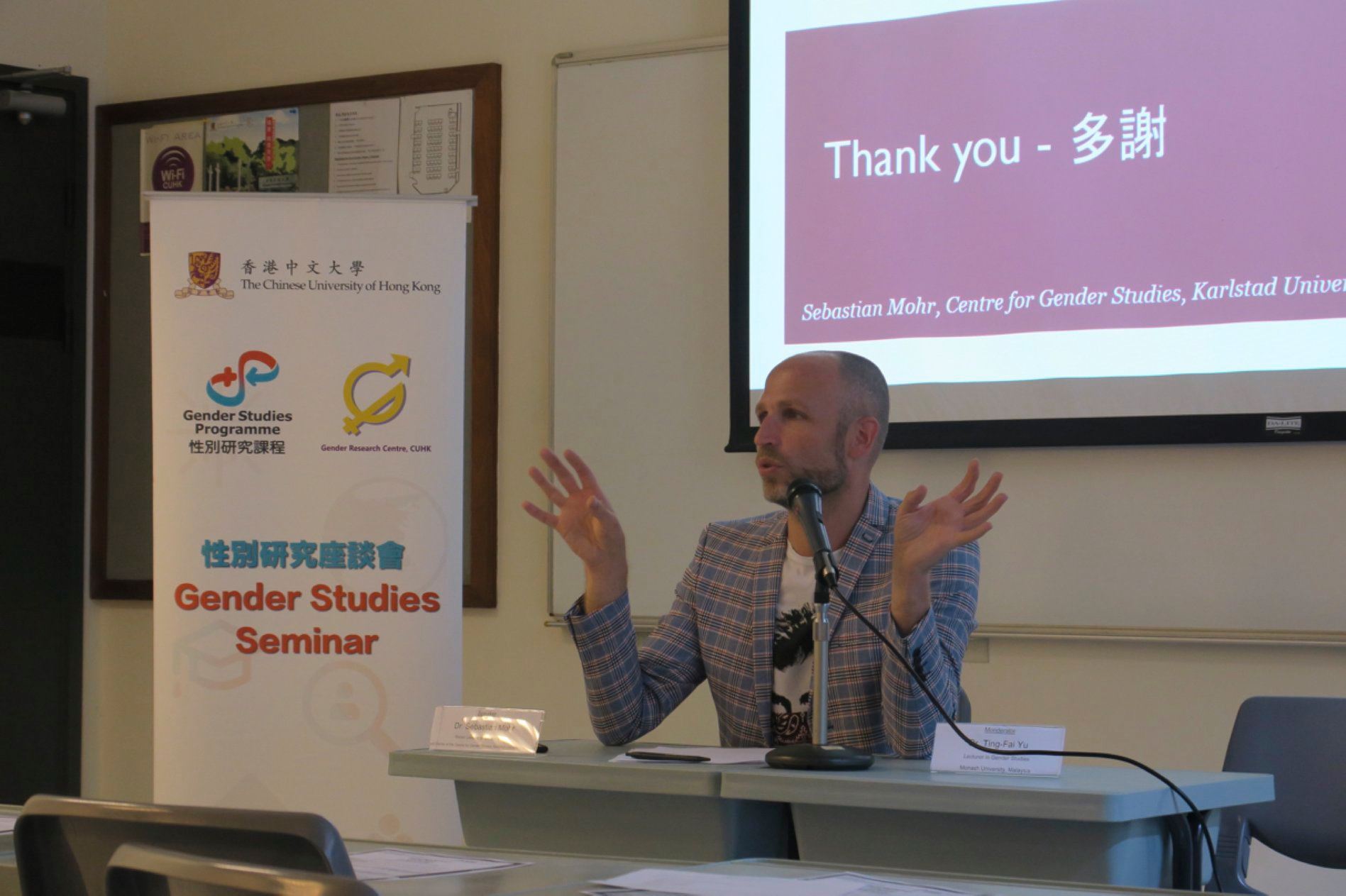 |
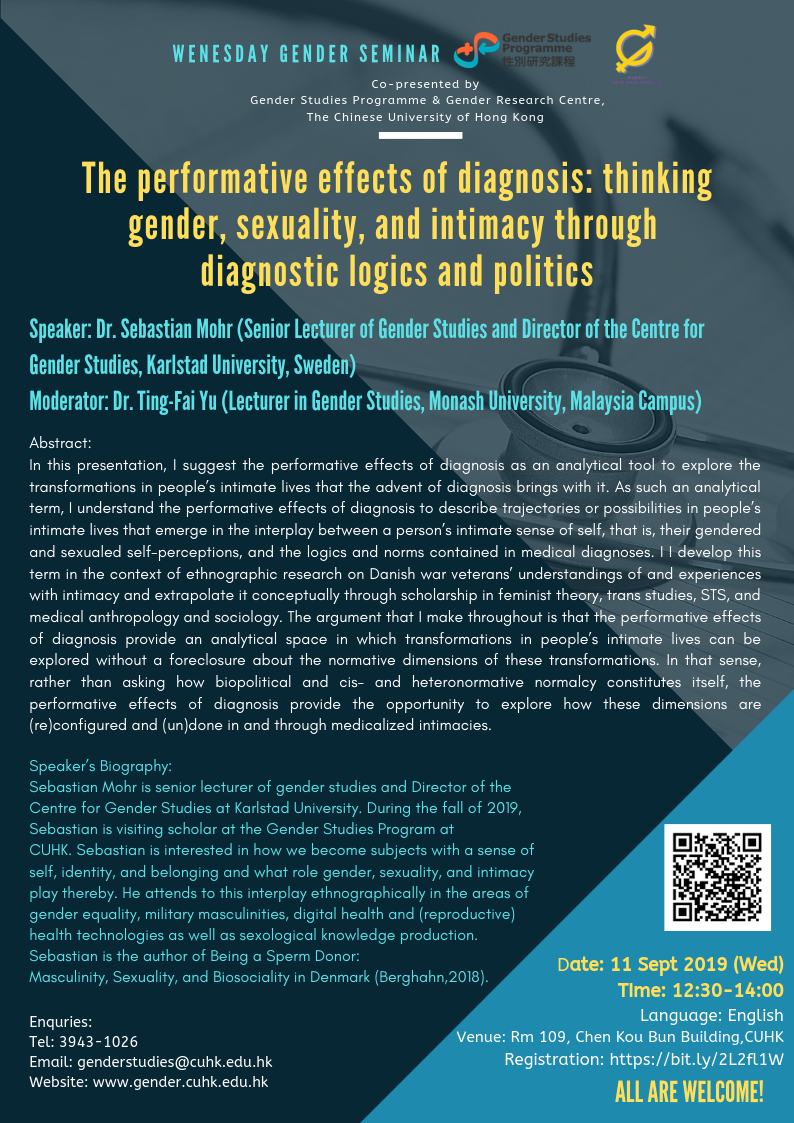 |
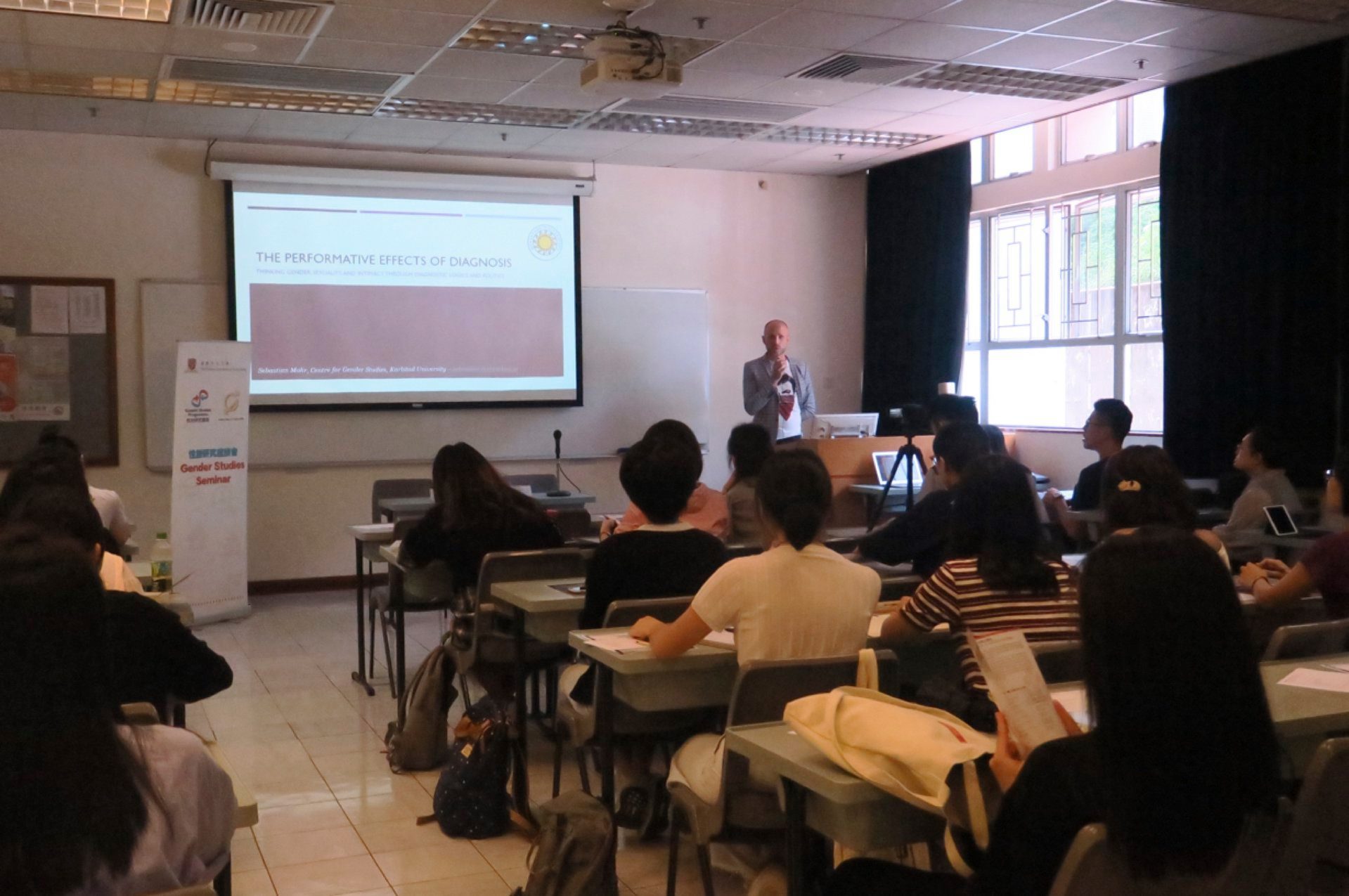 |
在9月11日舉行的「週三性別研究座談會」中,瑞典卡爾斯塔德大學性別研究中心主任、性別研究高級講師塞巴斯蒂安·摩爾博士(Sebastian Mohr)分享了他的研究:The Performative Effects of Medical Diagnosis,從醫學診斷的角度切入,來思考性別、性與親密關係。他同時是香港中文大學性別研究課程2019年秋季的訪問學者。
摩爾博士開展了一項民族志研究,調查丹麥老兵對親密關係的理解與相關經歷。基於此研究成果,摩爾博士探討了如下問題:醫學診斷如何影響人們理解「親密關係中的自我」,此外,從醫學角度重新考量親密關係將會如何幫助人們探索、重塑性別關係和身體政治。
*獲取更多週三性別座談會信息,請點擊這裡
2020年11月18日週三,來自香港理工大學應用社會科學系的助理教授戰洋,在香港中文大學性別研究課程講師曹文傑博士的主持下,開展了名為“小蜜蜂不要停:中國城市地產銷售中的臨時工作、性別化技能和過度流動”的zoom網路講座。戰洋教授運用社會科學的研究方法,分享了她對於這些“小蜜蜂”在工作時遇到、面對的各種不同情形的看法。
隨著中國二、三線城市房地產市場的擴大,許多具有農村背景的中年女工因具備刻苦耐勞等性別化特質進入到房地產銷售行業中,承擔“渠道”工作。與工廠、服務業或家政行業工作不同,渠道工作本質上是流動的。這些臨時工被稱為“小蜜蜂”,她們不斷在城市中向潛在客戶宣傳地產。本講座的重點是這些中年“小蜜蜂”的招募、培訓、流動路徑和工作經驗。
戰洋教授首先從“小蜜蜂”又被稱為“渠道工”、“拓客”等名字開始解釋她們的工作性質,她們在房地產行業的營銷中,以派發傳單、拉客戶等類似于硬性廣告的推廣方式為她們的雇傭者(即房地產方)推薦房產。
隨後,戰洋教授解釋了從女性主義的角度,為何會關注“小蜜蜂”這類女性勞動群體,涉及到工作中的酬勞支付問題、職業道德與倫理問題及一些基本設想,從而引申到“小蜜蜂”群體在工作時遇到的一些女性進退兩難的困境。戰洋教授曾在重慶進行過實地考察與研究,因為重慶具備了一定的發展戰略,並且出現了以房地產為中心的城市擴張情況。在這個研究中,她訪談了兩位房地產發展商、兩位“拓客”部門的經理和三十六位“小蜜蜂”,並分析了近年來紙媒、自營商以及跨媒介在拓客發展上的推動作用;同時,她也關注到拓客們出現的原因與房地產市場的競爭手段息息相關。
除此之外,戰洋教授在關於“小蜜蜂”們的人員組成中,探討了她們的招聘問題,年齡分層問題和城市/農村戶口情況等。在經過招募和培訓後,“小蜜蜂”們會以“兵團戰”的方式從電銷、地推、守盤和團購等路徑開展工作。她非常關注重慶“小蜜蜂”中的中年婦女們,在工作中所面對的性別化技巧與經驗,與她們的活動區域地圖相結合,形成“第一密集區”、“第二密集區”和“輻射區域”。地圖中的這些圈層和點位(加油站、商超等),非常形象地體現了她們工作的圖景與大概流動路徑,這種流動性也具有一定的反身意義。
最後,戰洋教授分析了在市場競爭日益官僚化的情形下,“小蜜蜂”們的行業壓力、長時間工作負擔以及人事變動(解雇率、辭職率)等數據。並且,在流行病疫情改變了社會運轉模式的環境中,“小蜜蜂”們不僅工作受到一定的影響,還承受著來自社會、家庭等不同地方的負面情緒。戰洋教授希望在當代中國,如何理解“小蜜蜂”這種“非必要”工作的存在,是十分需要成為人們去關注和研究的議題。
撰寫者:香港中文大學性別研究課程博士生彭依伊 Yiyi Peng



